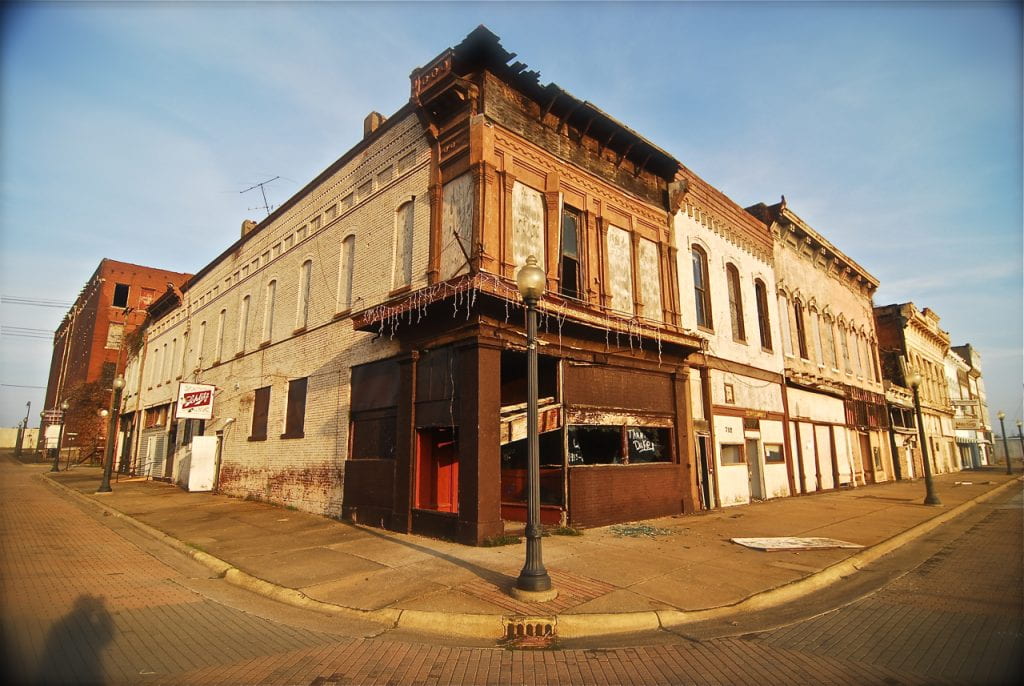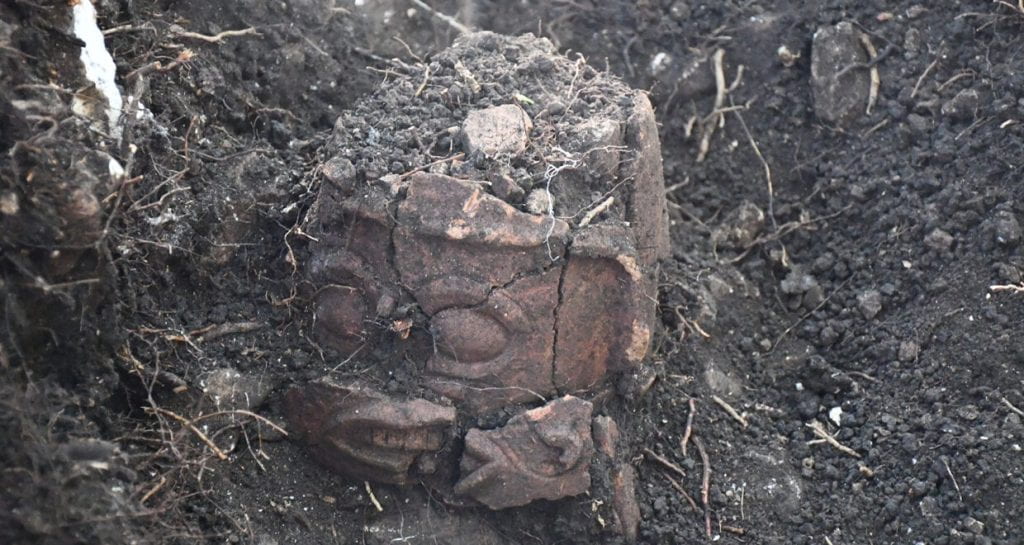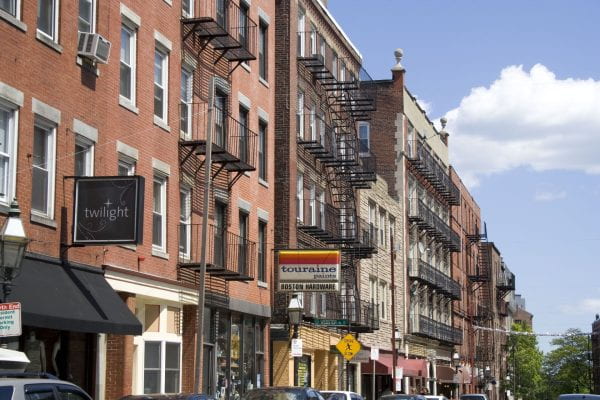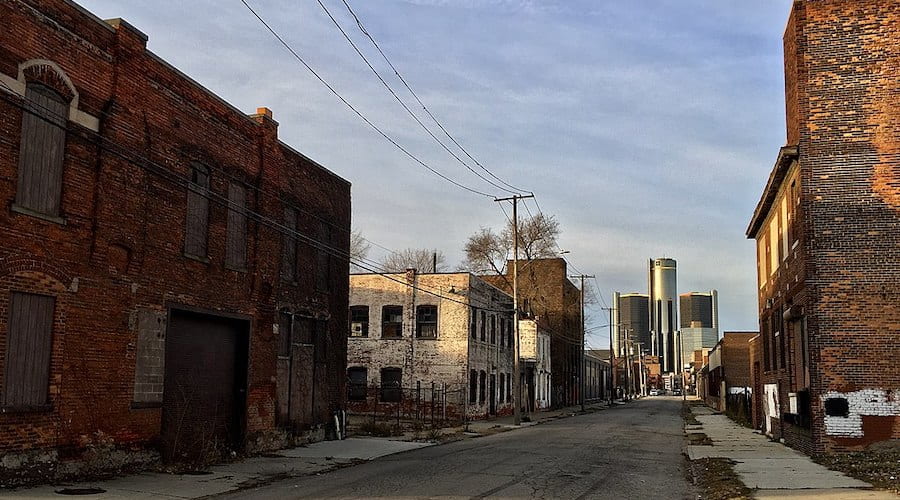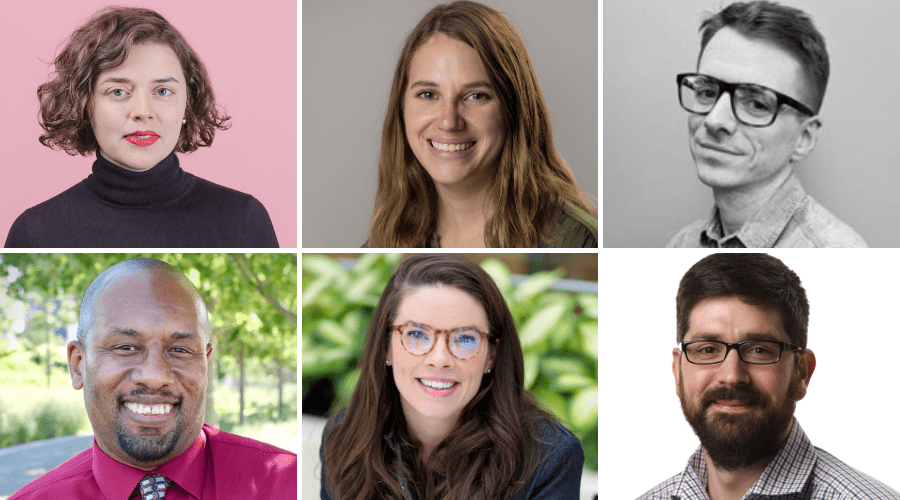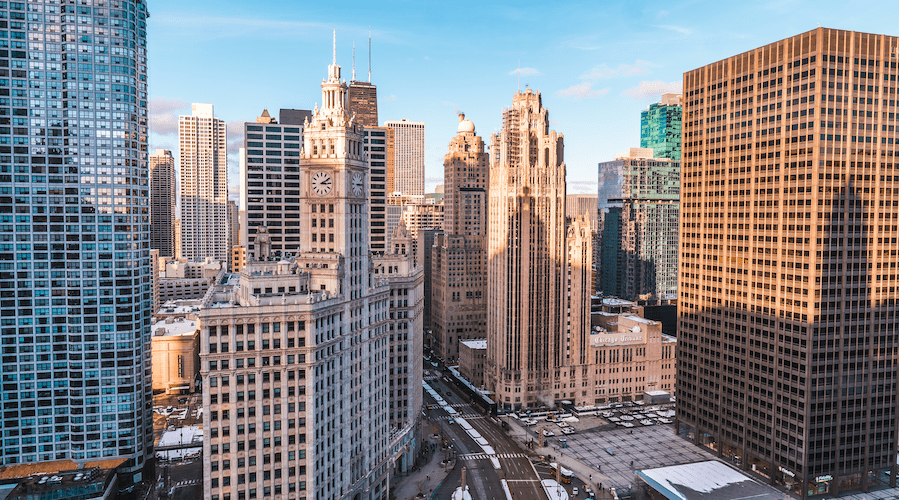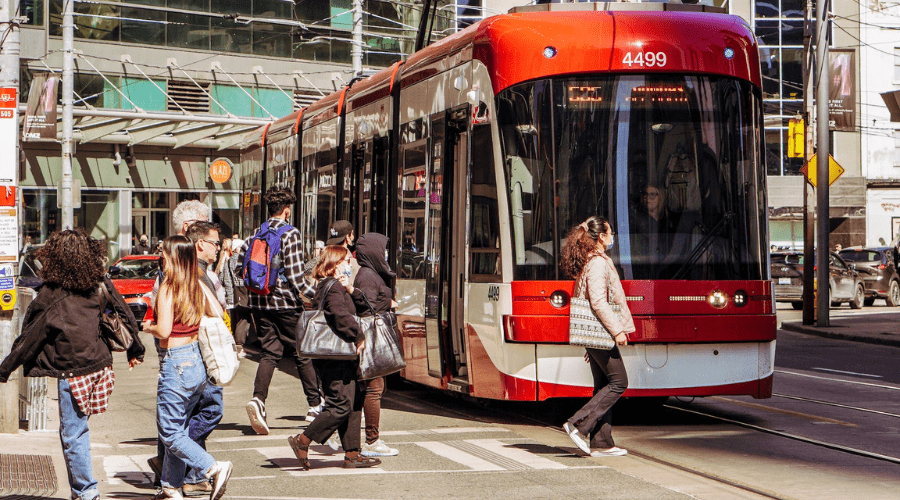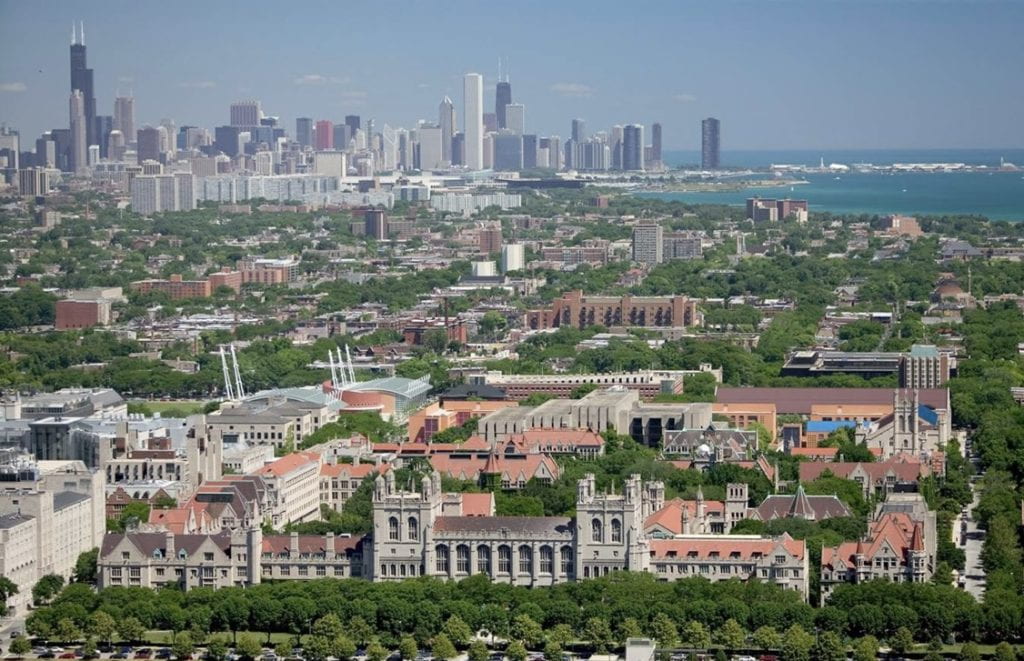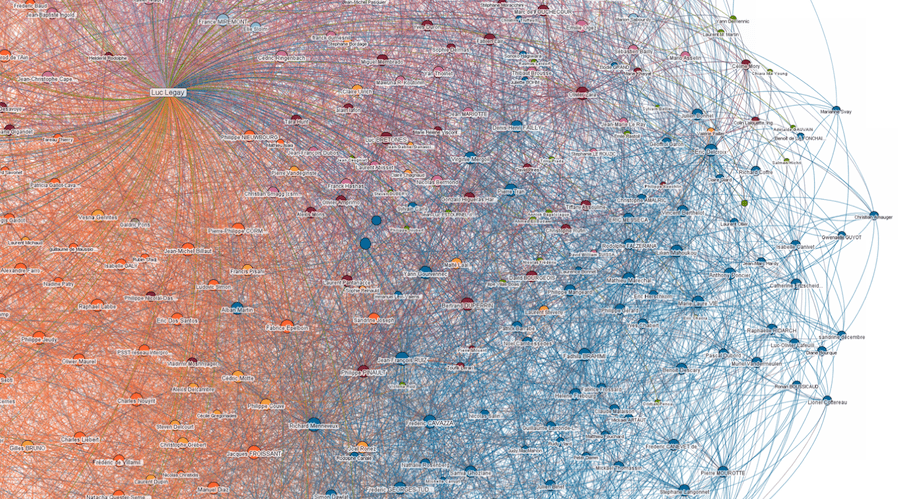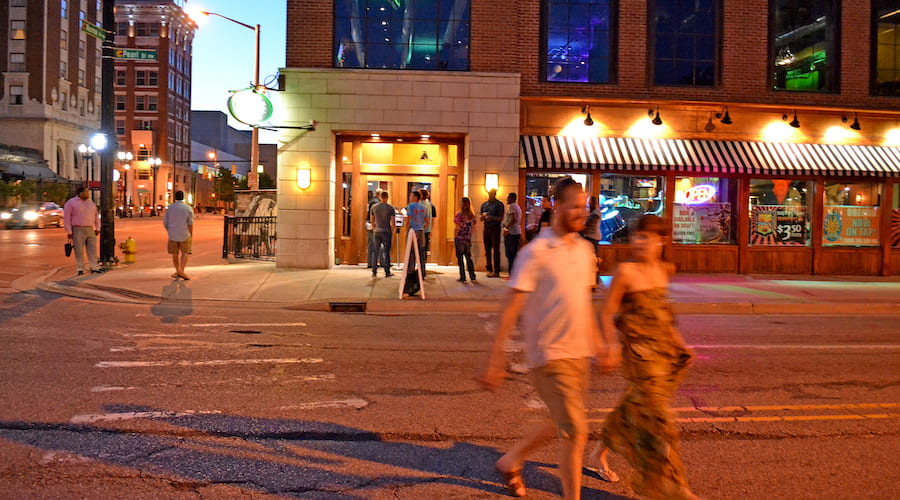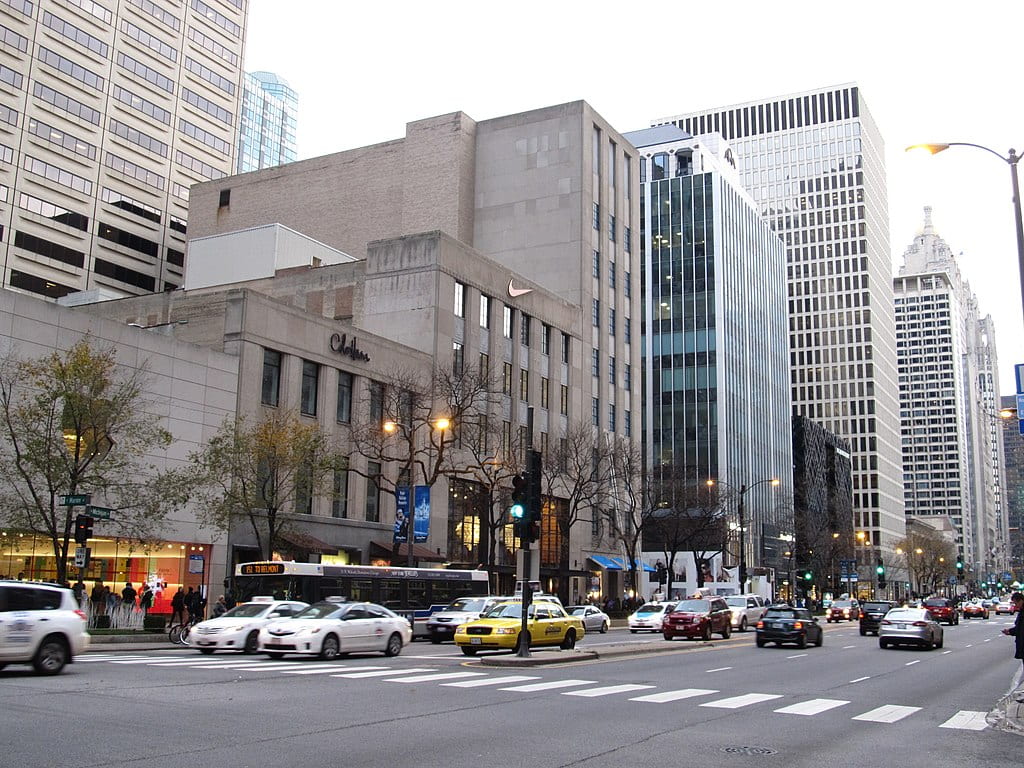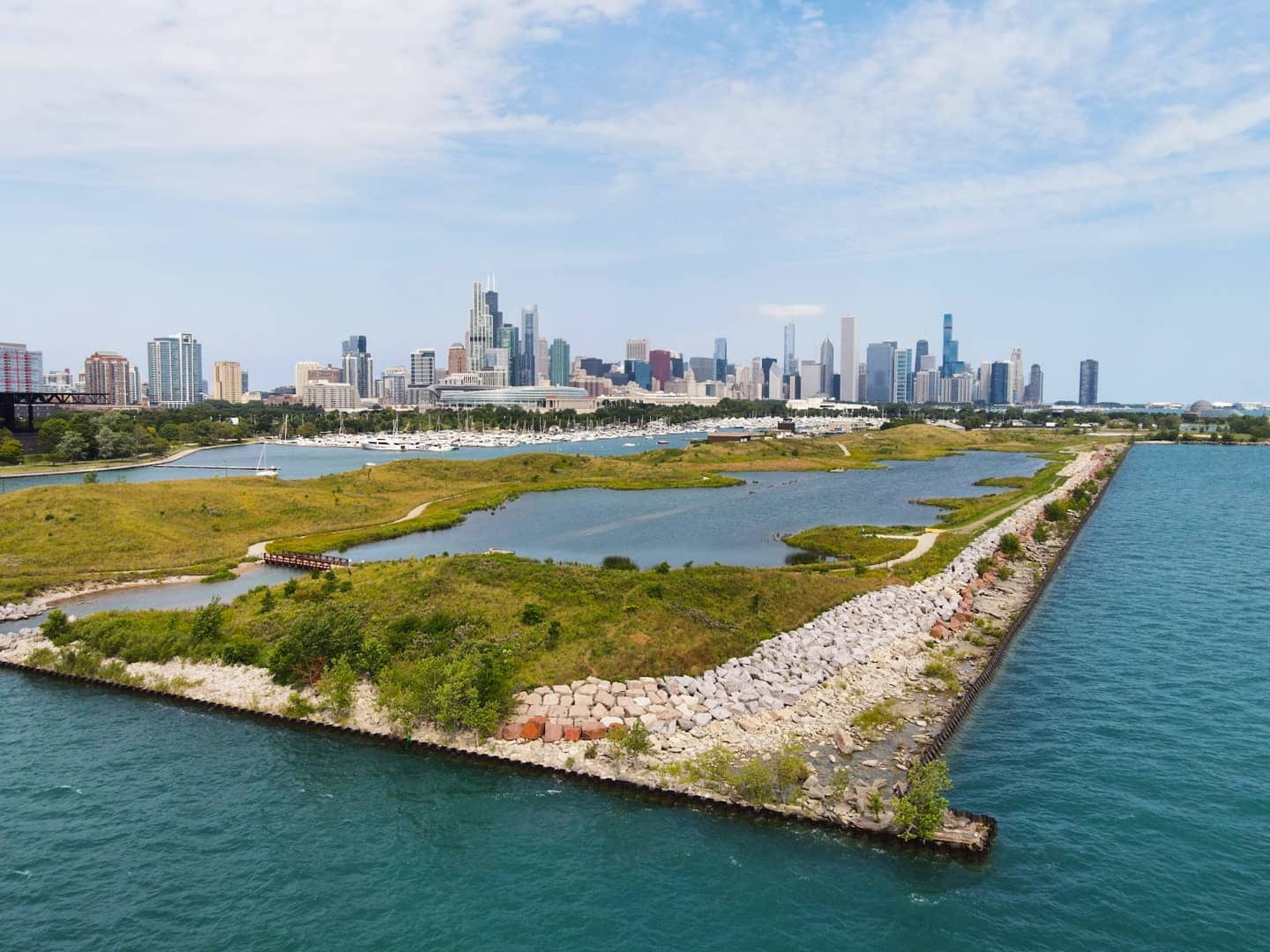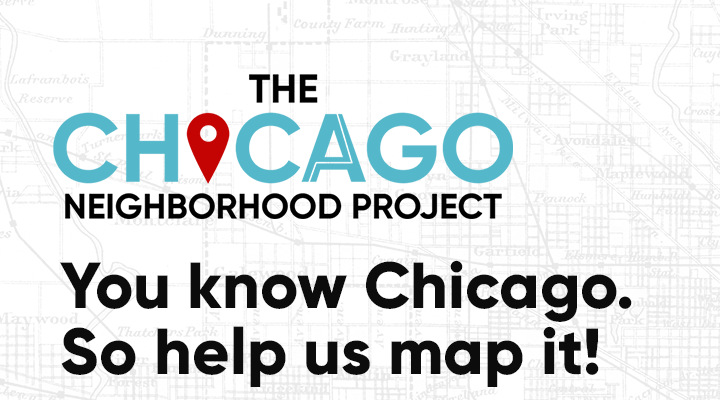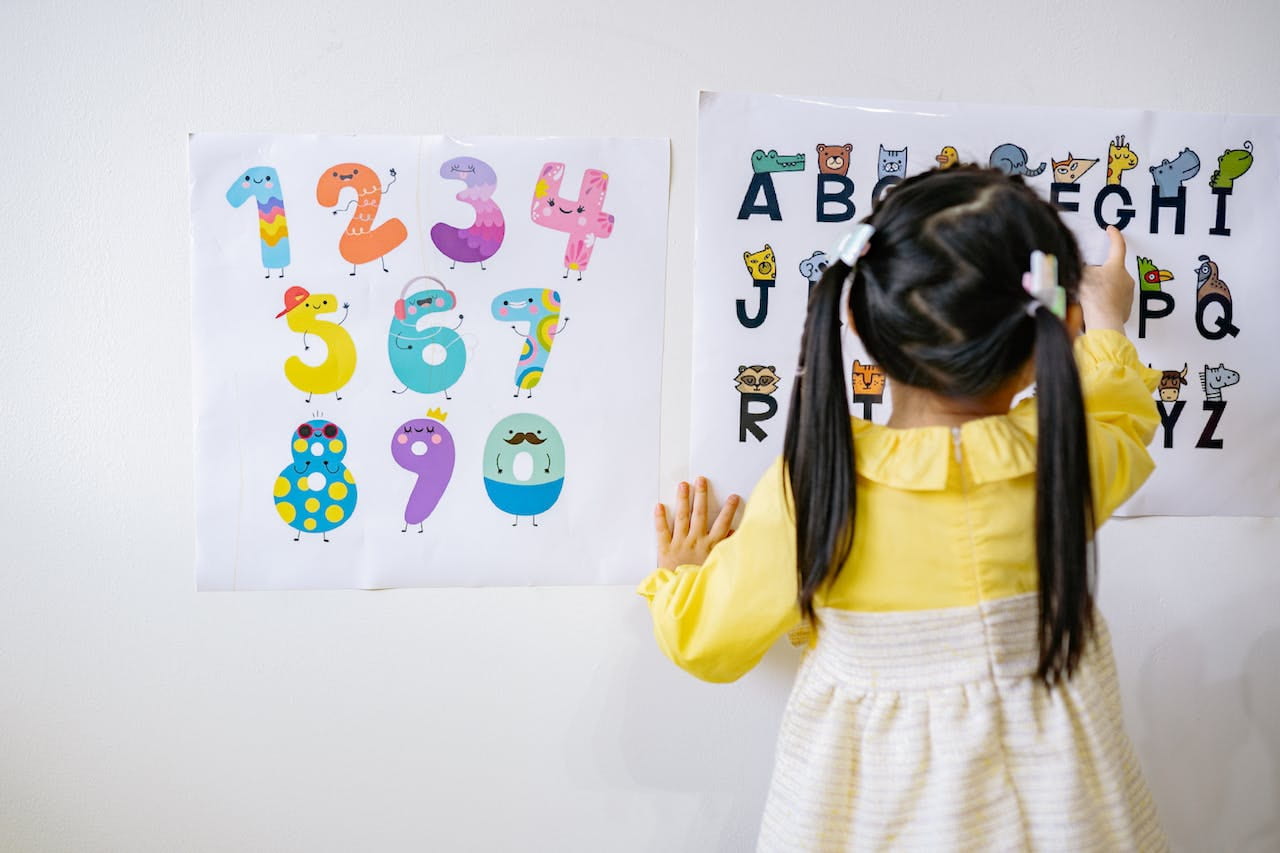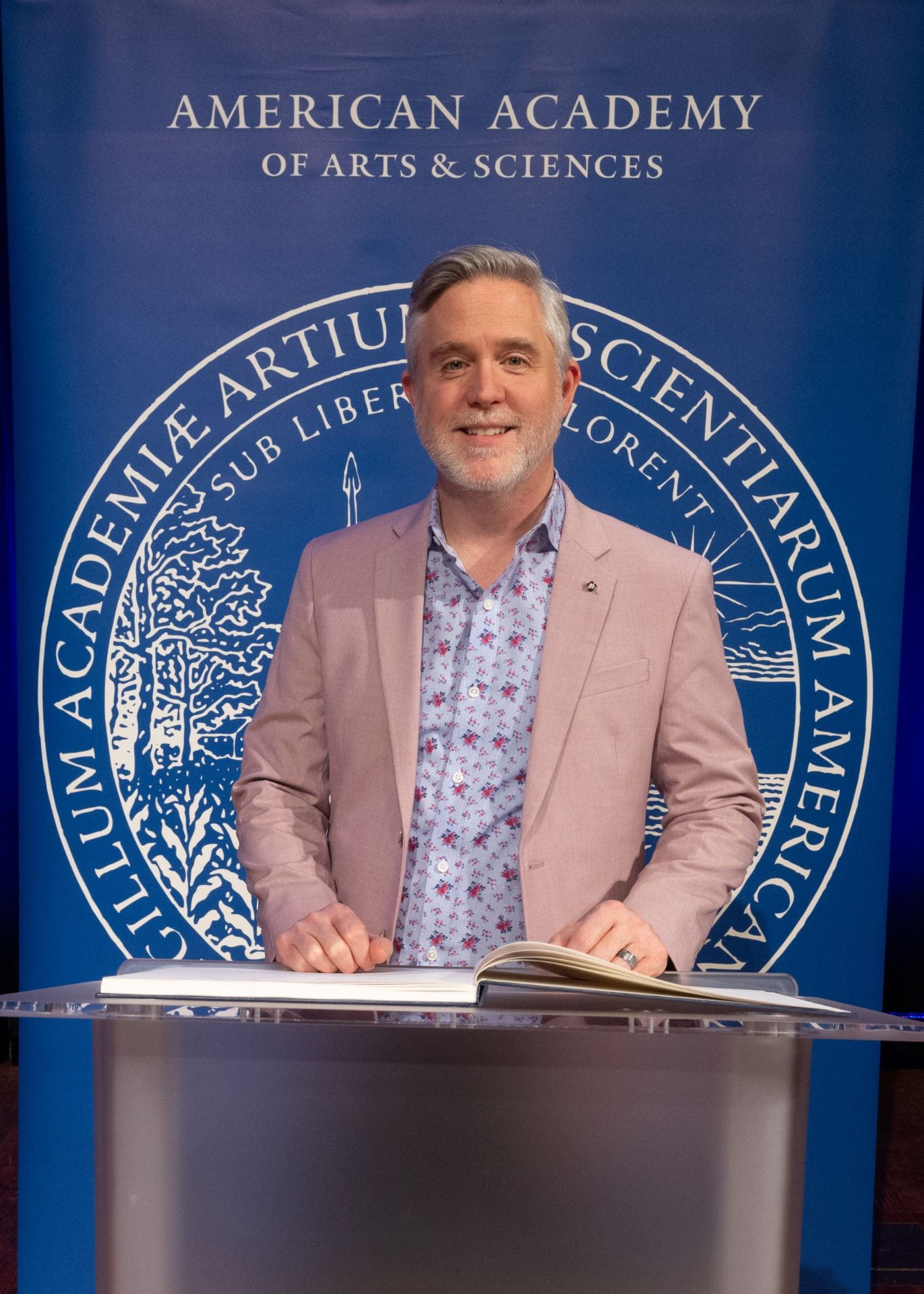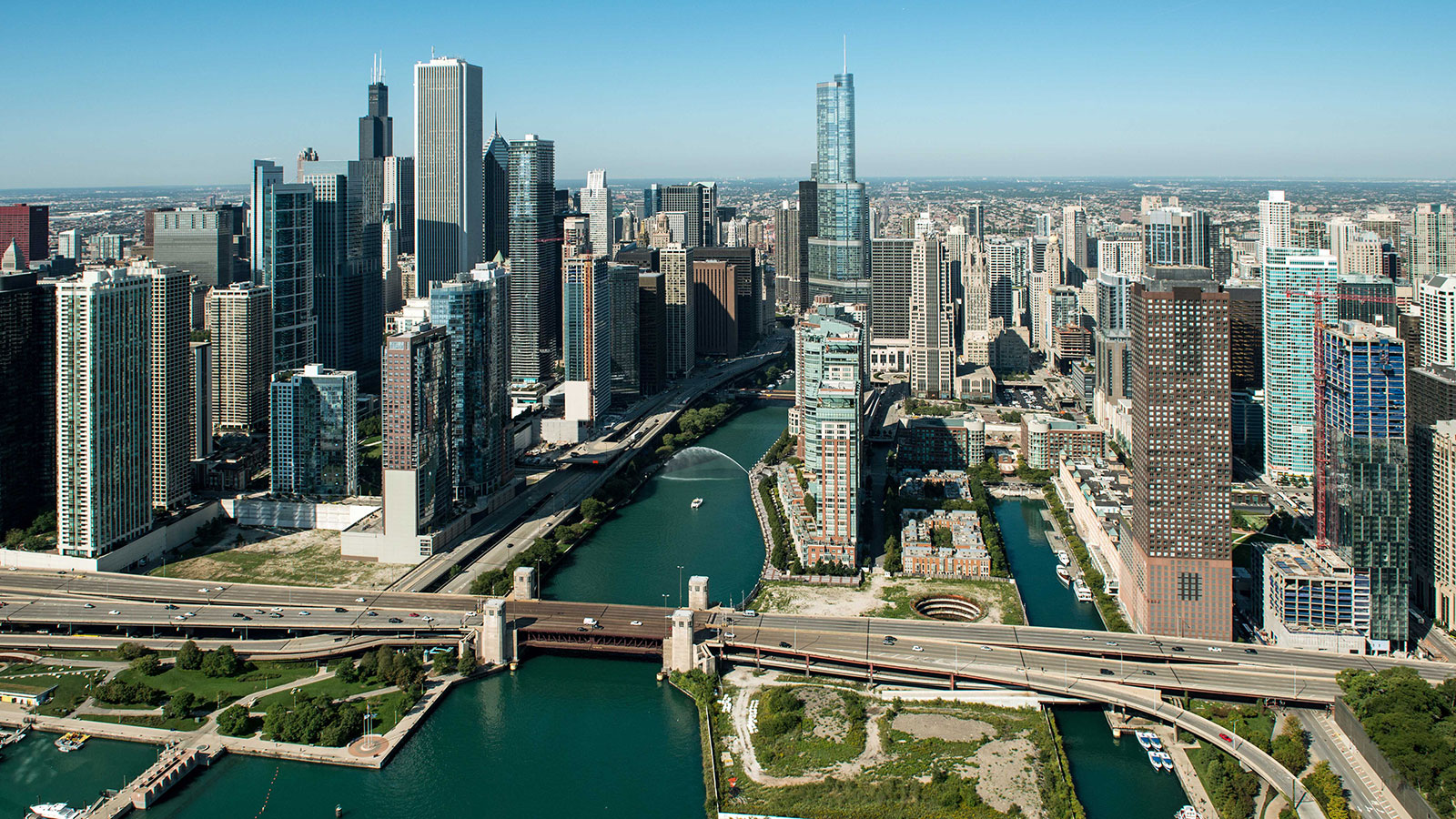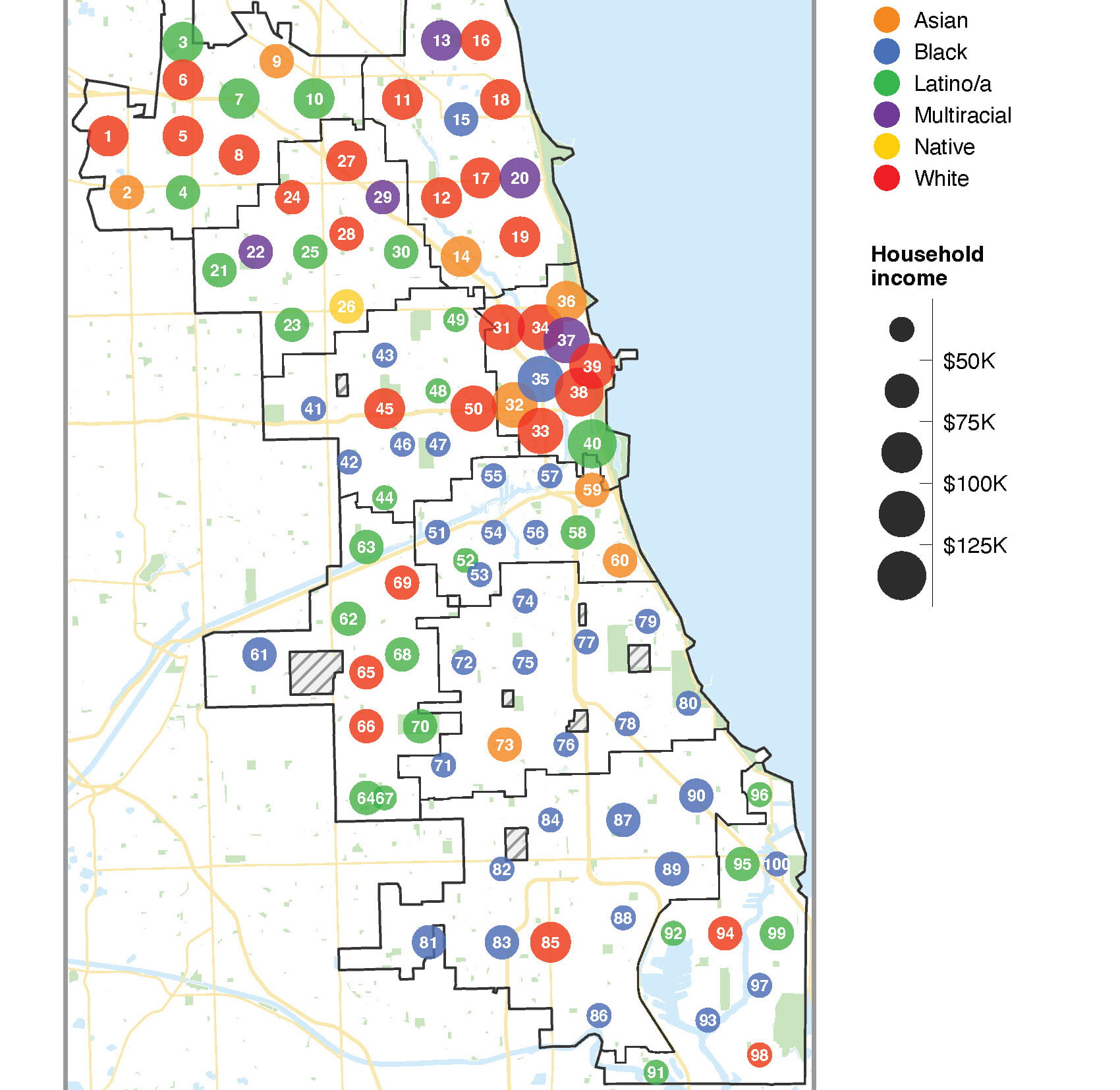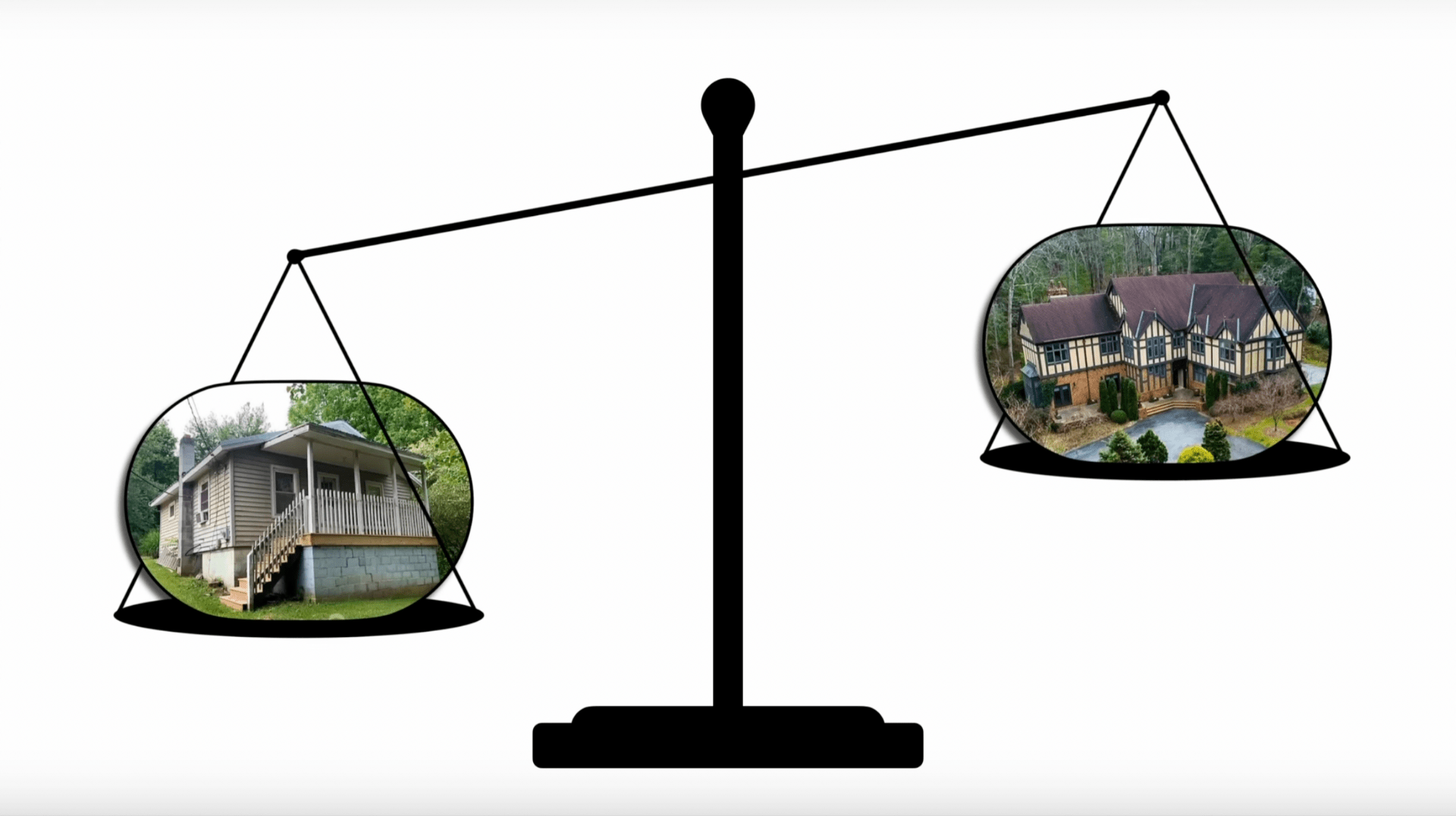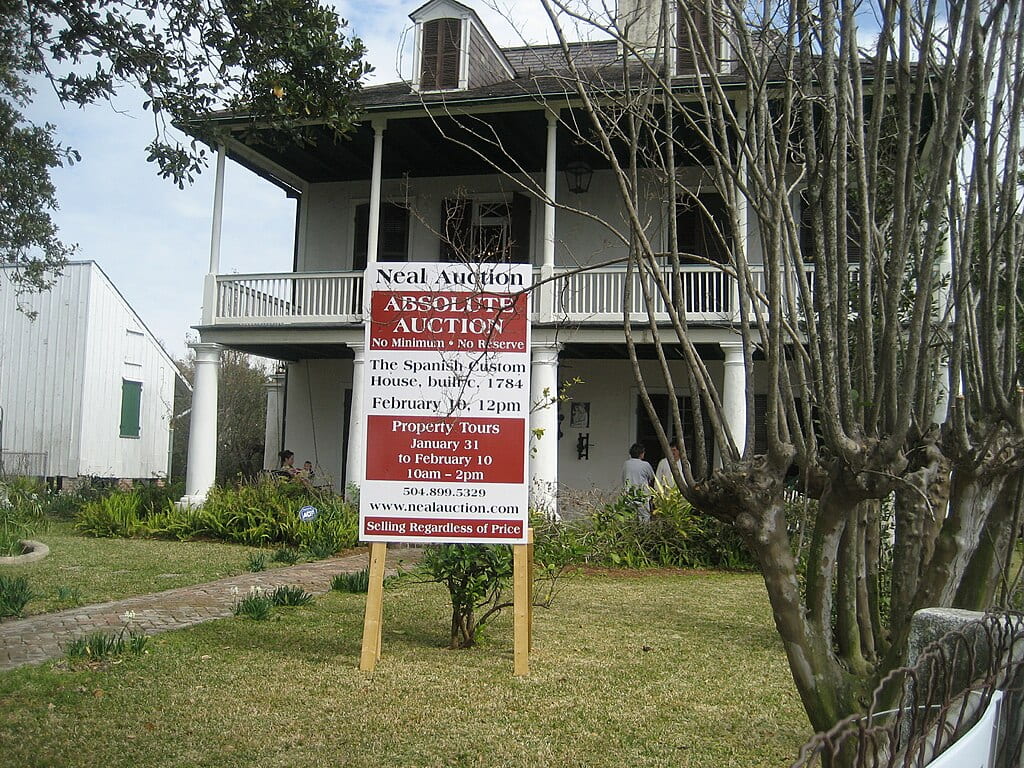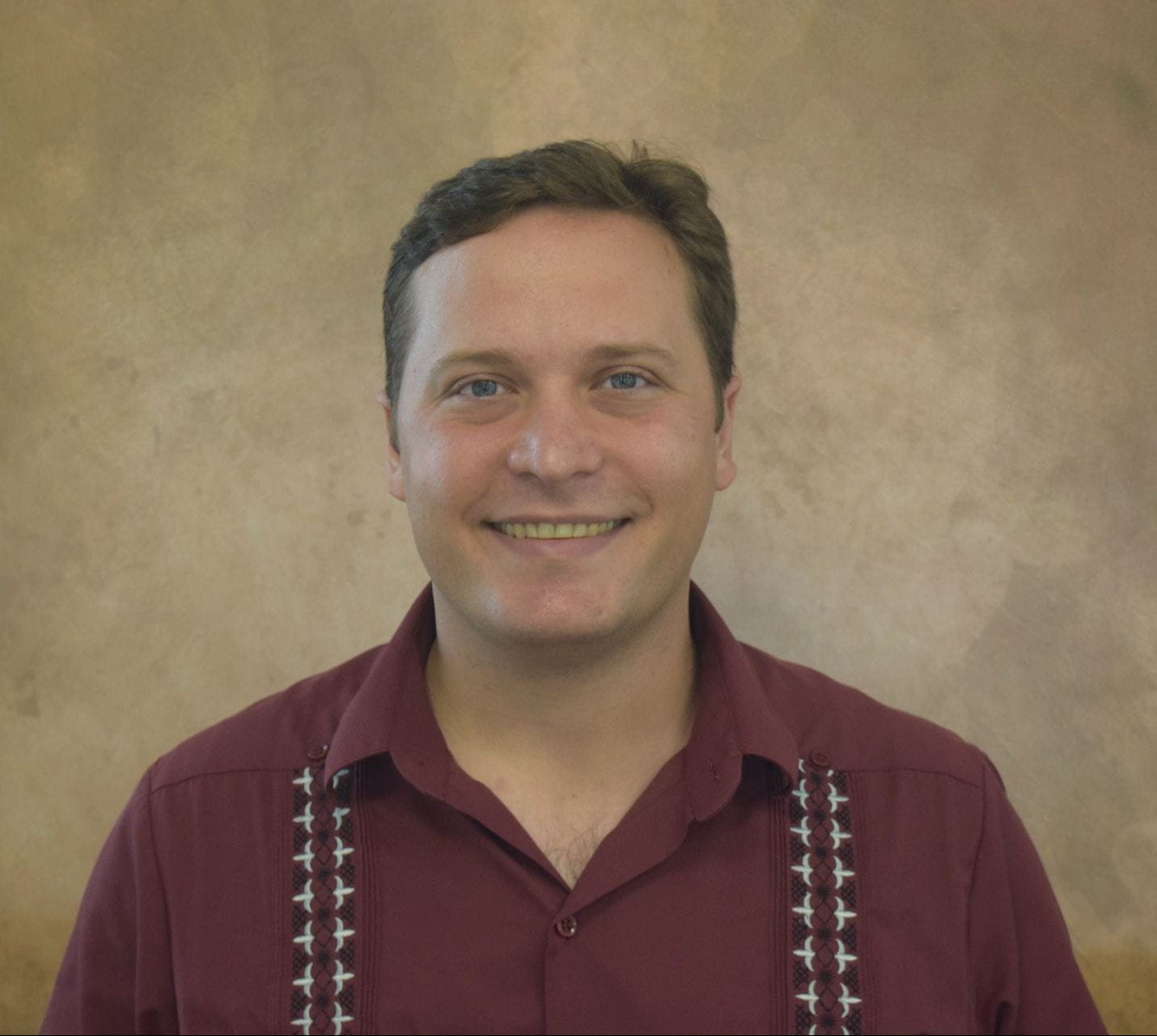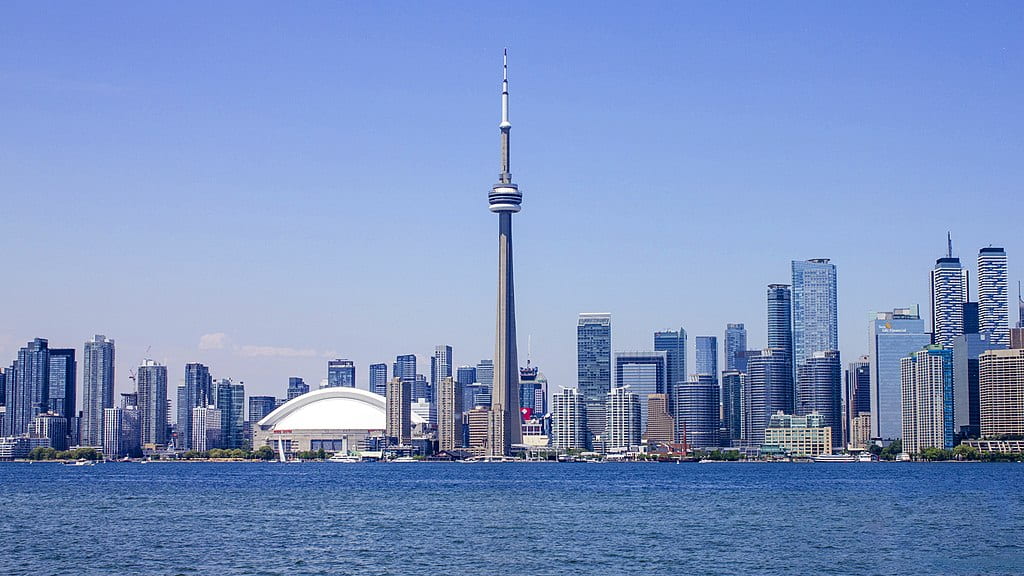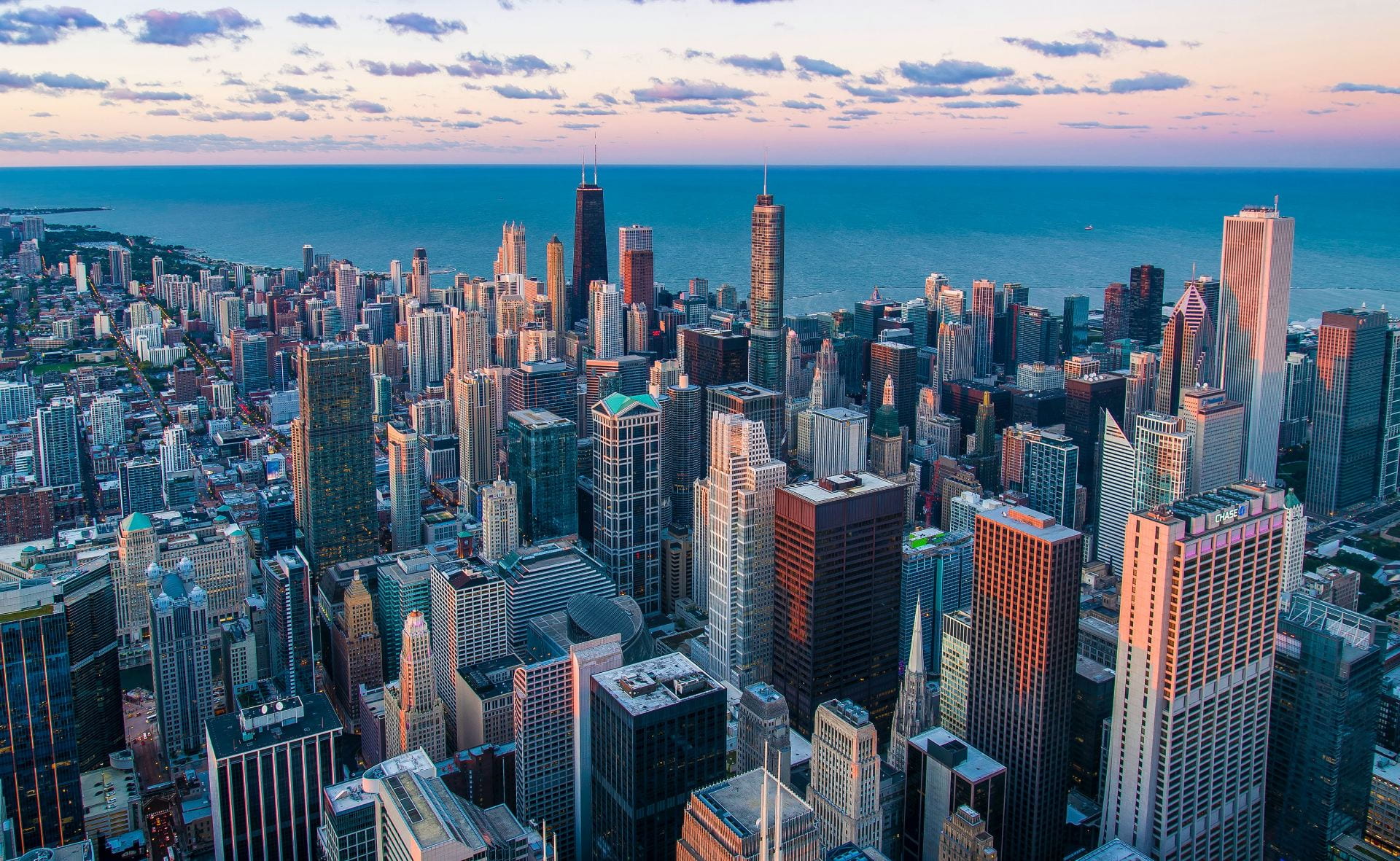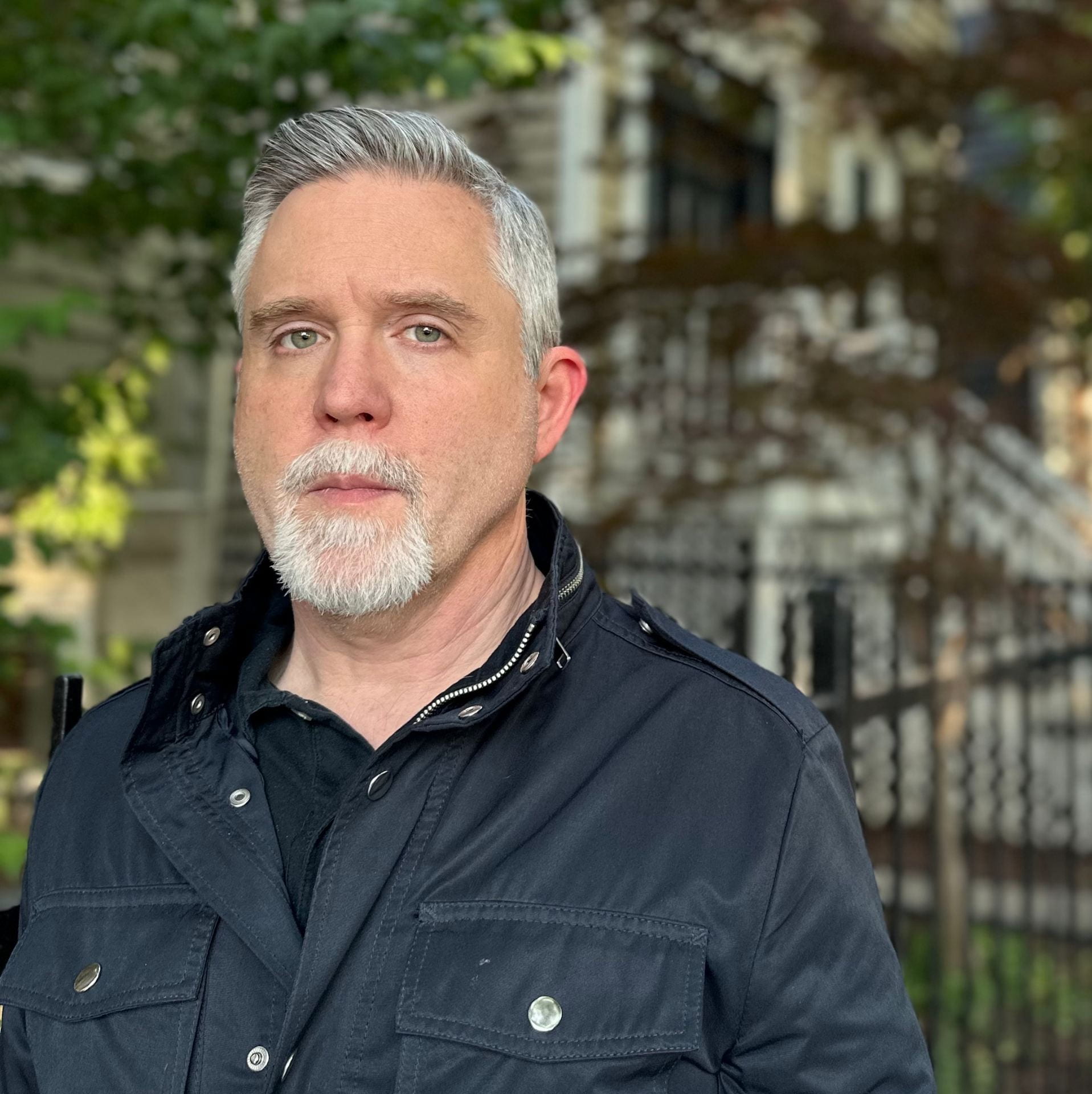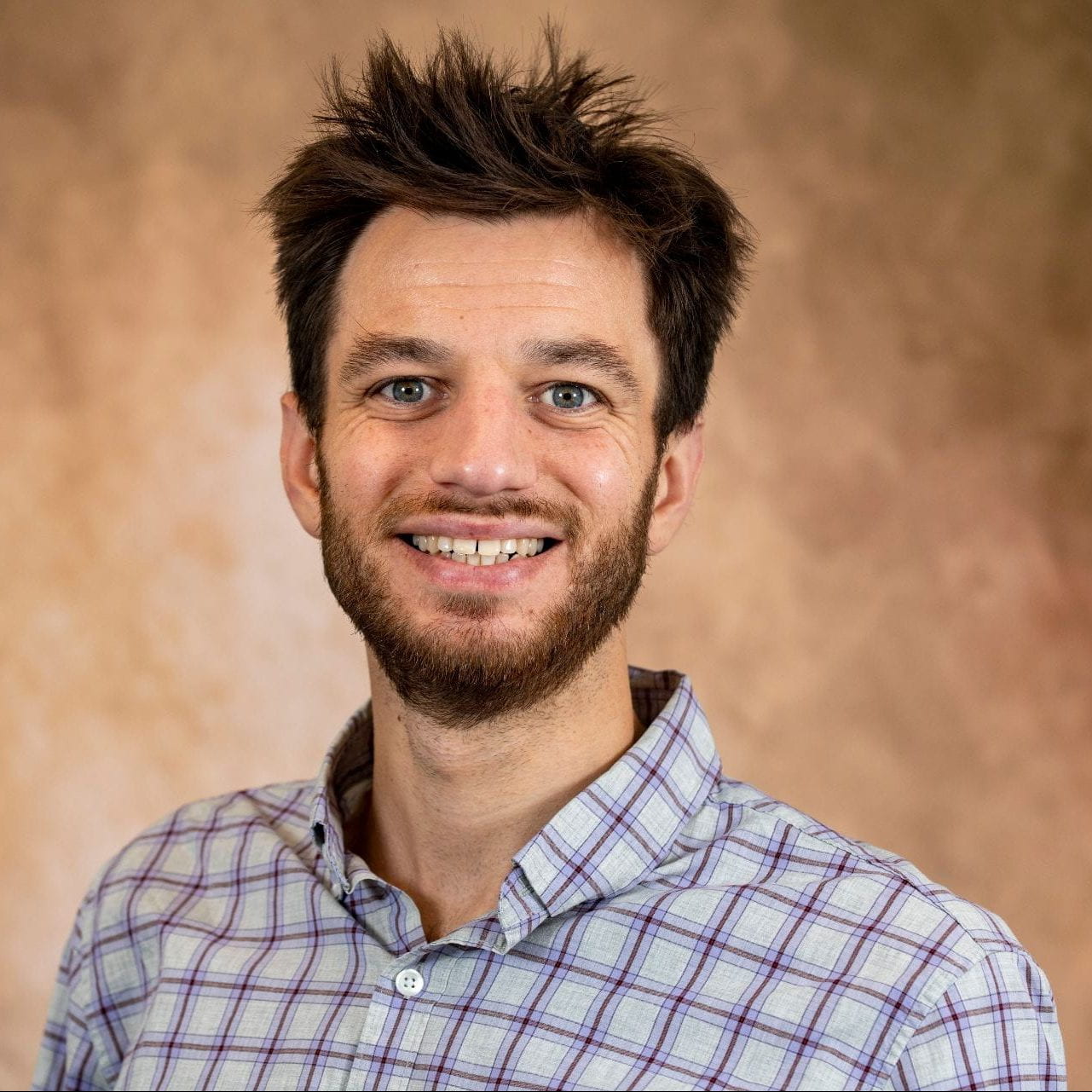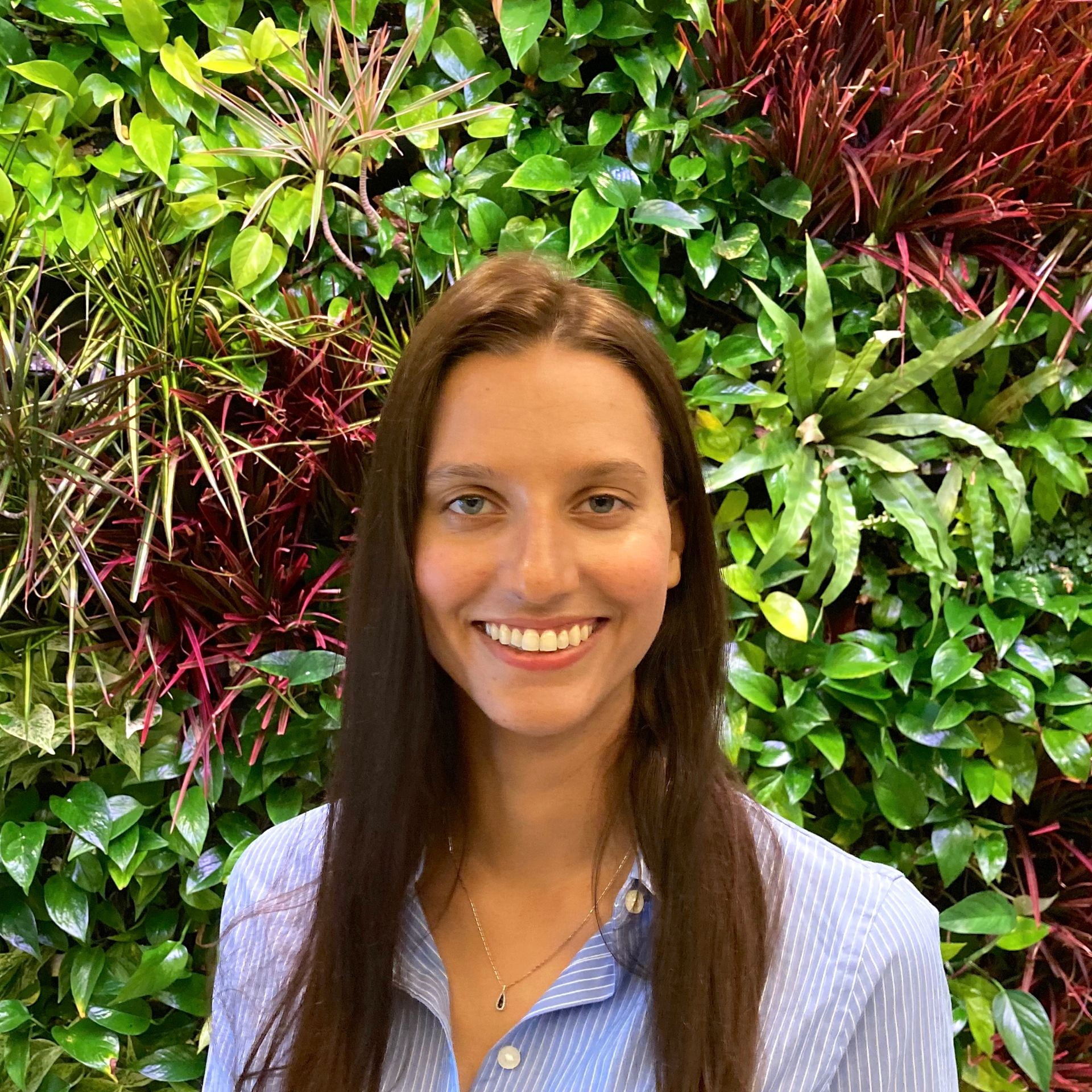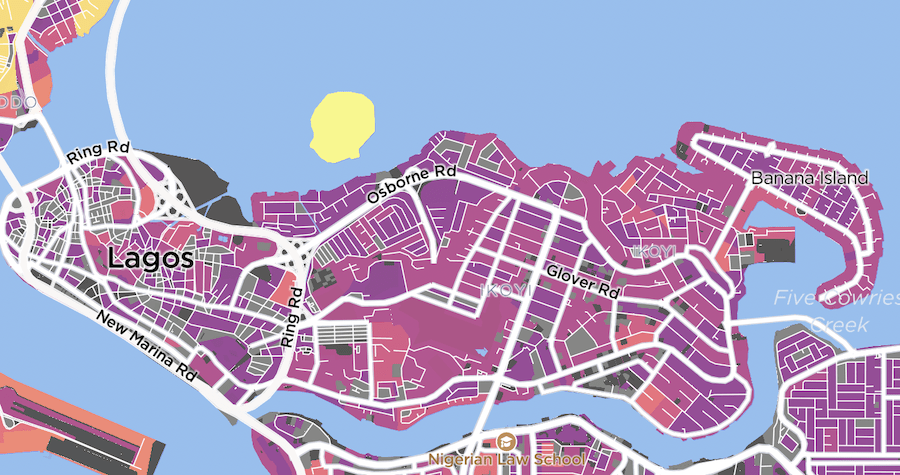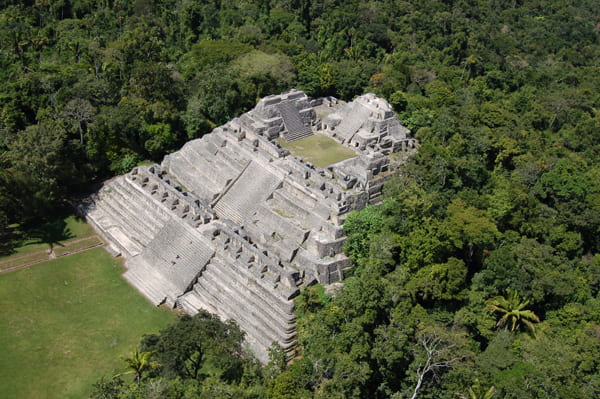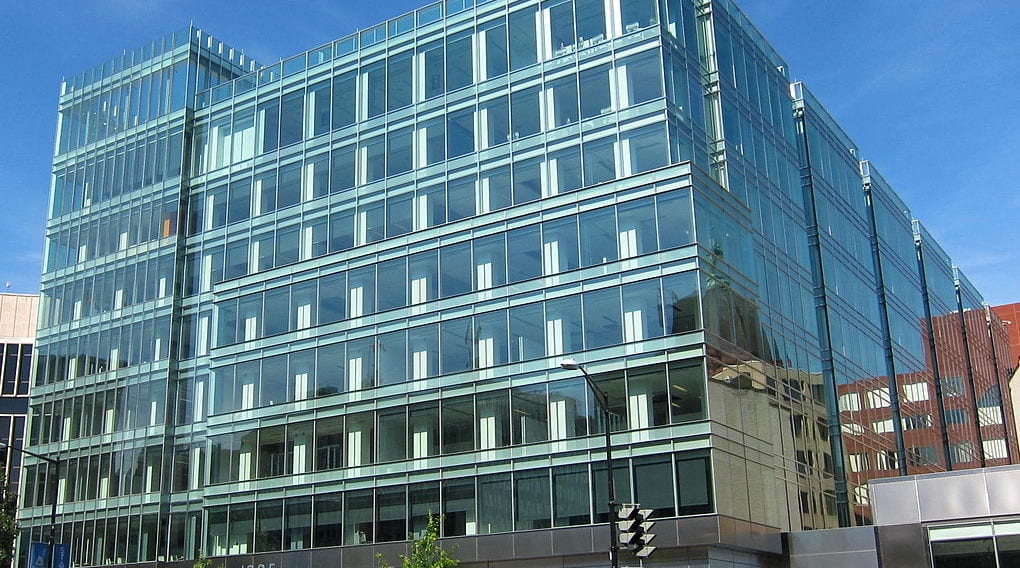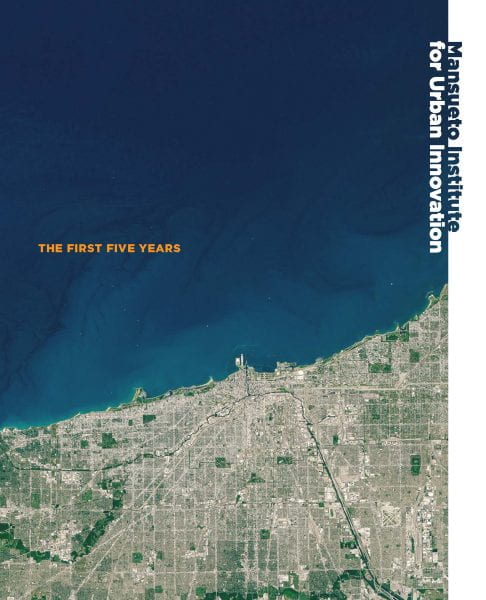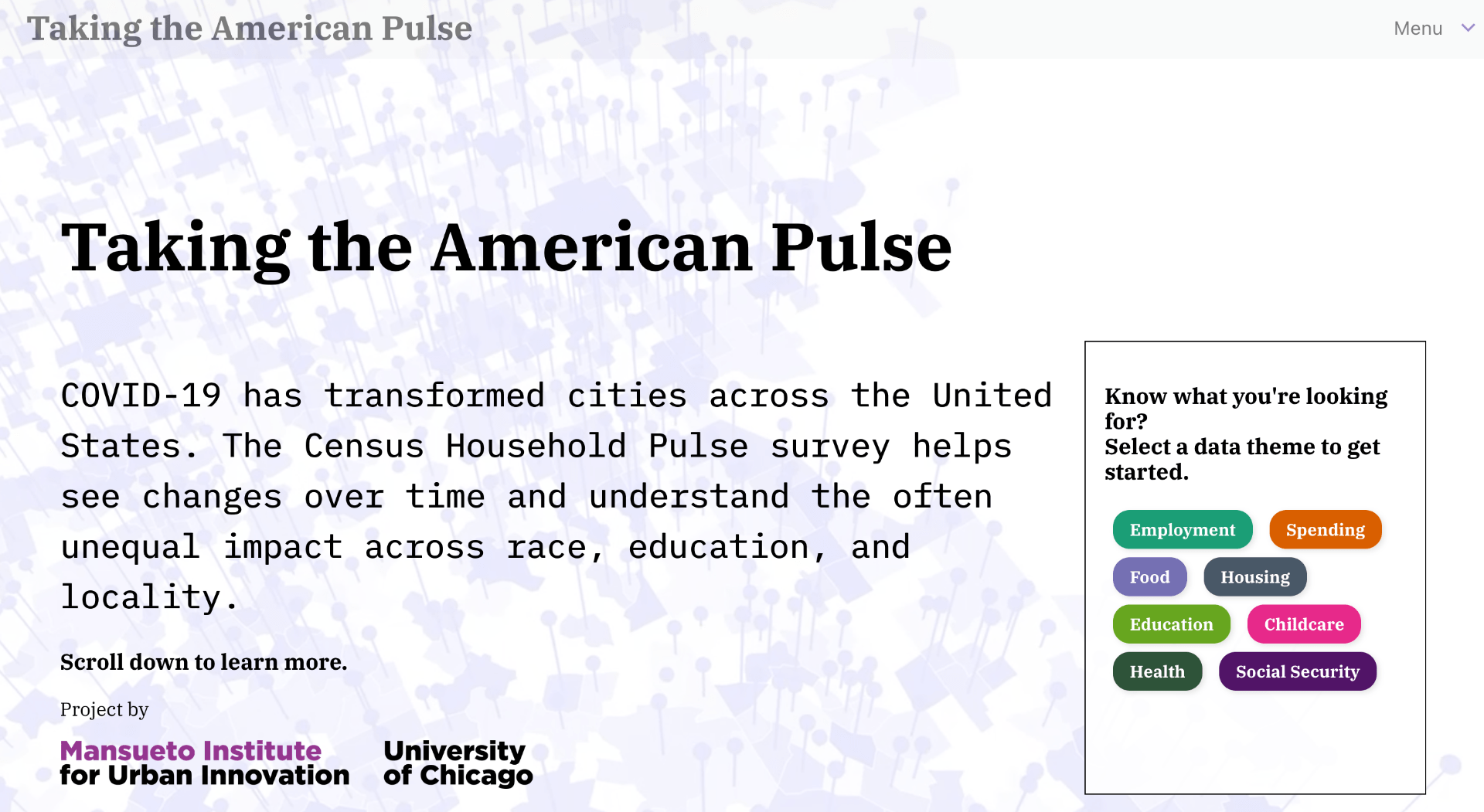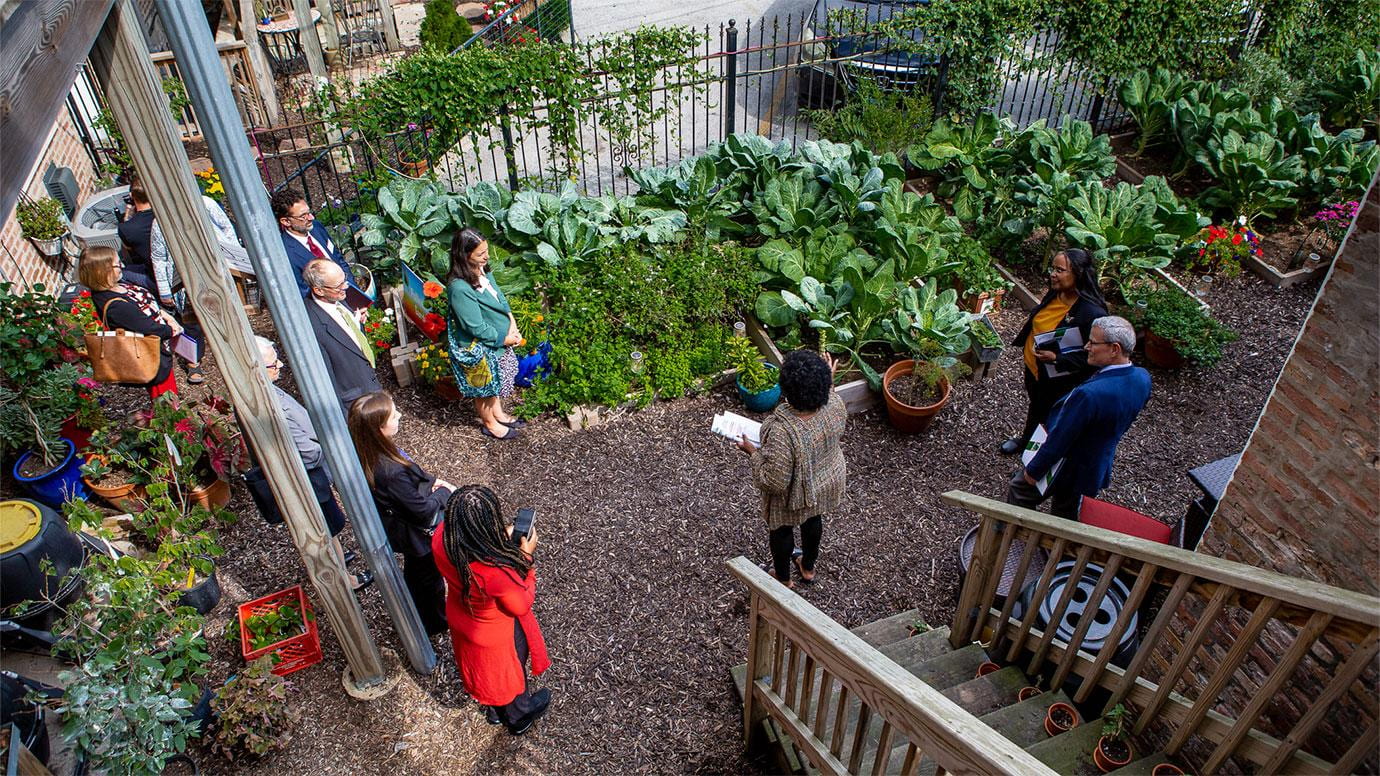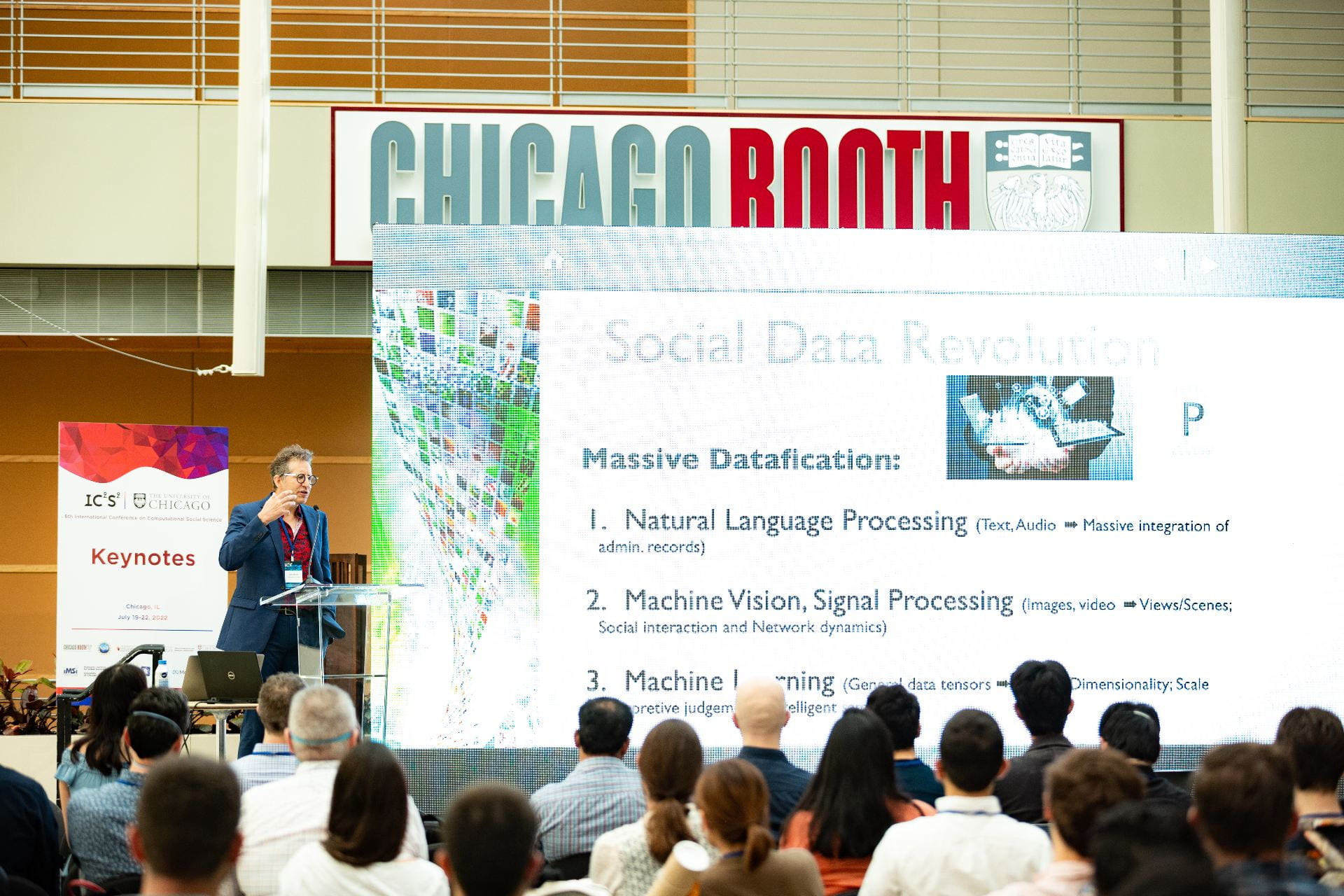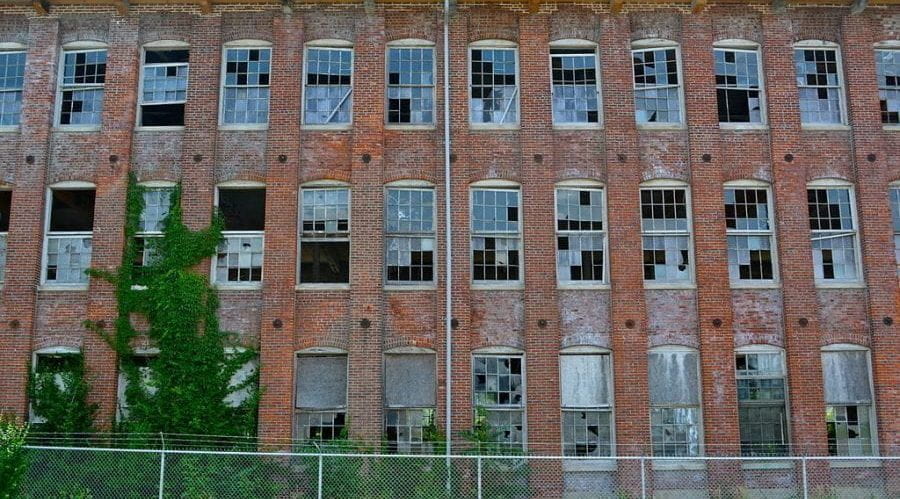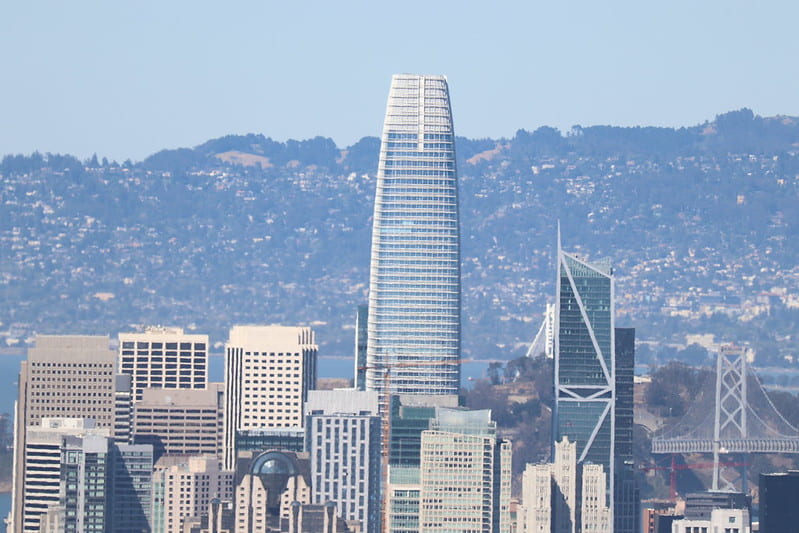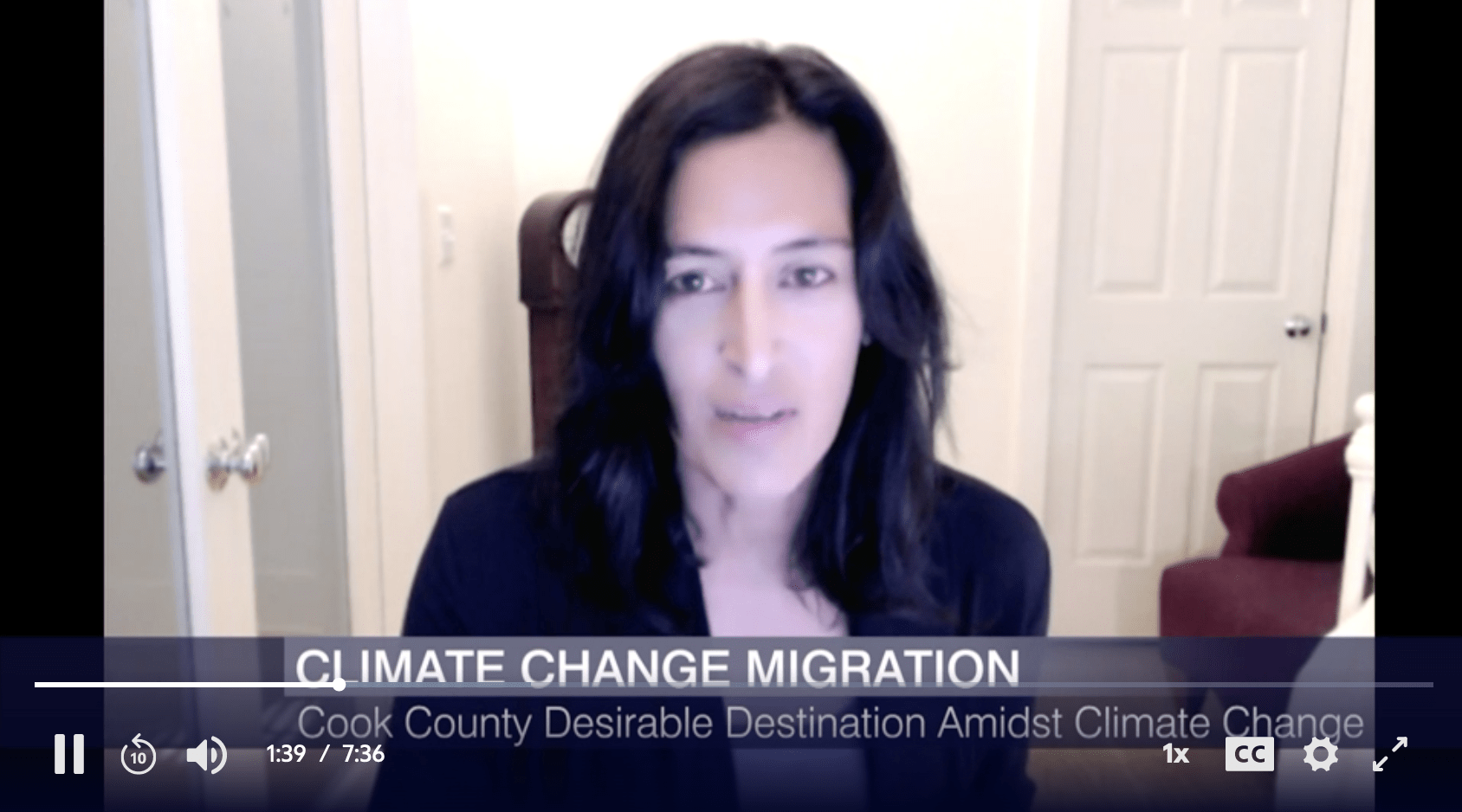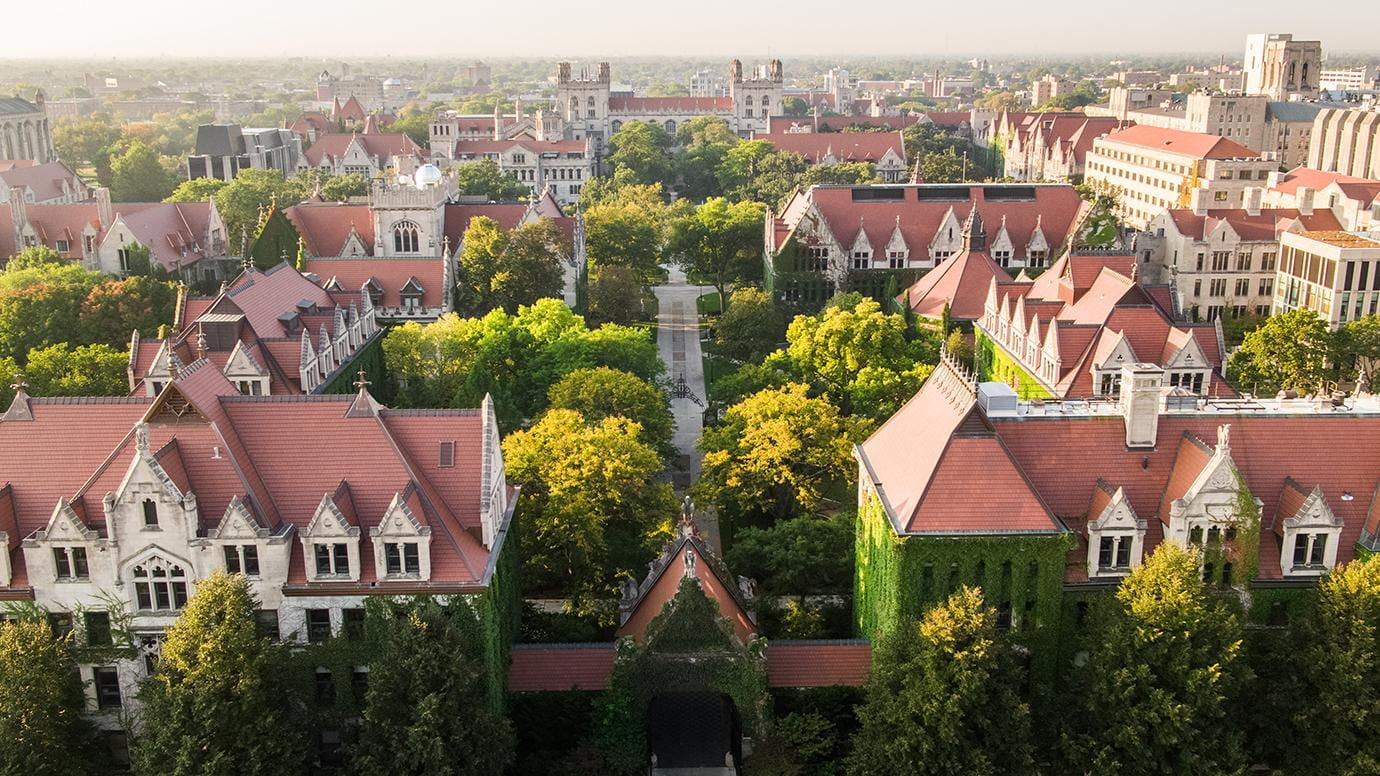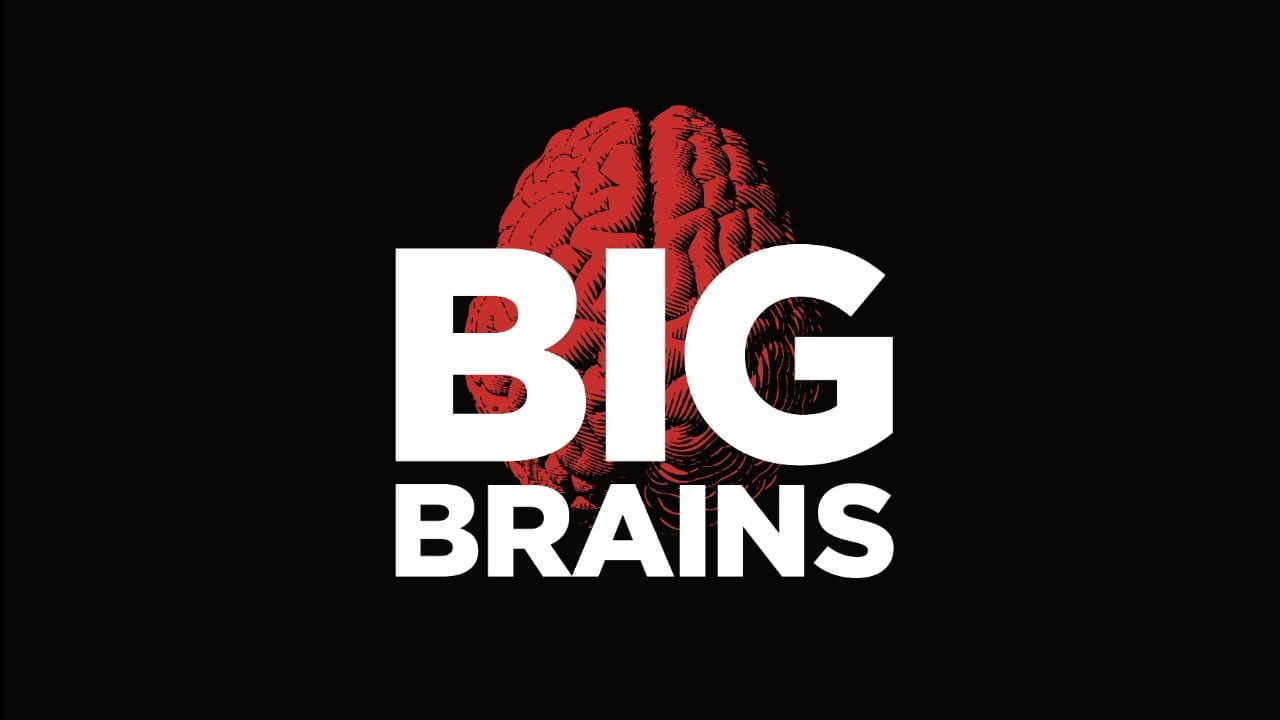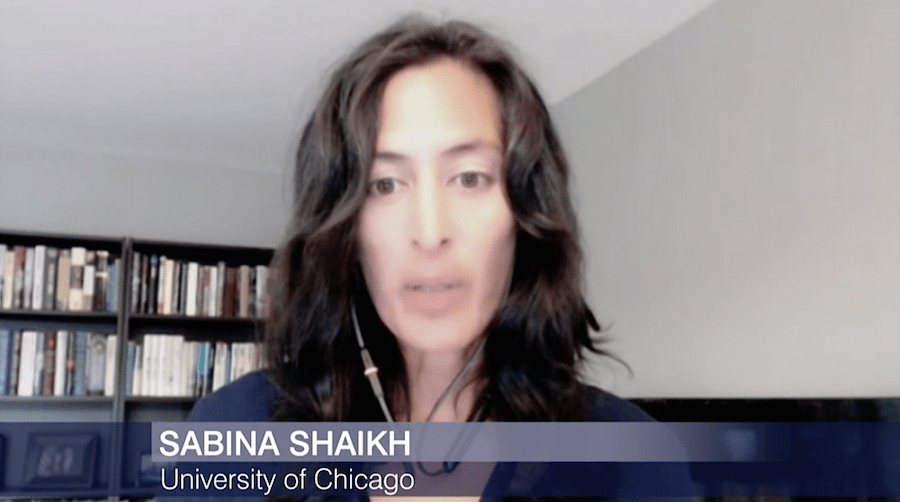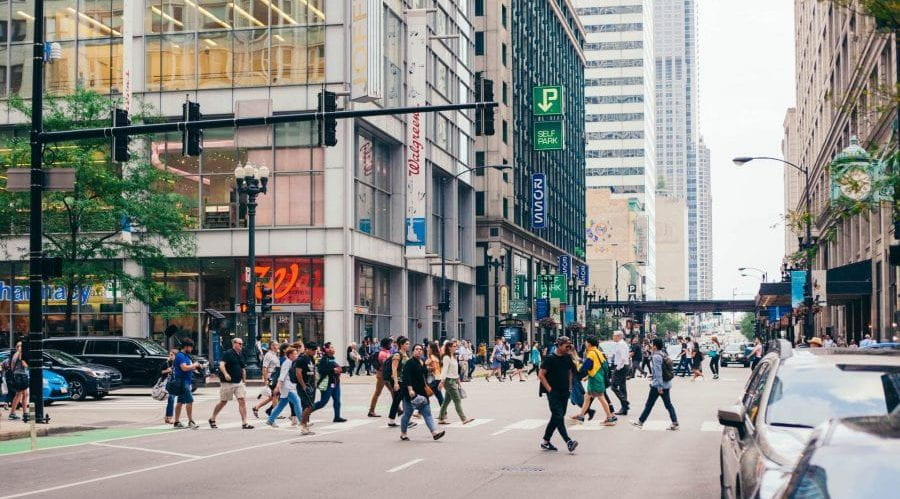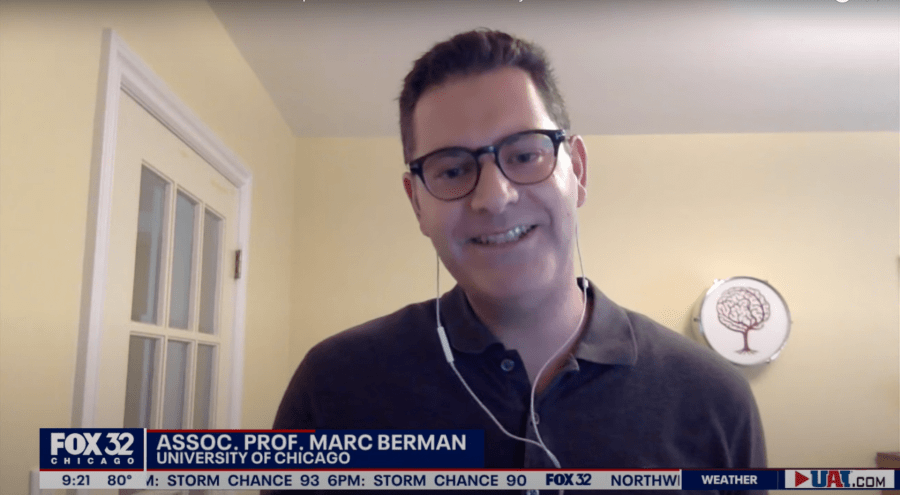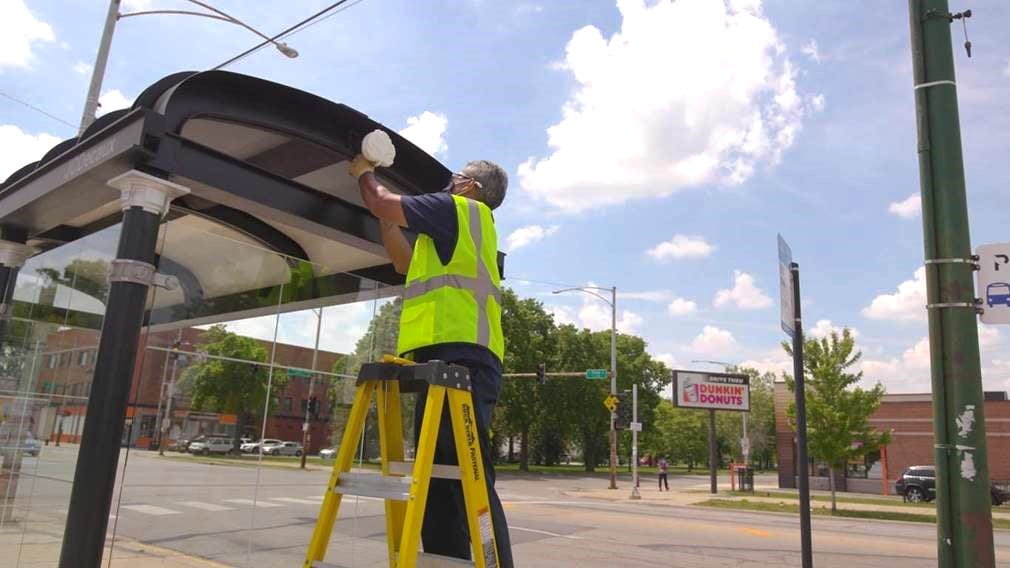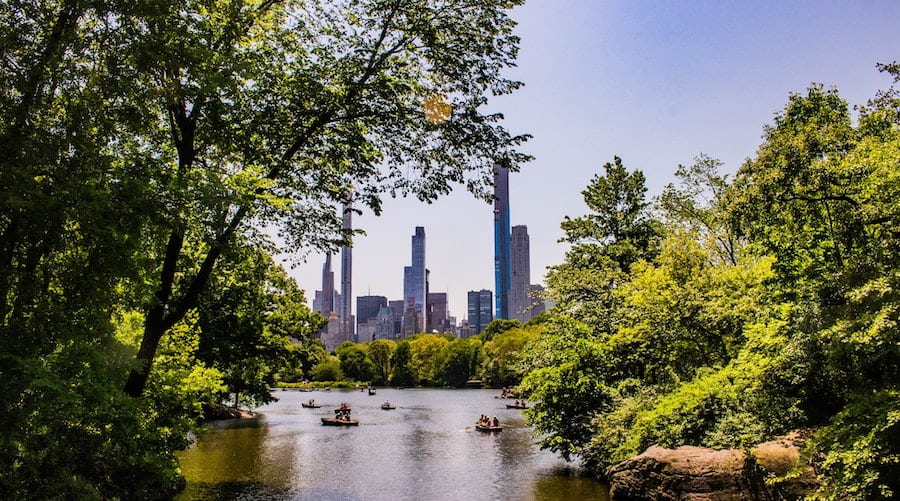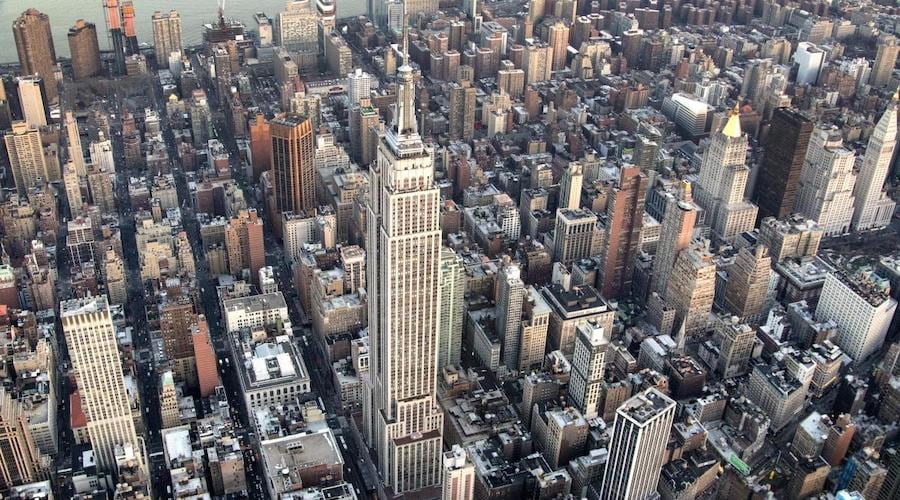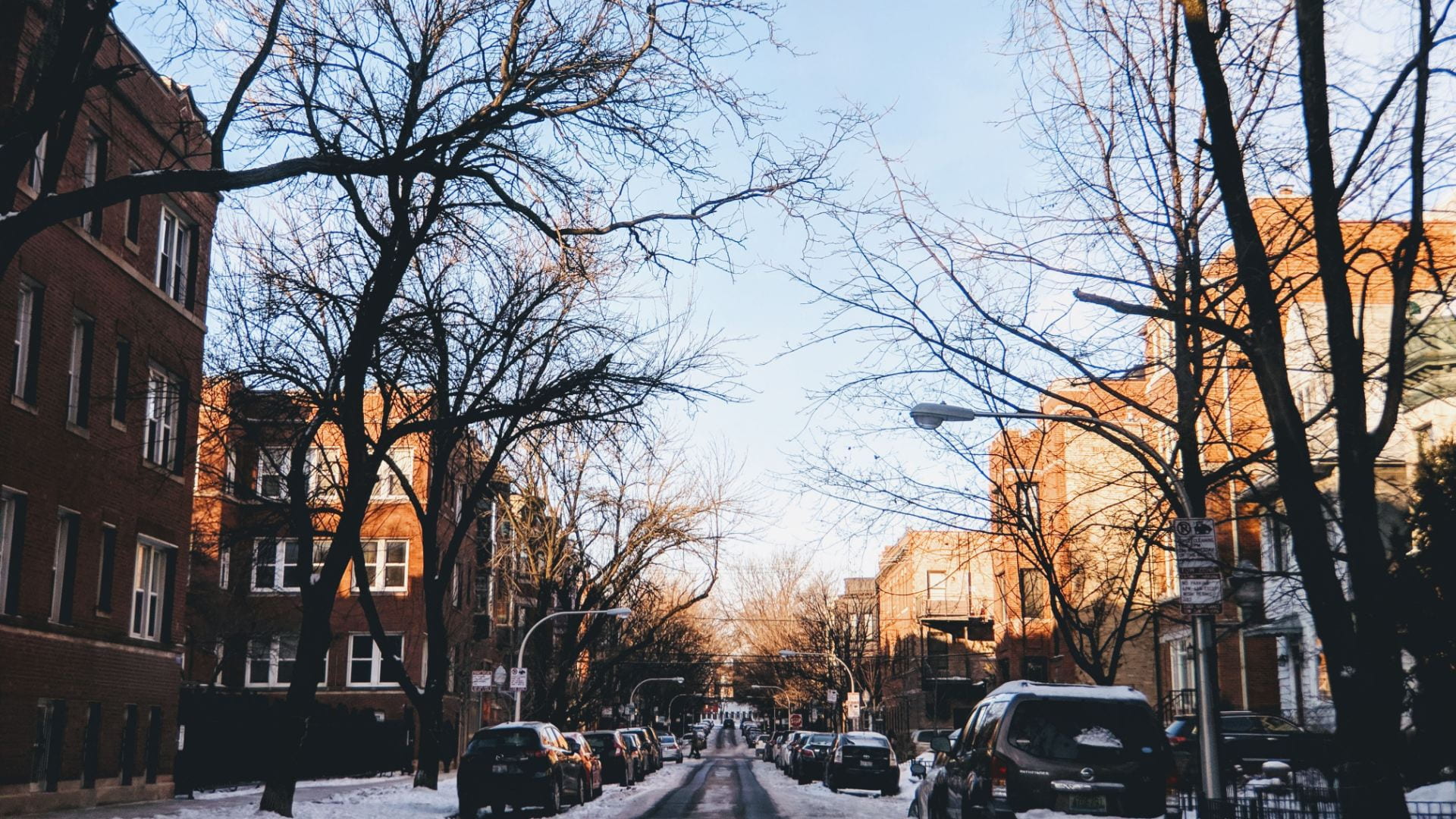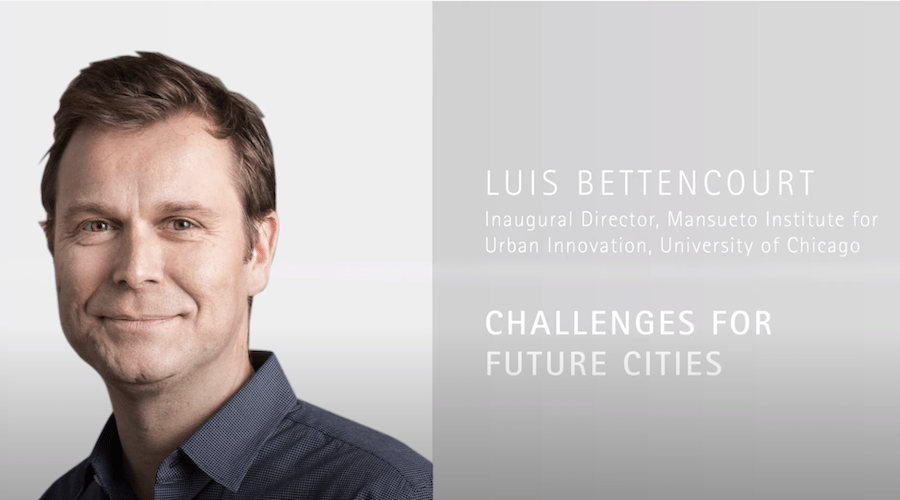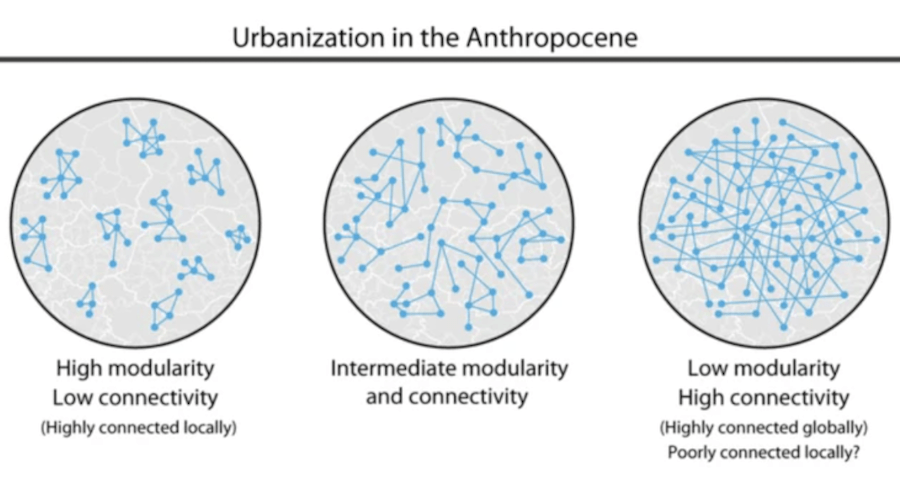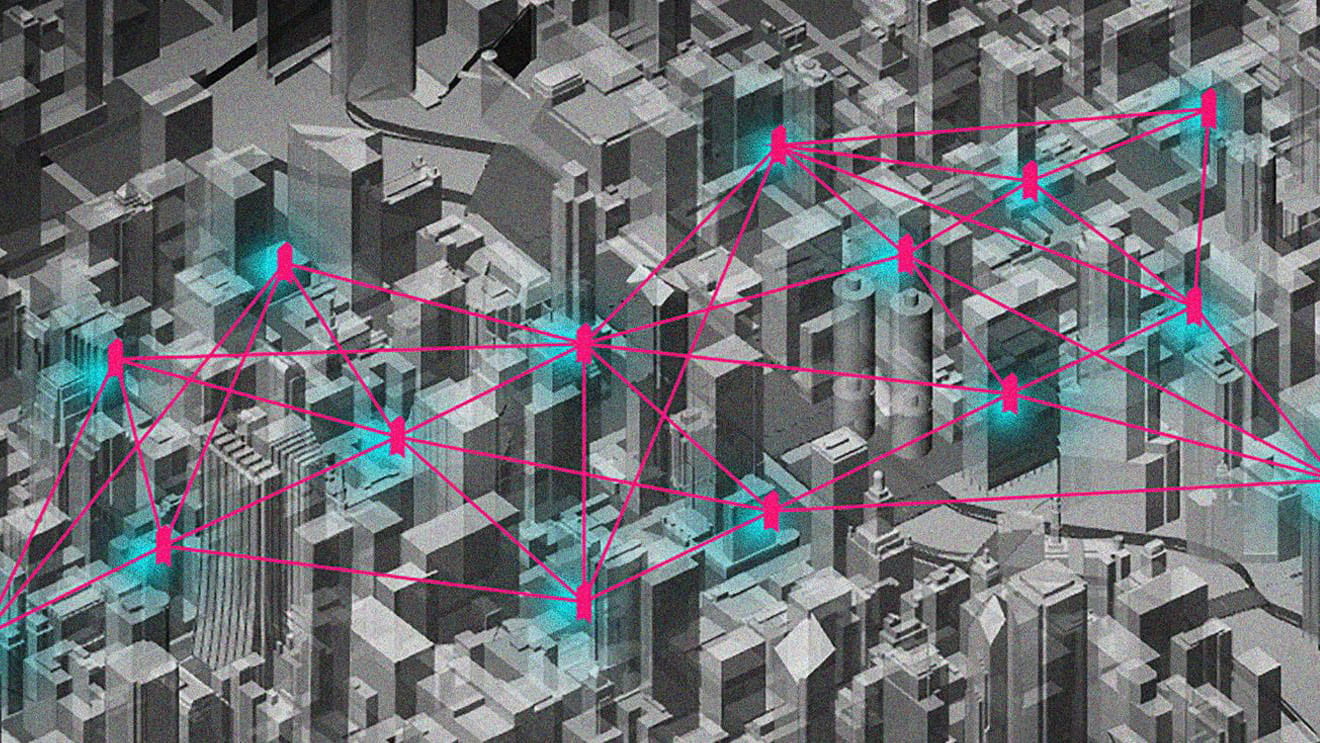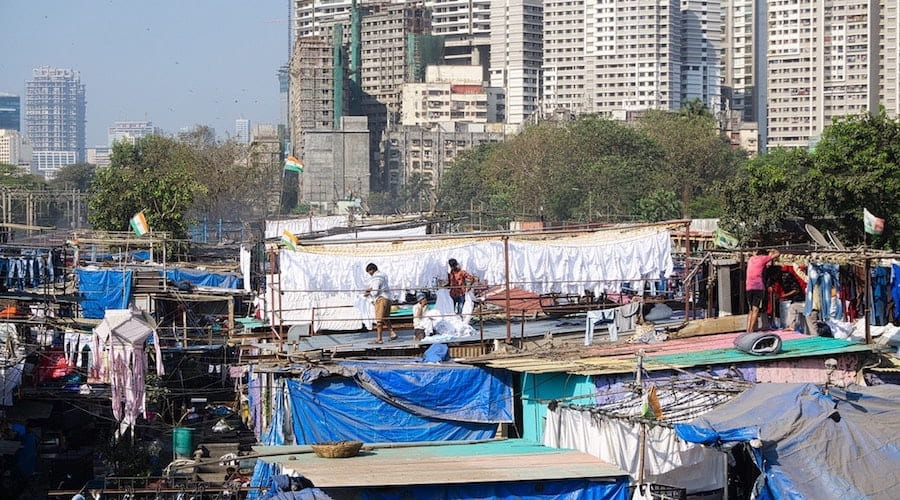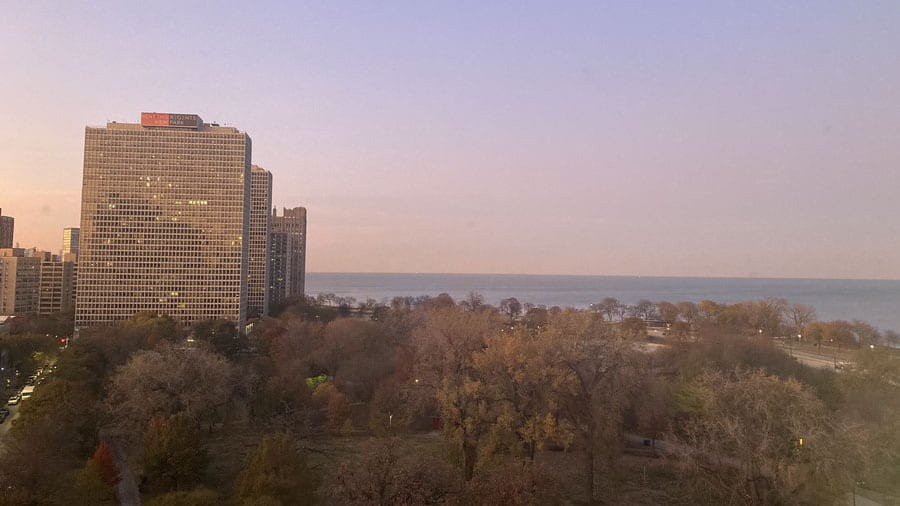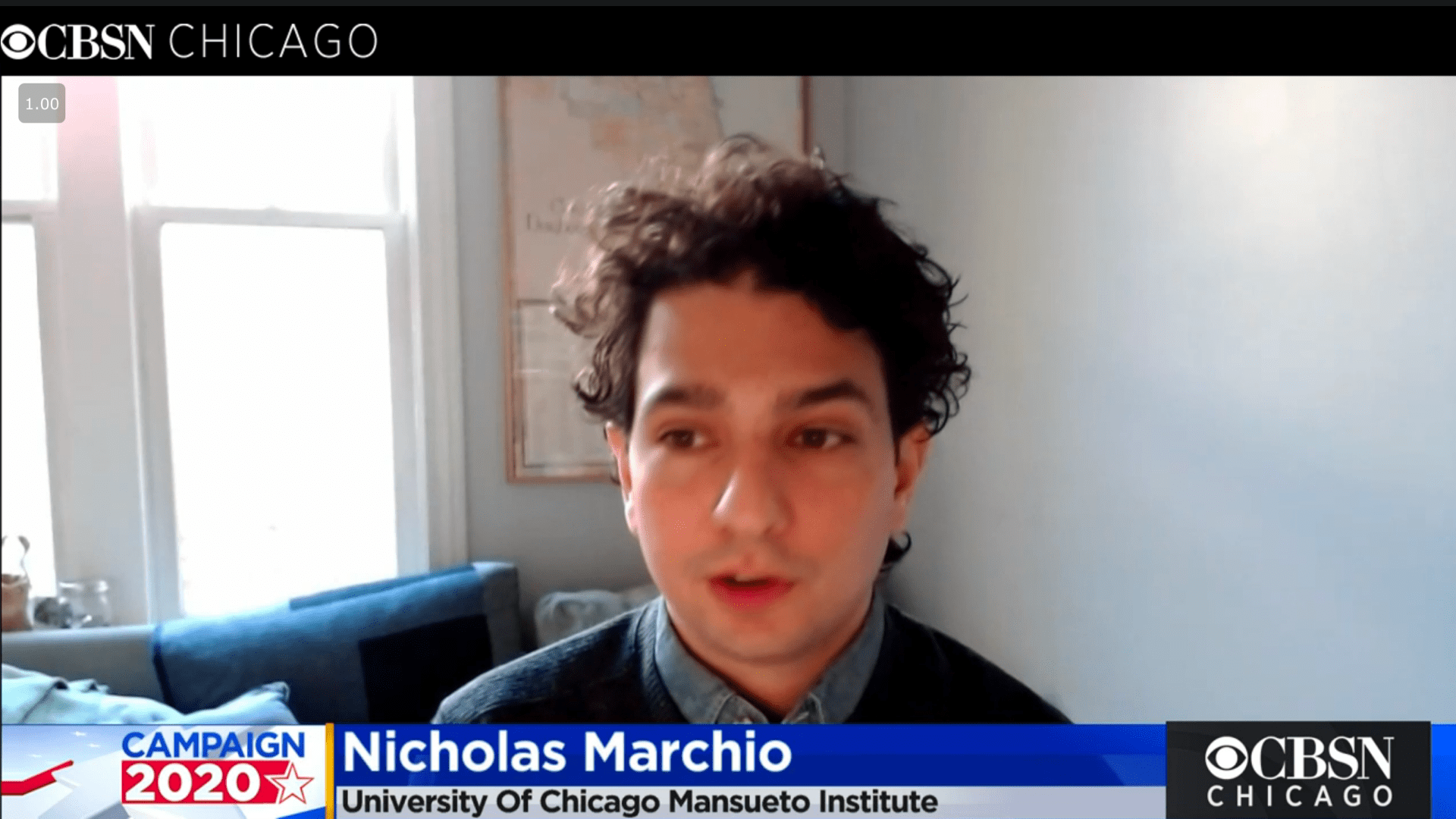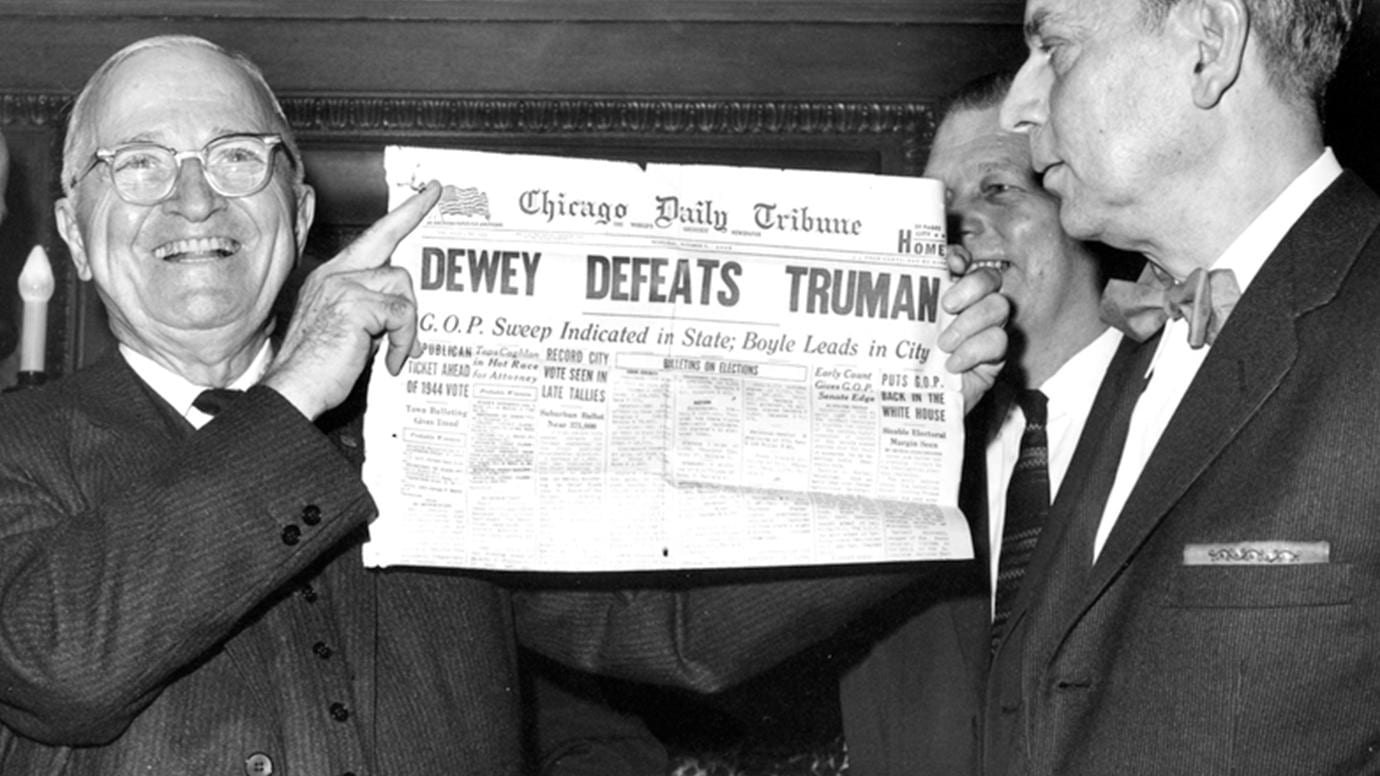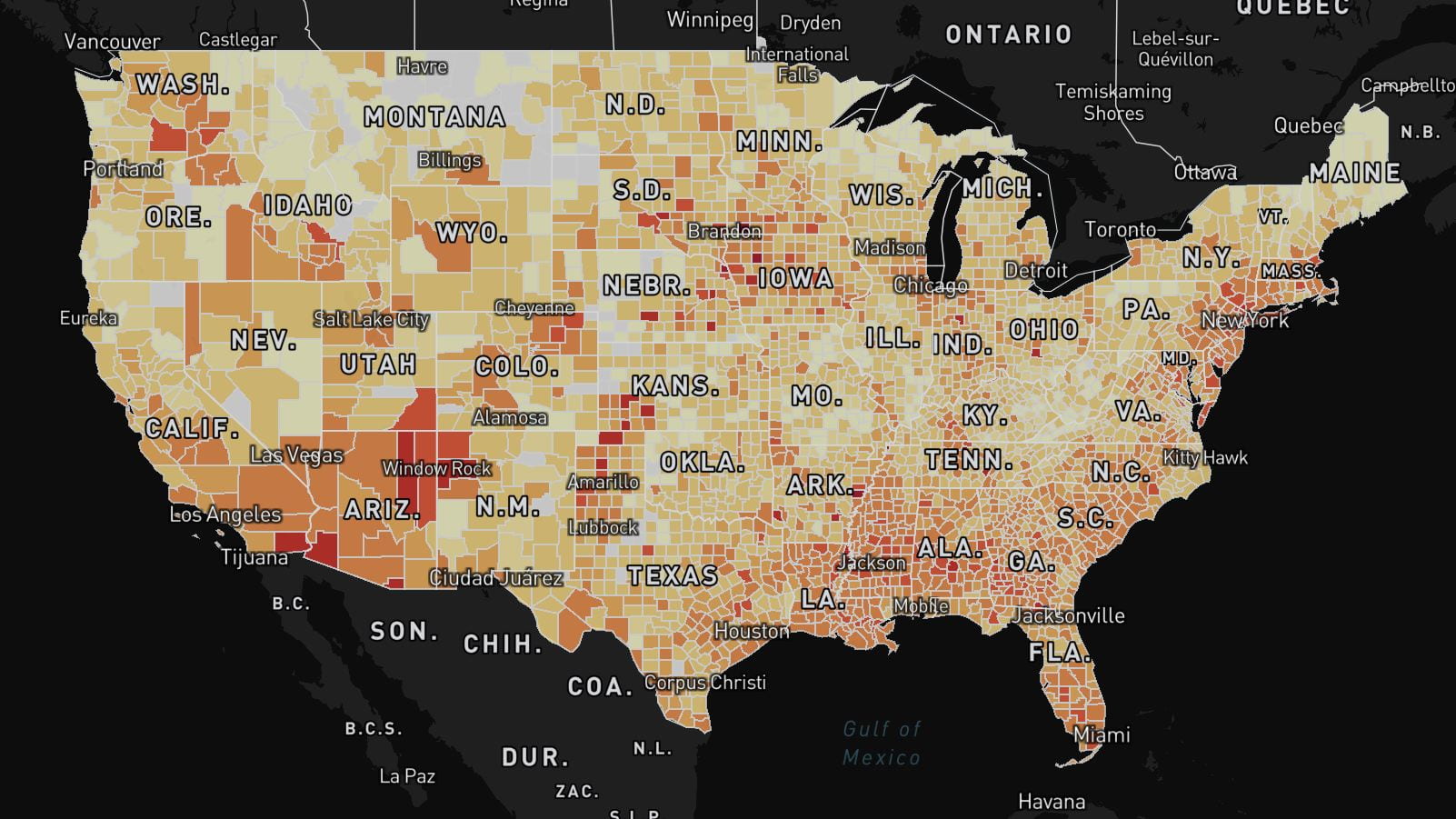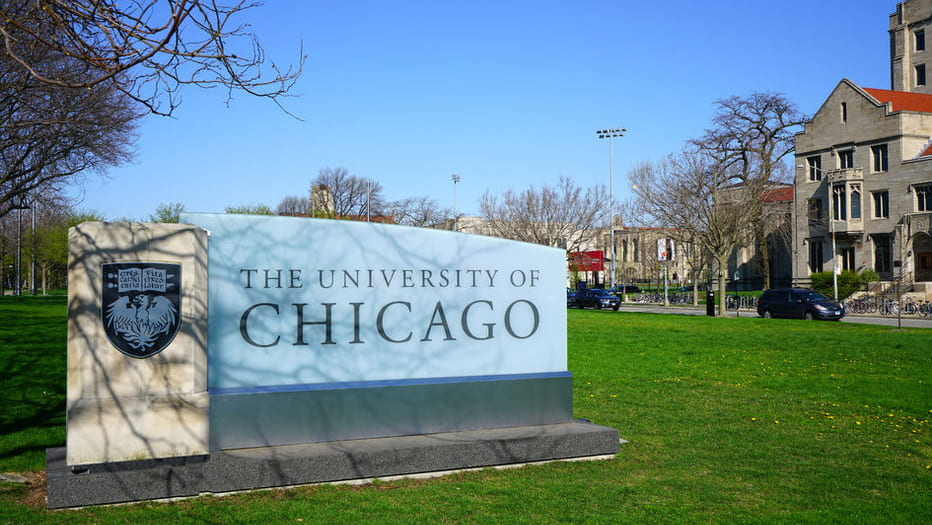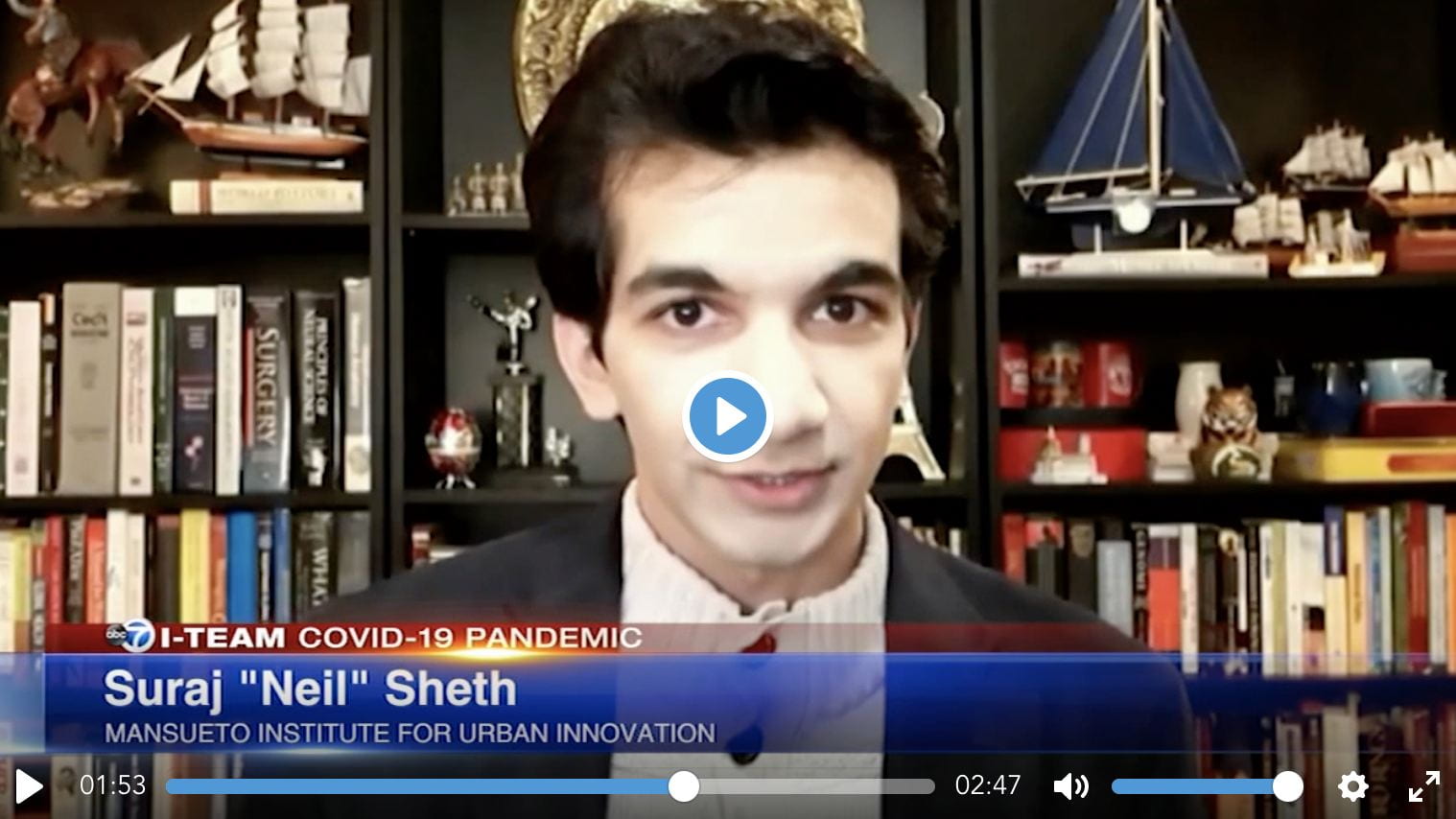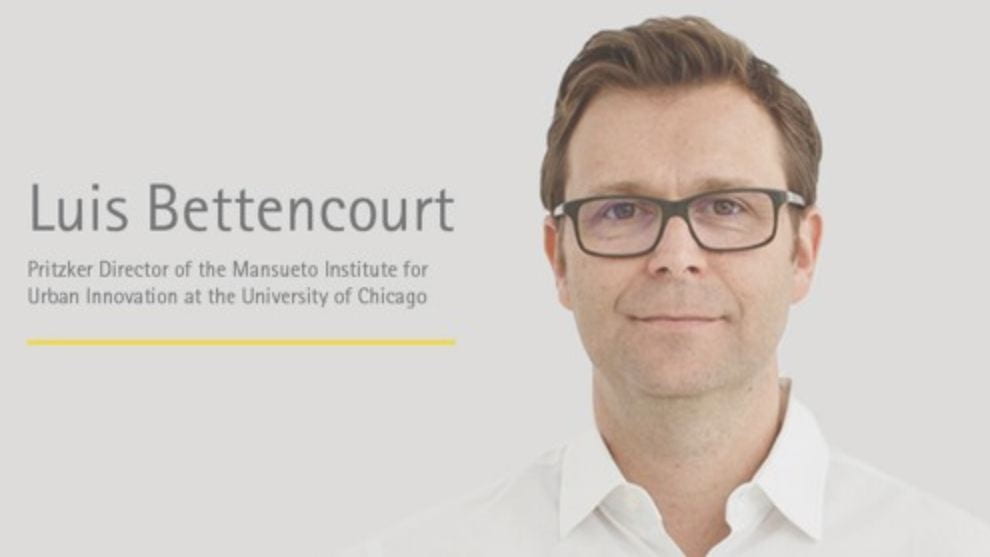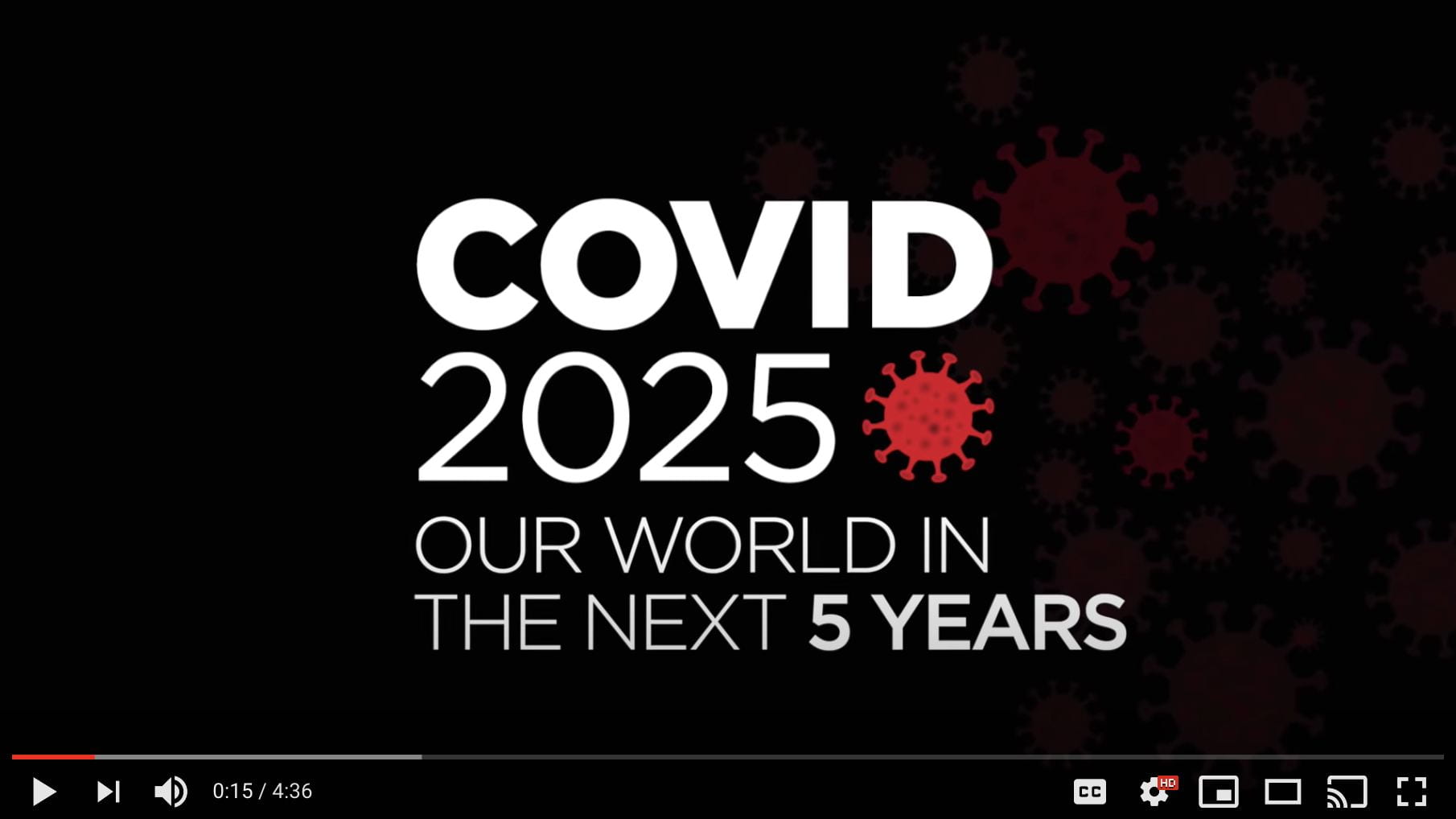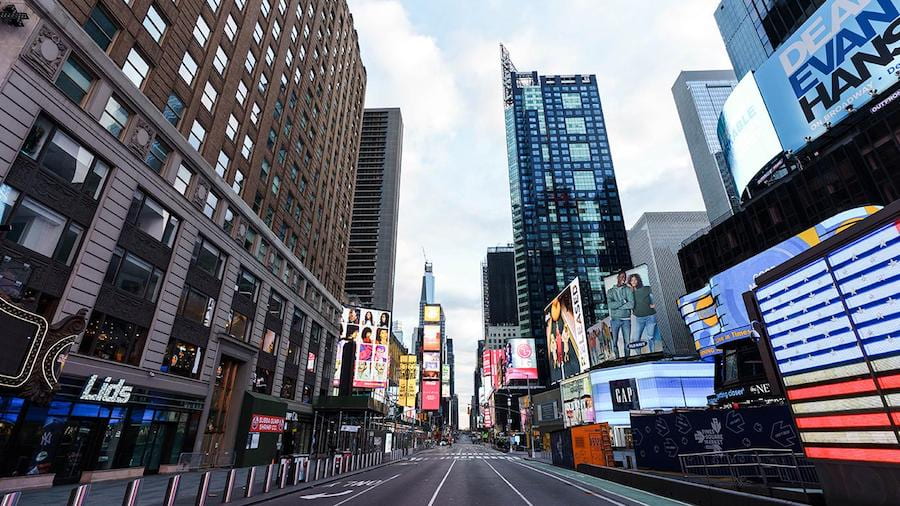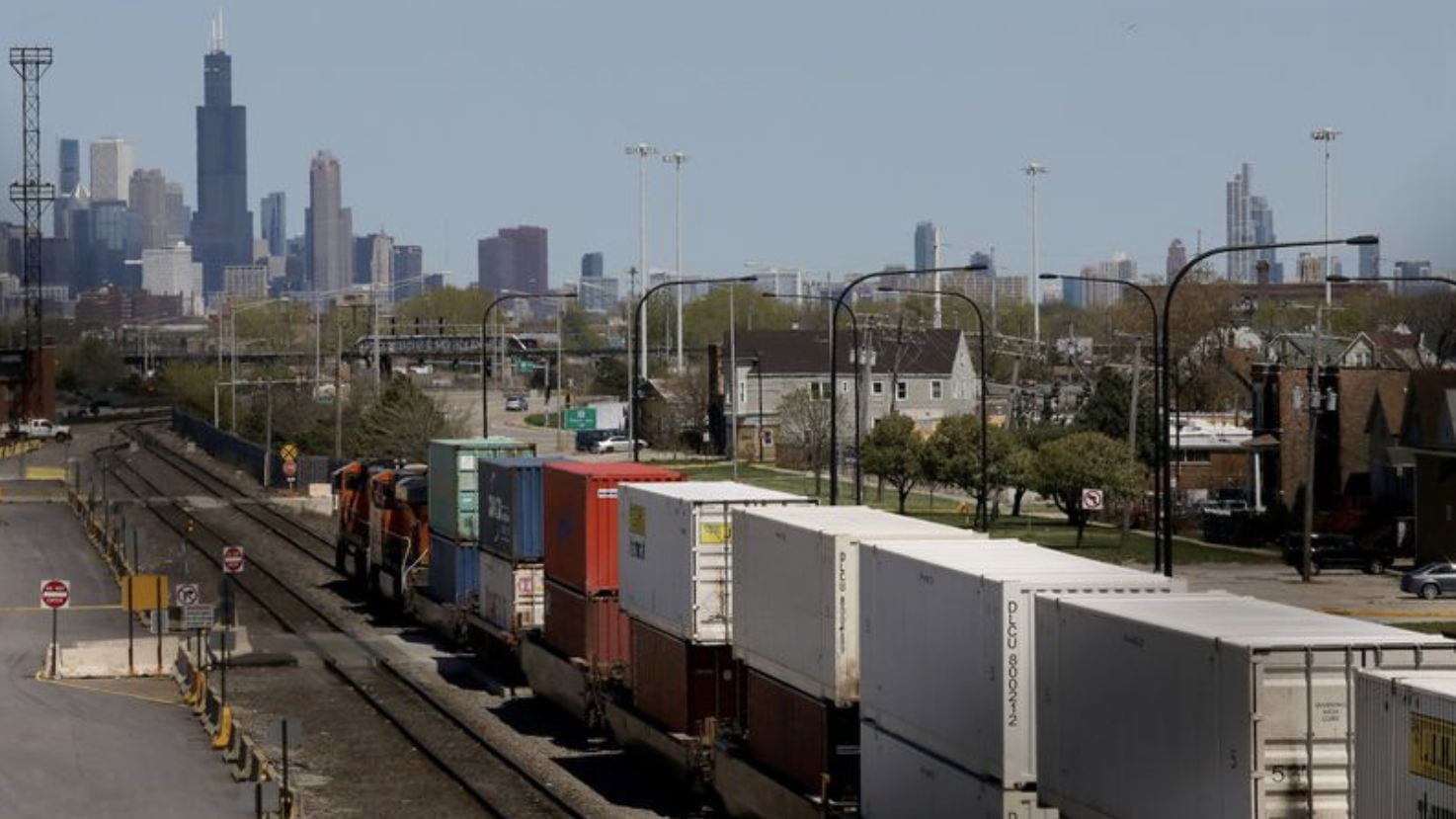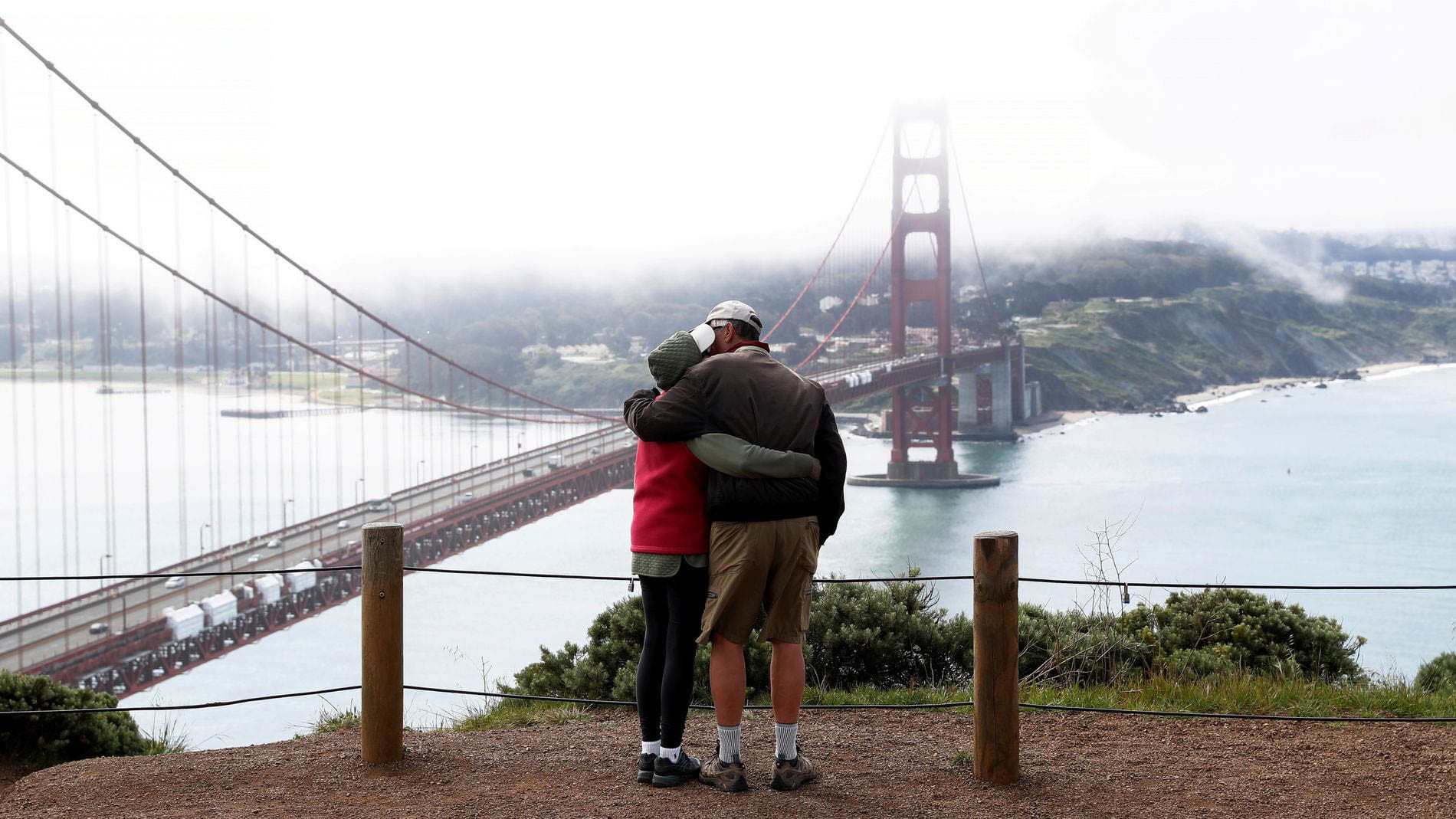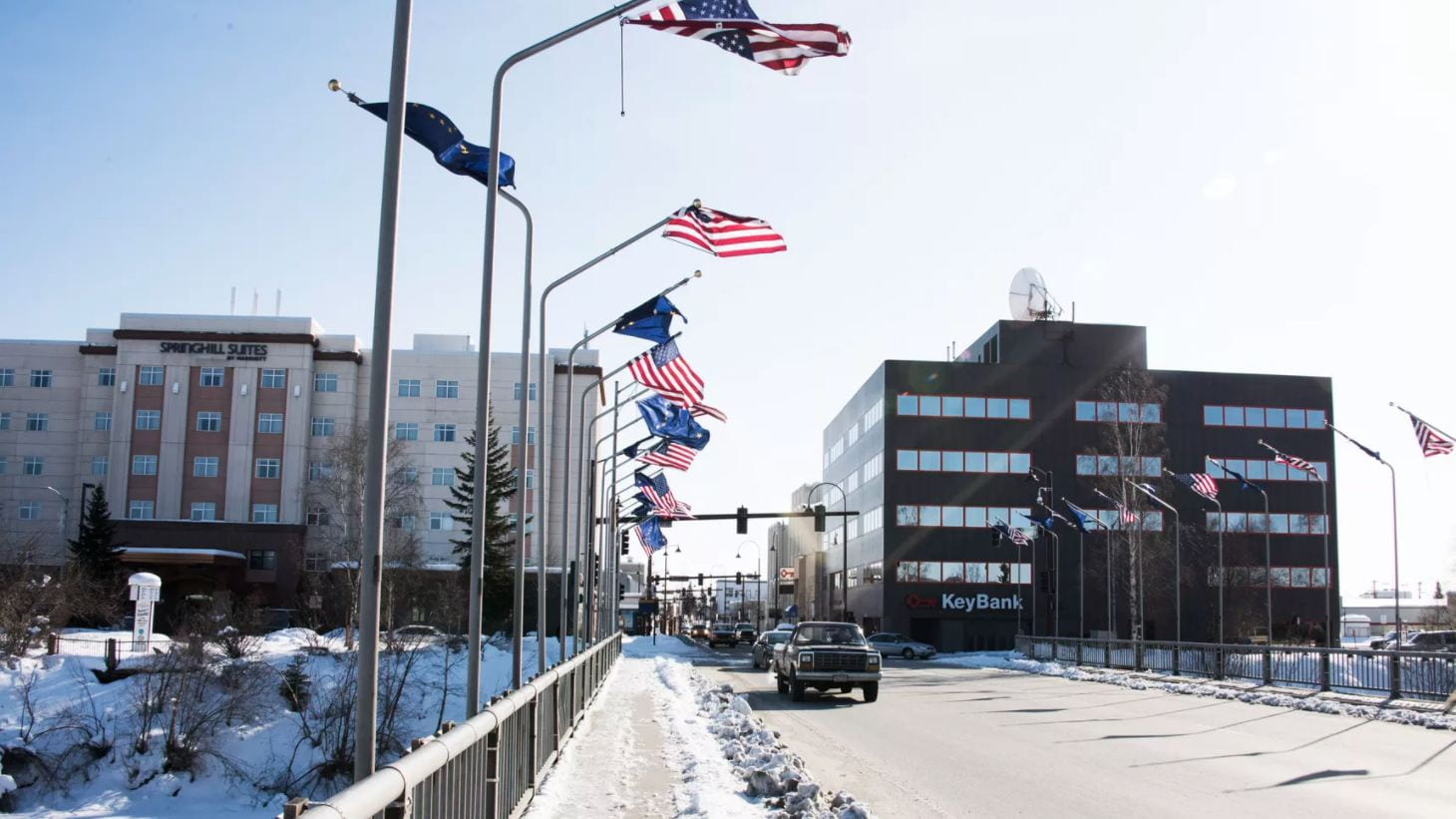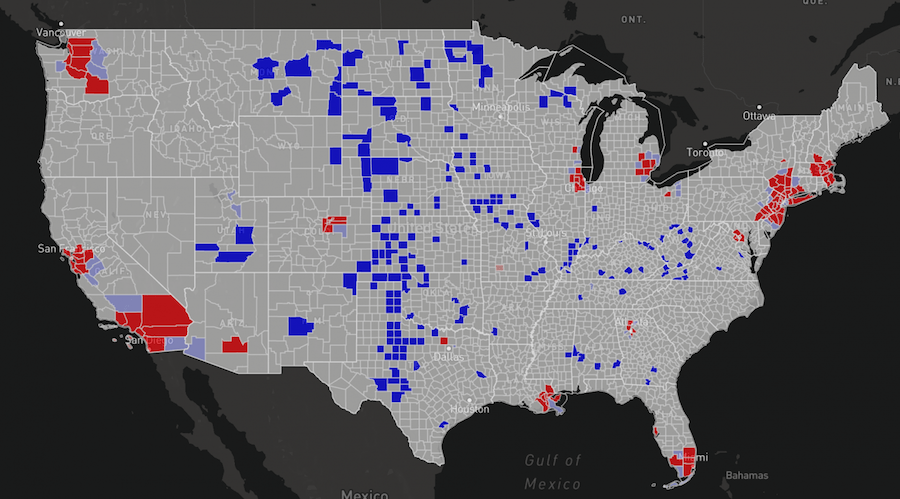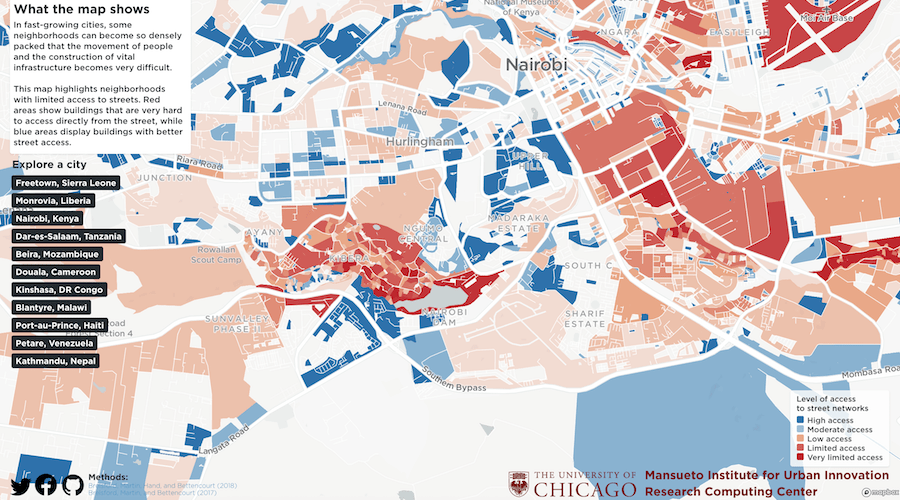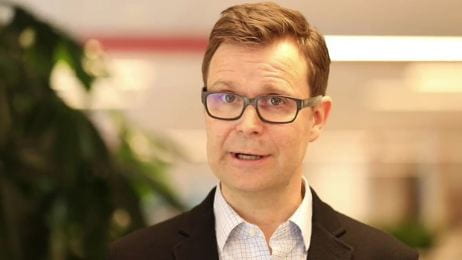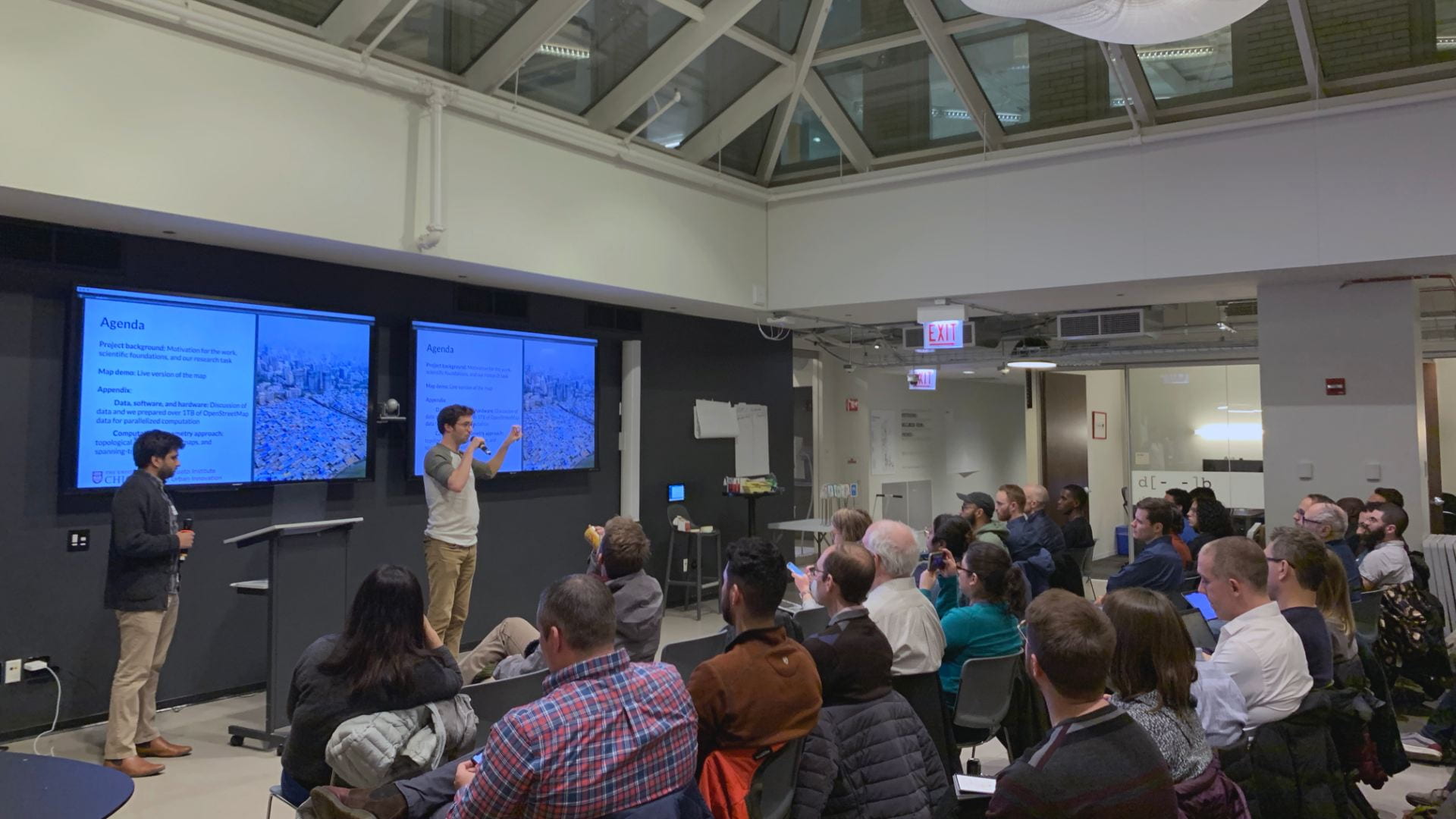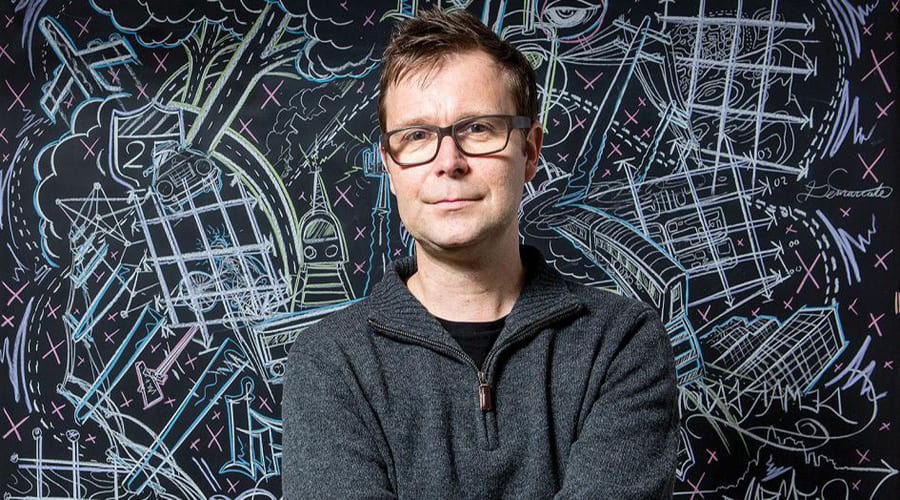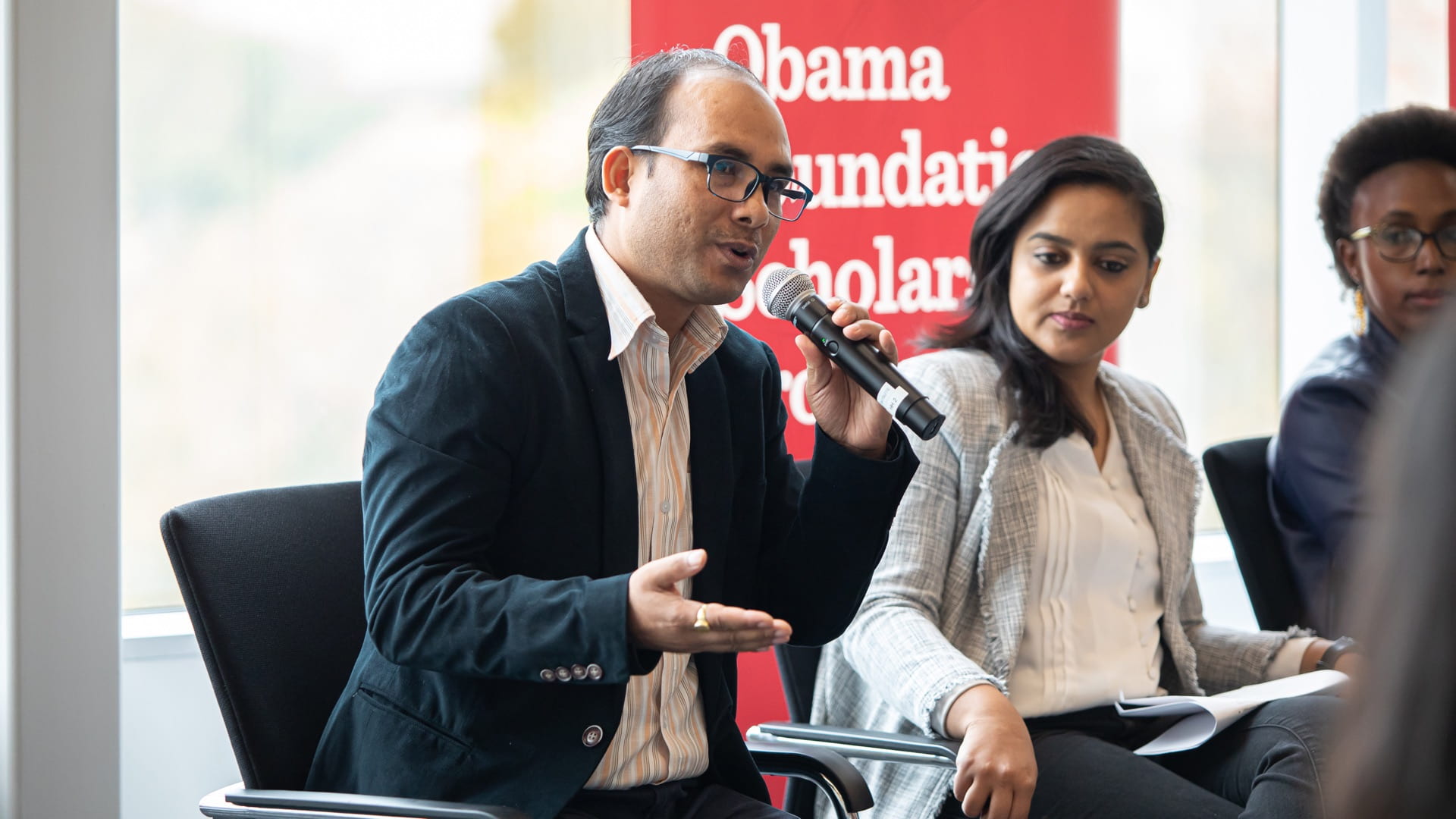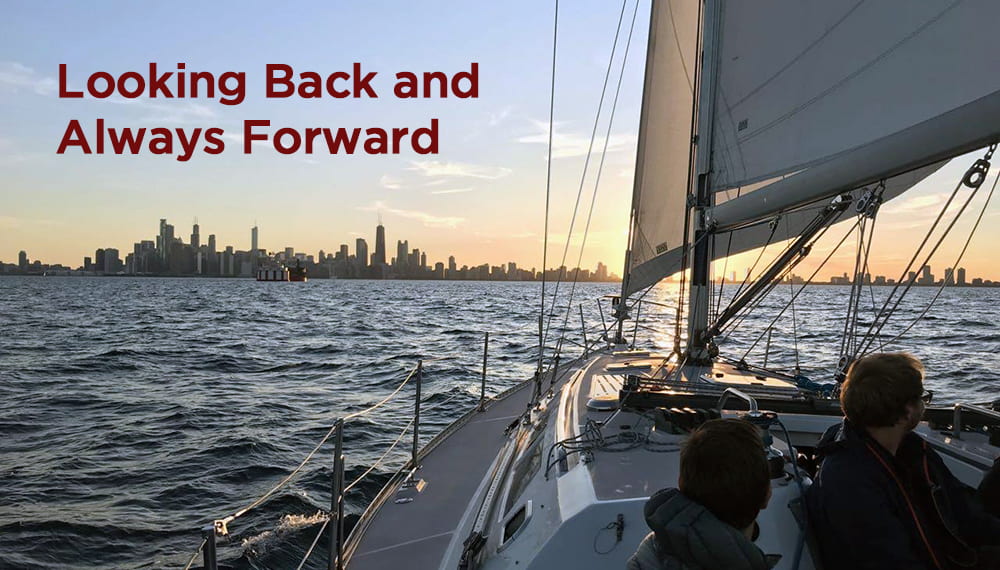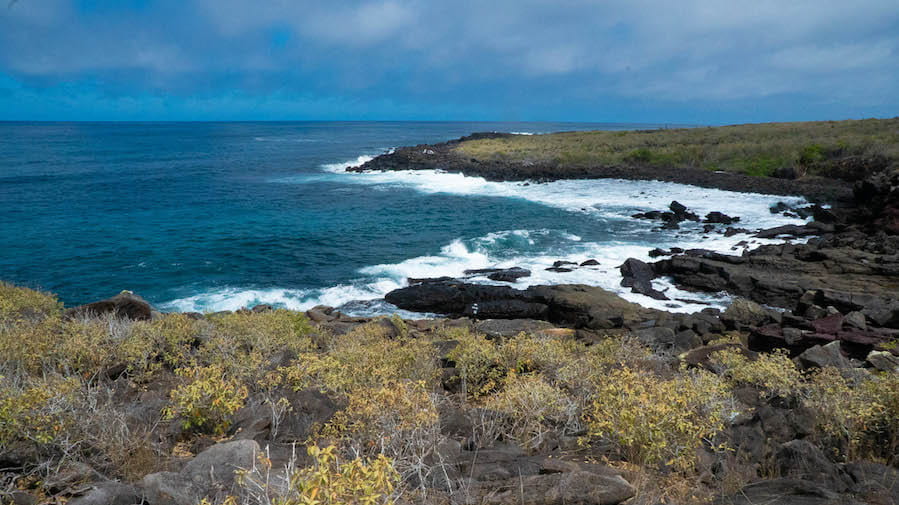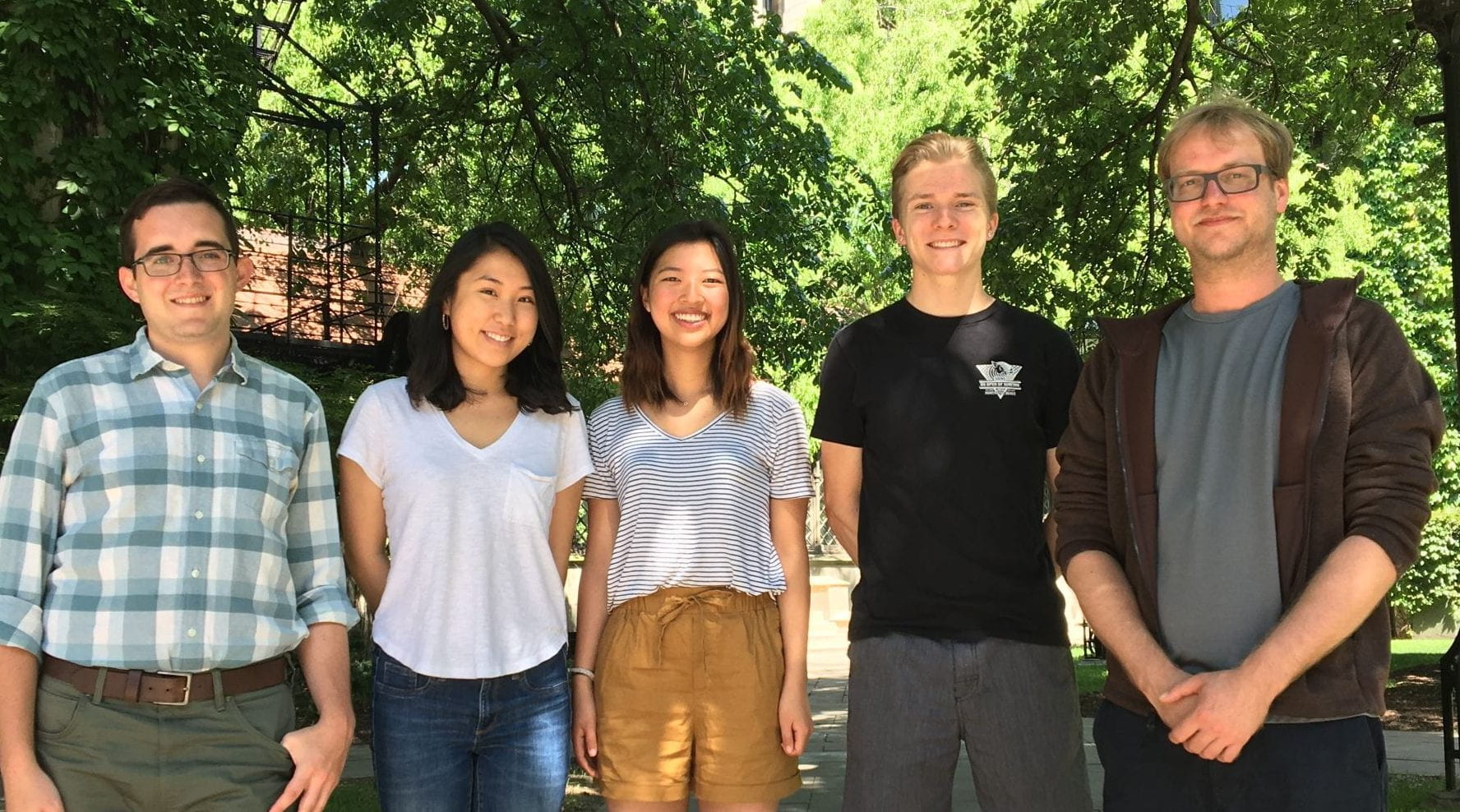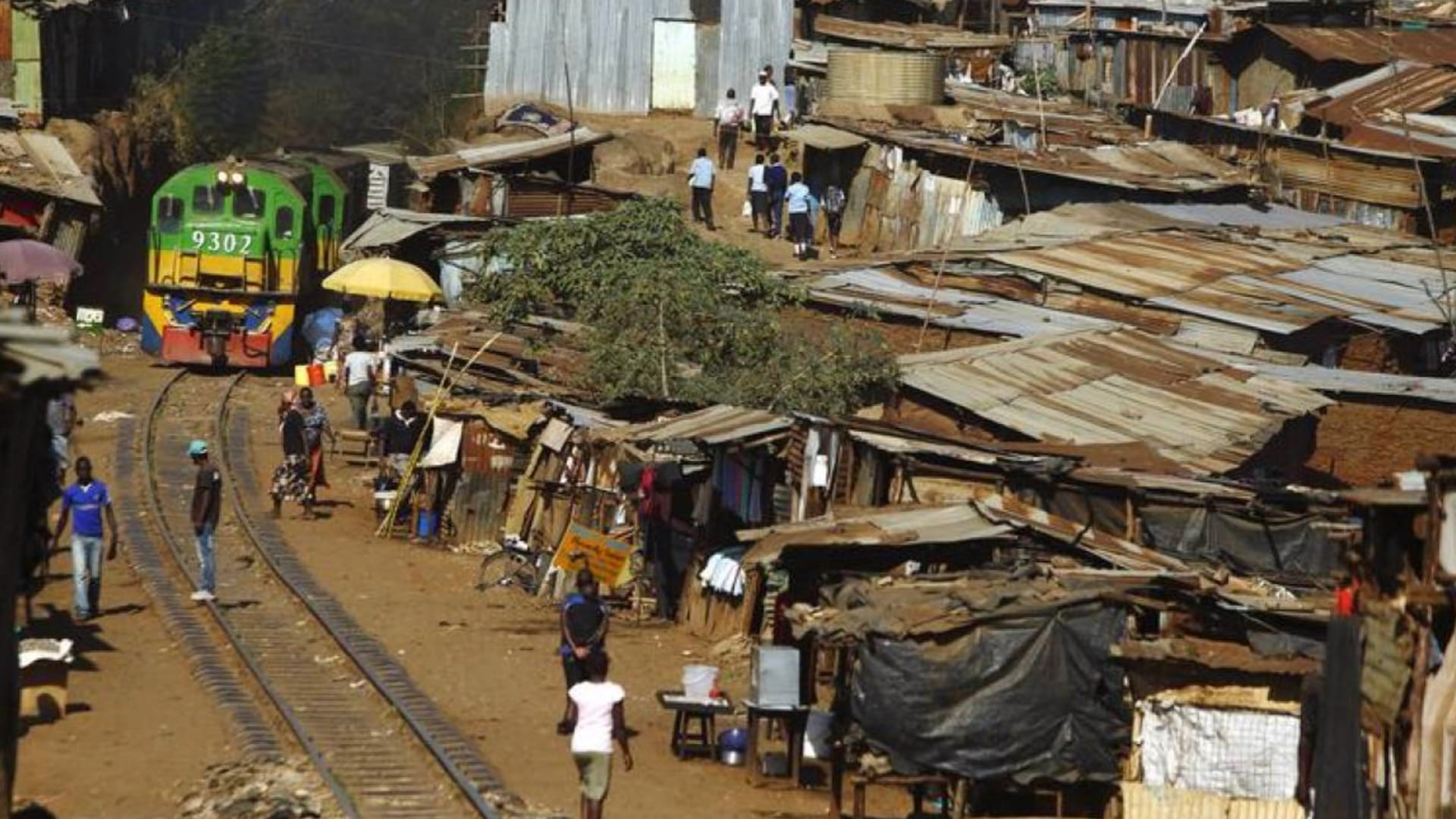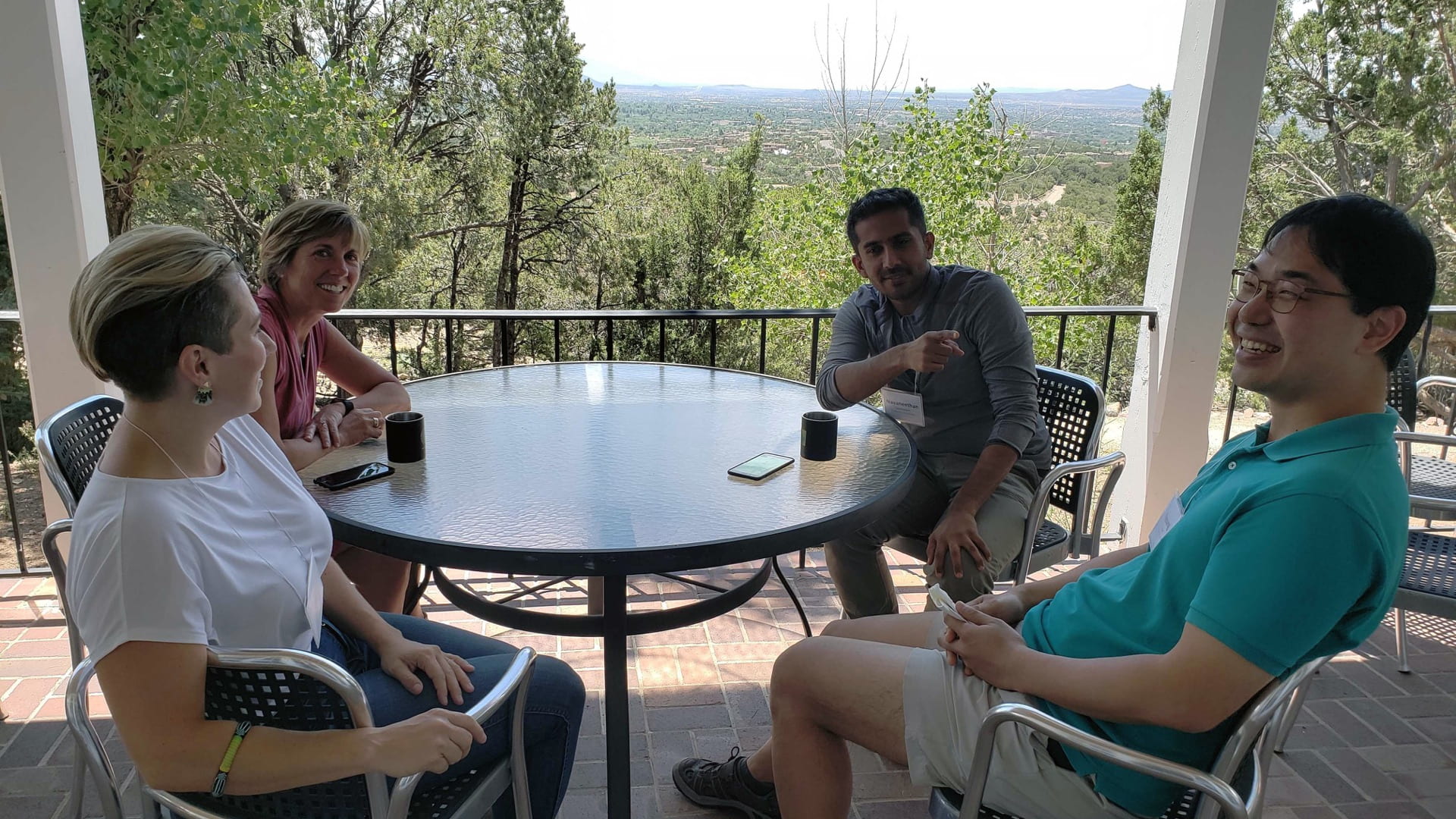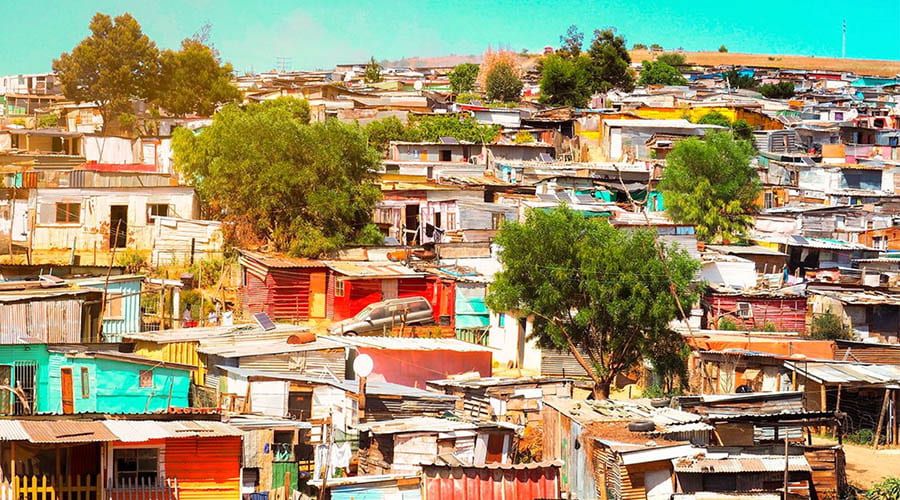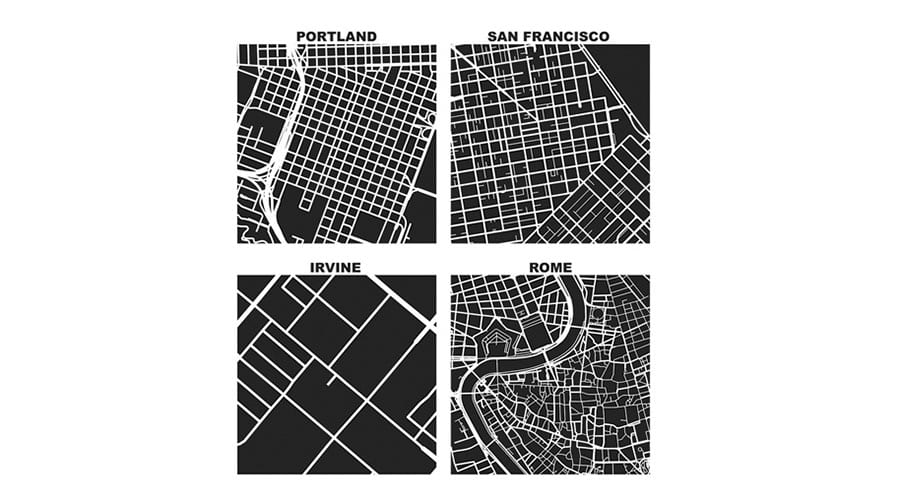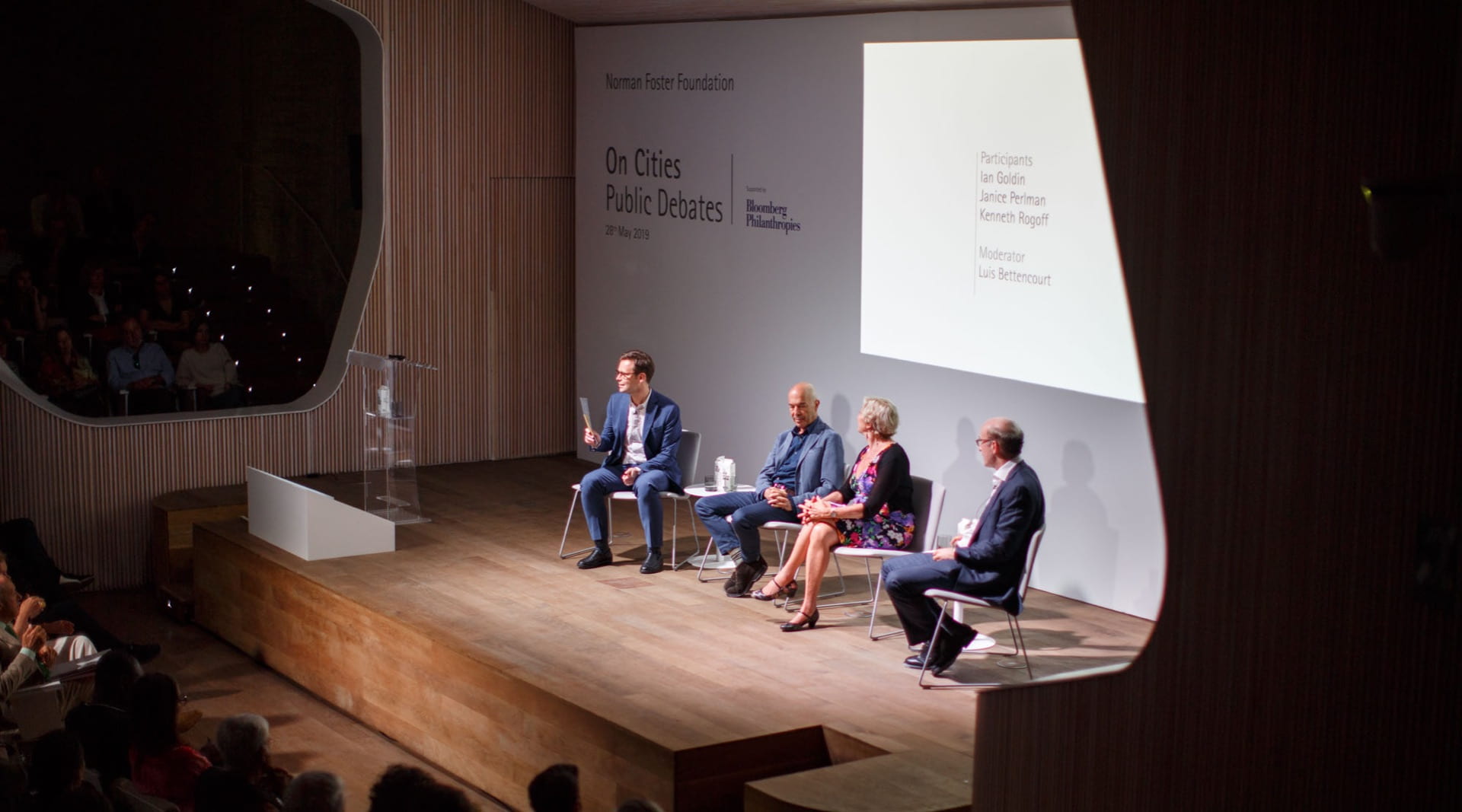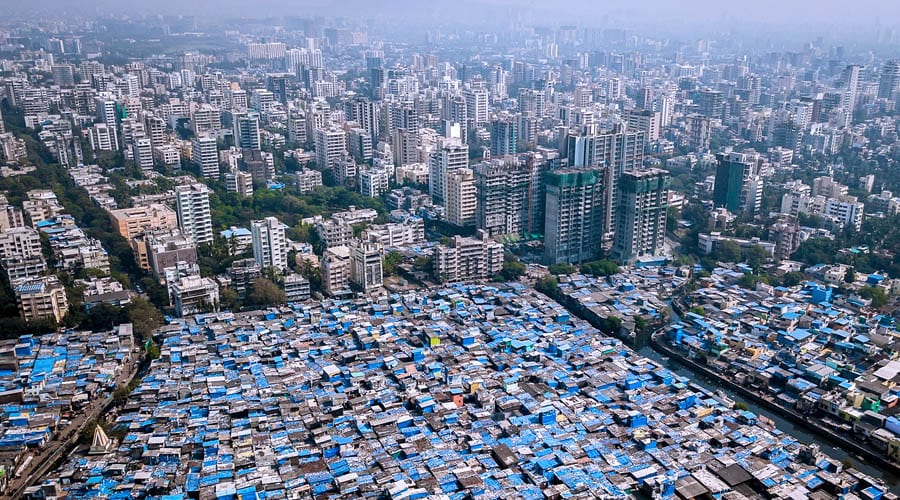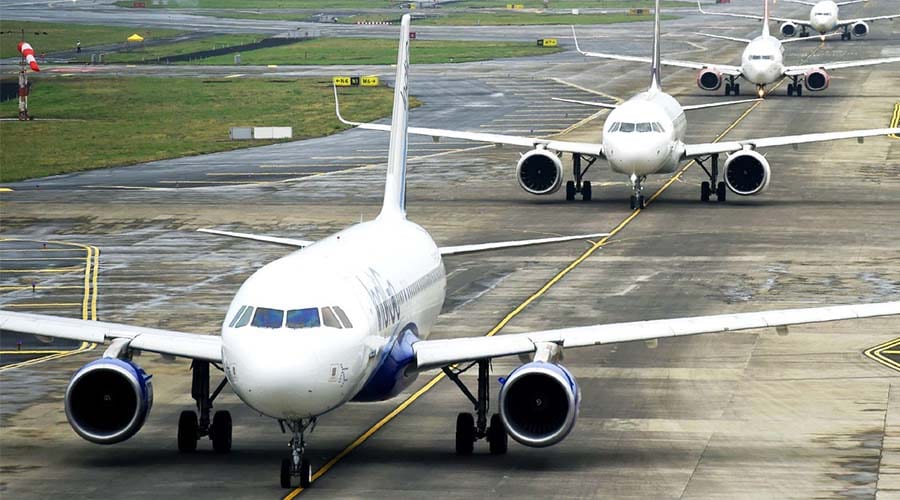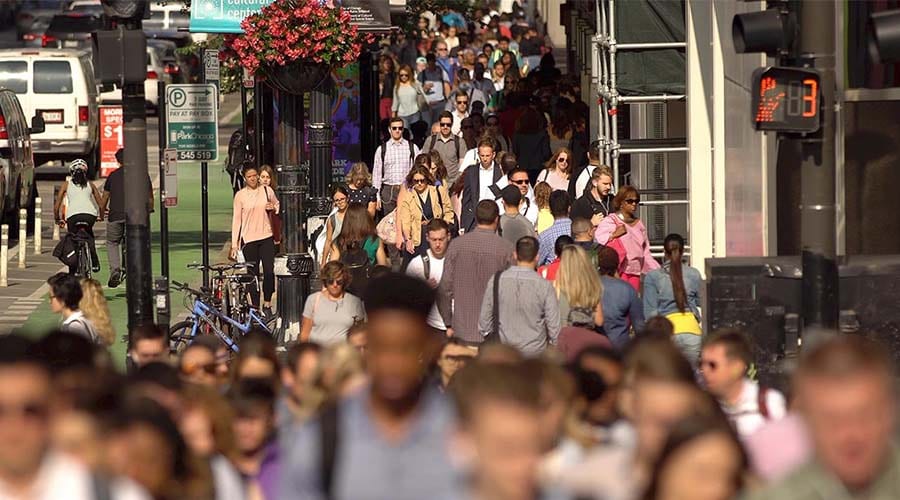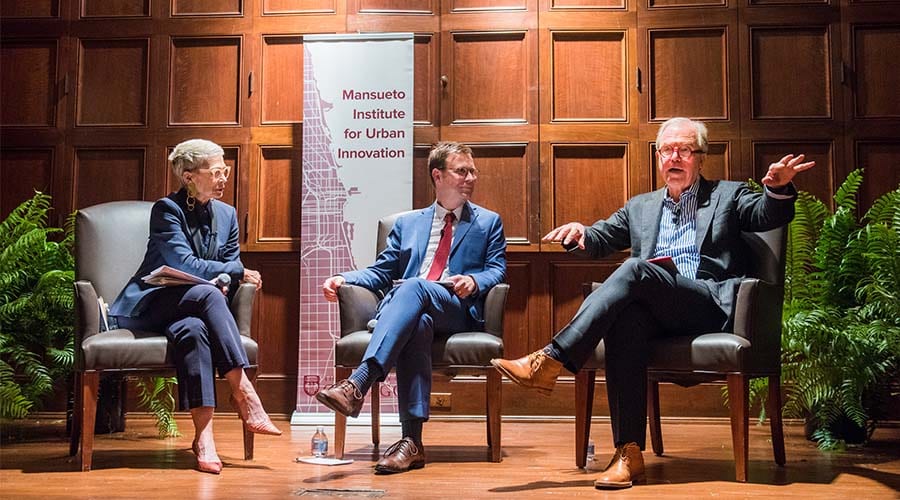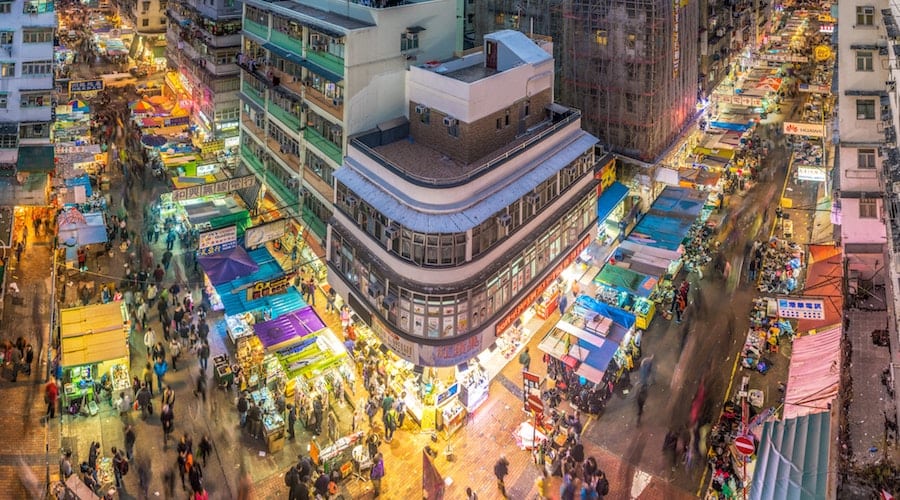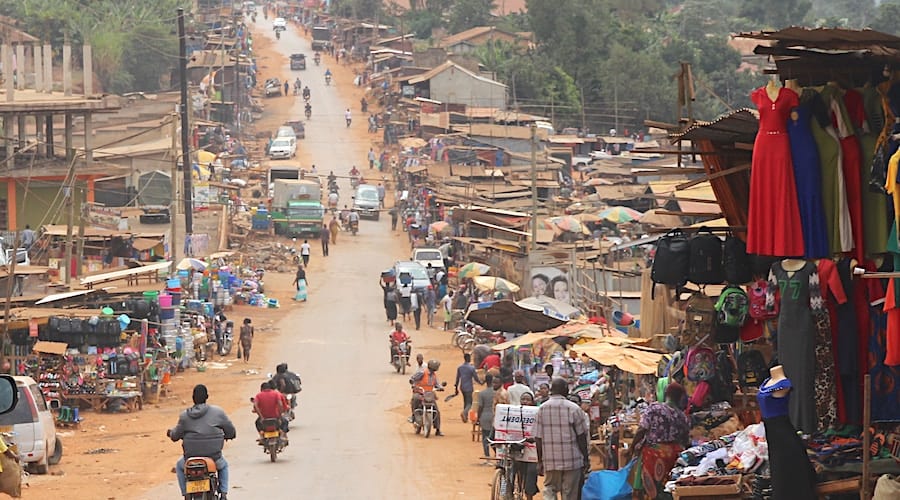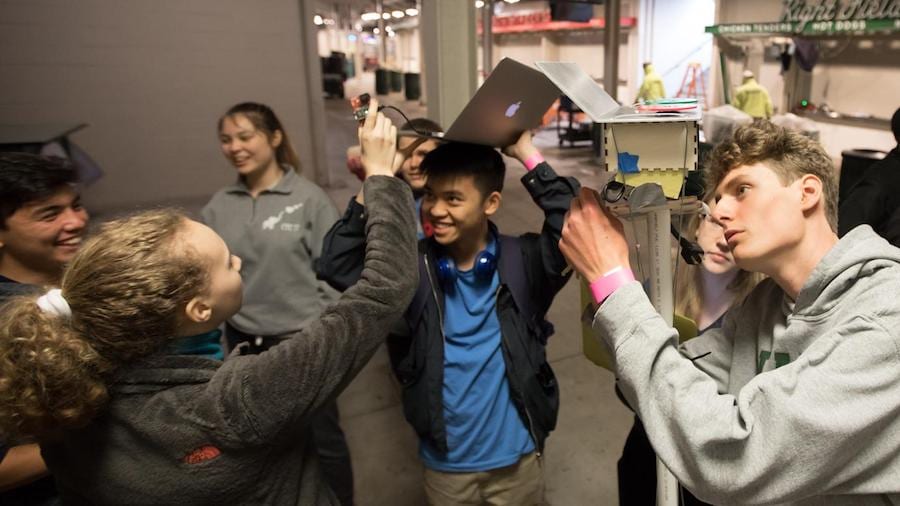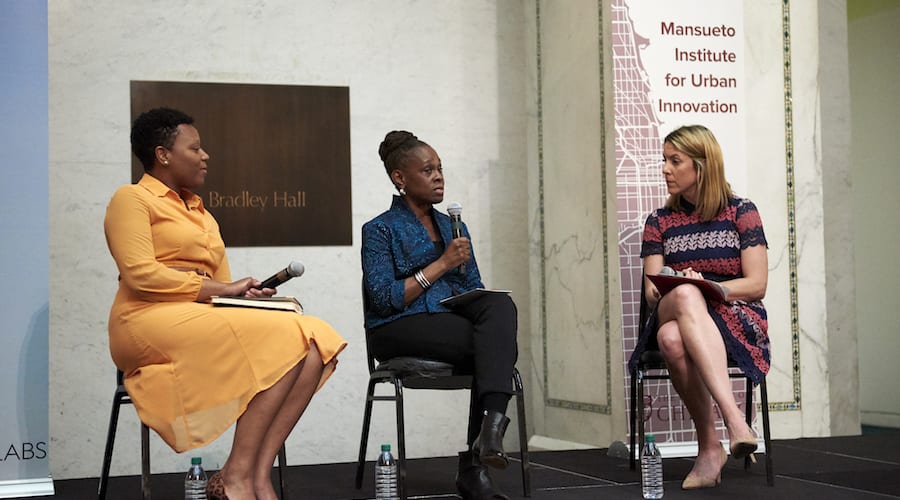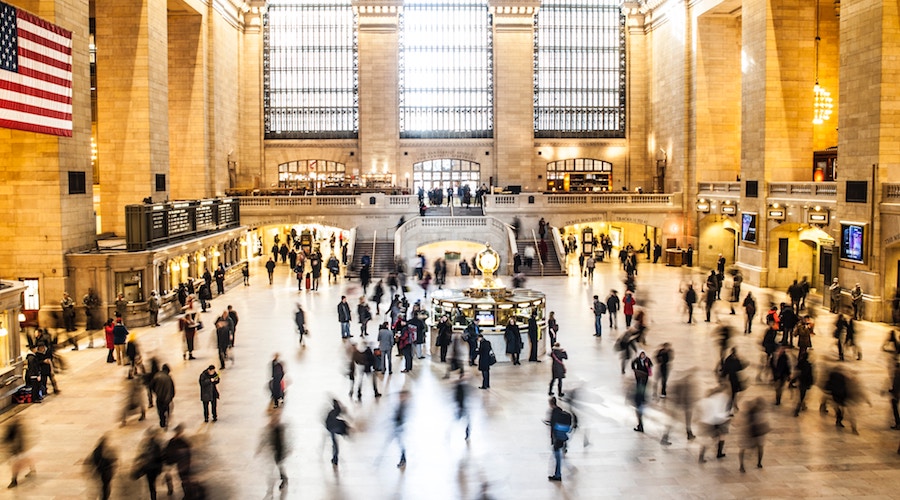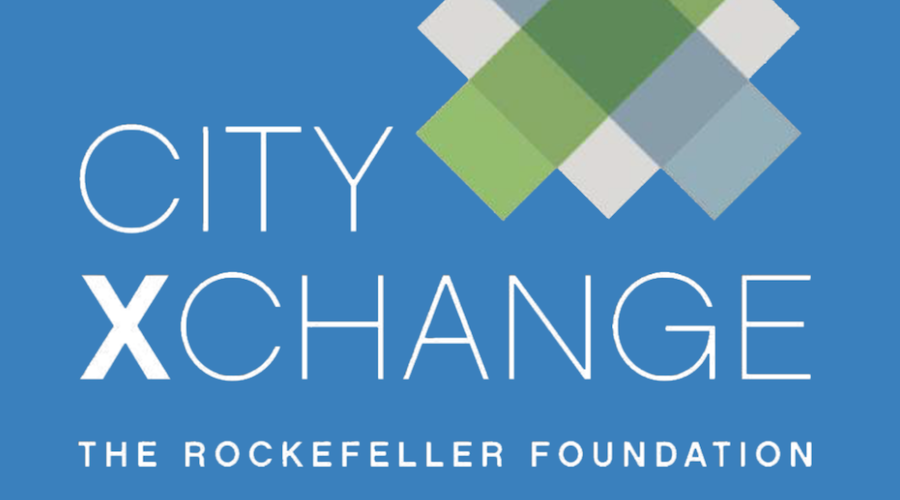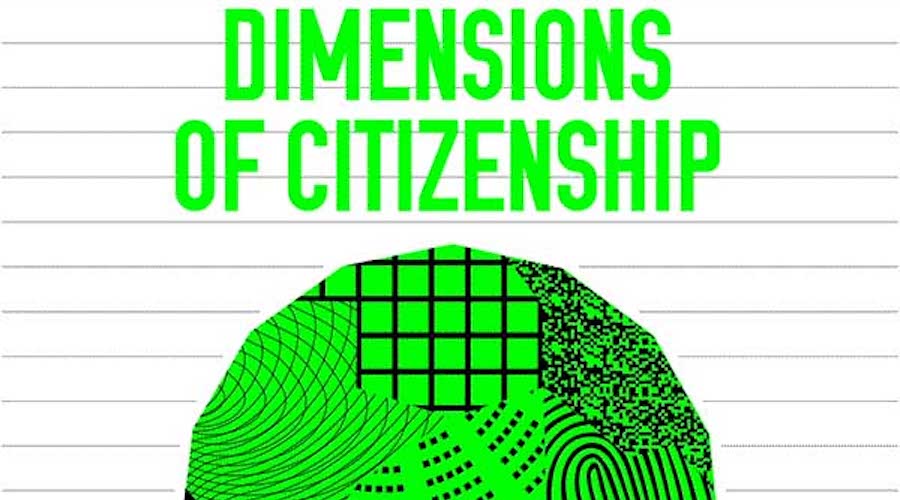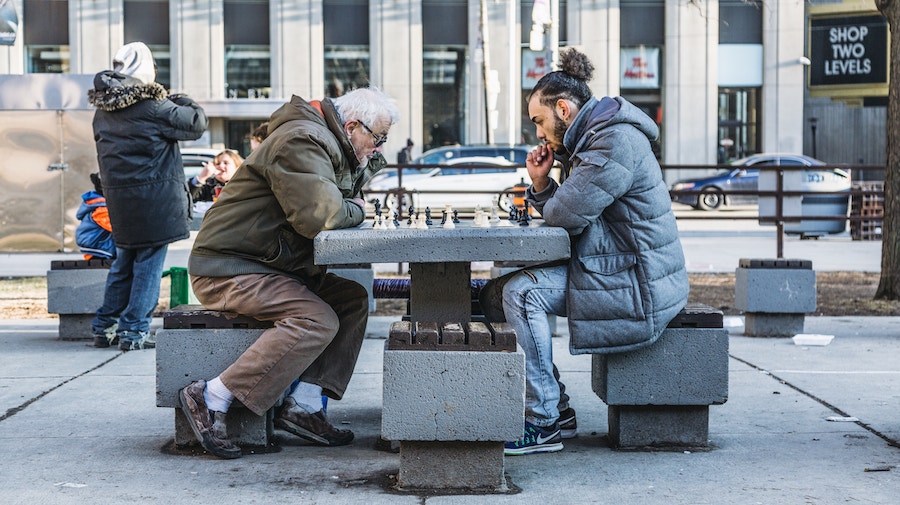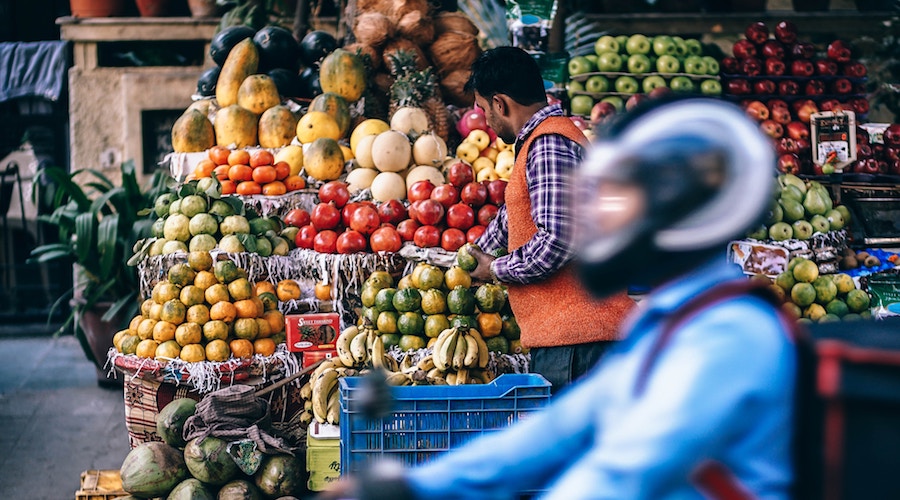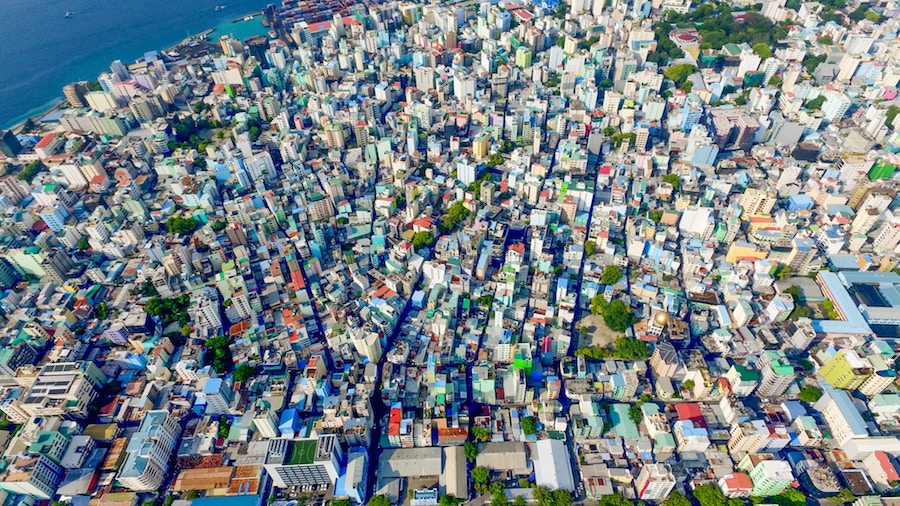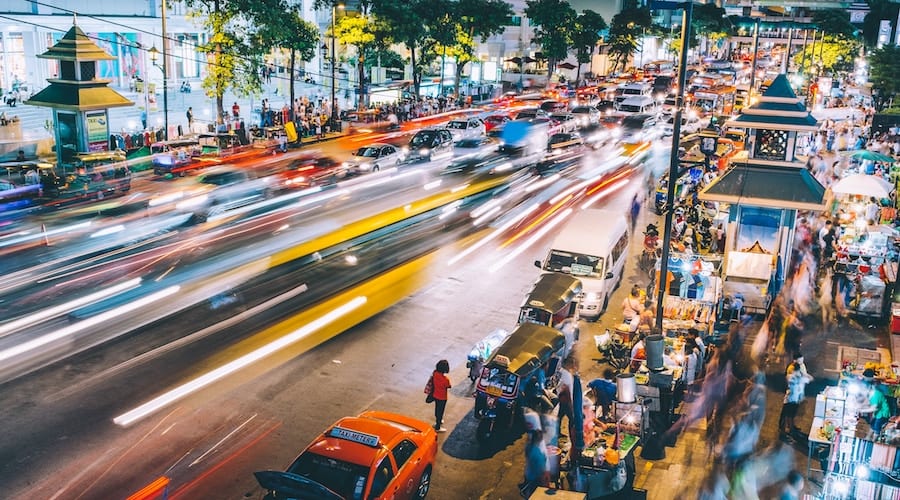News
Featured Updates
——
Mansueto Institute Research Sparks Policy Changes to Aid Vulnerable Homeowners in Cook County
November 25, 2024
Research by Mansueto Institute Faculty Director Chris Berry has played a pivotal role in driving recent policy changes aimed at alleviating the financial strain on homeowners in Cook County. Featured in local news outlets like WBEZ and Crain’s Chicago Business, Berry’s work highlighted the severe tax burdens faced by residents in Chicago’s south suburbs, where many homeowners are struggling with steep property tax increases. In response, Cook County has allocated $15 million to assist vulnerable homeowners with their tax bills, a move that directly follows Berry’s research and reflects growing efforts to improve urban lives and promote economic equity in the region.
Turnout for Local Elections is Abysmal — Could Changing the Timing Help?
August 28, 2024
High School Students Plan the Future of Englewood at ‘Neighborhood Innovation Summit’
July 24, 2024
The Mansueto Institute co-sponsored the Neighborhood Innovation Summit on July 23 and July 24 in partnership with International House at the University of Chicago. The Summit brought together youth participants to empower them to make a social impact in the Englewood neighborhood of Chicago by creating proposals to redevelop into a community garden land through the Cook County Land Bank Authority (CCLBA) Land and Property Transfer program.
Working with Chicago Residents to Design a Climate App
July 20, 2024
Students Receive Grants to Advance the Success of Cities
The Mansueto Institute has awarded Urban Innovation Grants for Student Organizations for the 2024-25 academic year to six University of Chicago student groups working on a range of issues that support the future success of cities, such as sustainable and equitable neighborhood development in Chicago, digital governance and smart cities, and urban diplomacy. The grants will help support events and student groups in the coming year, with one event, the Neighborhood Innovation Summit, already taking place, in July.
Using Social Network Analysis to Understand Ancient Cities
July 22, 2024
In a special issue of the Journal of Anthropological Archaeology, Adrian Chase, Institute Postdoctoral Fellow & Department of Anthropology Postdoctoral Scholar, and colleagues introduce the use of social network analysis to interpret archaeological evidence of ancient urban communities and neighborhoods. The featured articles showcase how this method, which involves defining and tracking relationships among some set of social entities — combined with spatial data — can reveal social linkages and interactions within and between ancient communities. Key insights include identifying neighborhoods based on spatial proximity and social interactions and describing the role of shared rituals and practices in forming larger communities. The collection highlights how social network analysis can uncover the intricate social structures of past societies and suggests new research avenues that extend beyond traditional archaeological methods.
Detroit Residents More Satisfied with Revitalized Neighborhoods
July 20, 2024
Residents of Detroit were more satisfied with local amenities if they lived in parts of the city that received place-based investment through the city’s $260 million Strategic Neighborhood Fund (SNF), according to an analysis by Mansueto Institute and Division of Social Sciences postdoctoral fellow Lydia Wileden. The study is part of an ongoing survey of over 4,000 residents called the Detroit Metro Area Communities Study that Wileden first engaged with as a PhD student at the University of Michigan. The findings, which were covered by Axios, are captured in a series of reports developed in collaboration with Invest Detroit that spotlight residents’ perceptions of local investments from 2019 to 2023. They highlight the strong, negative impact of the pandemic across Detroit on people’s perceptions of their neighborhoods and the ways in which the SNF led to a recovery in positive sentiments more recently.
Faculty Awarded Urban Innovation Grants for Research on Cities
June 12, 2024
The Mansueto Instituted awarded the 2024-25 Urban Innovation Grants to six faculty projects covering a range of key urban issues, including neighborhood mapping, aging housing stock in cities, climate impacts on mental health, community safety, local politics and governance, and zoning reforms. The project leads are Eman Abdelhadi, Comparative Human Development, Robin Bartram, Crown Family School of Social Work, Policy, and Practice; Kate Burrows, Public Health Sciences; Sonya Mathies Dinzulu, Psychiatry & Behaviroal Neuroscience; Daniel Moskowitz, Harris School of Public Policy; and Arianna Salazar-Miranda, Mansueto Institute and Division of Social Sciences.
Redlined Neighborhoods Face Greater Risk of Extreme Weather
May 17, 2024
“Redlining” has had an enduring impact on climate-related risks, particularly flooding and extreme heat, according to a new paper in Nature Cities. Using a database of 202 US cities’ Home Owners’ Loan Corporation (HOLC) maps and high-resolution climate risk data, researchers from the University of Chicago, Yale School of the Environment, the Federal Reserve Bank of Richmond, and Groundwork USA, including Mansueto Institute and Division of Social Sciences postdoctoral fellow Arianna Salazar-Miranda, show that neighborhoods that were previously given “redlined” grades face heightened risks of flooding and extreme heat events in the present day. They further identify that diminished environmental capital, such as reduced tree canopy and lower ground surface permeability, are contributing factors to this increased climate risk. As efforts to modernize the Community Reinvestment Act and other federal policies are underway, the paper makes a case for resilience measures that aim to mitigate the impact of climate change on vulnerable communities.
New Book Paints Mesoamerica as an Early Urban Hub
May 15, 2024
Adrian Chase, Institute Postdoctoral Fellow & Department of Anthropology Postdoctoral Scholar, has co-edited Ancient Mesoamerican Population History: Urbanism, Social Complexity, and Change (the University of Arizona Press), an update of Precolumbian Population History in the Maya Lowlands, which was the first large-scale attempt to look at settlement population in part of what is now modern-day Central America. The refresh, which includes use of Lidar data and an additional 30-plus-years of excavation and survey data, paints a picture of the ancient region as a global urban hotspot of its time — with hallmarks of city life like social spaces, trade, and transportation. The various cities in Mesoamerica arose independently from other urban centers in Asia and the Middle East, suggesting that the drive to urbanize is part of the human experience. The introduction, a chapter about the city of Caracol in modern-day Belize, and conclusion are available online, and the book was written up in Amerind Notebook.
How Cities' Governance Models Connect to their Financial Health
April 30, 2024
While the near-term financial outlook for U.S. municipal governments is encouraging, long-term, the financial future is “questionable at best,” according to a new article in ProMarket, a publication of the George J. Stigler Center for the Study of the Economy and the State at the Booth School of Business. In the article, authors Christopher Berry and Justin Marlowe describe the two main governance models in U.S. municipalities — an elected mayor and city council, or a manager chosen by the council — finding the latter is linked to measures of greater financial solvency. As local governments are facing expiring federal pandemic aid, Berry and Marlowe, say their governance structure will be critical for their financial stability.
How Declining Population Puts Pressure on Cities
April 19, 2024
An article in The Economist about the consequences of shrinking American cities & towns quotes Executive Director Christopher Berry on why a declining population is so costly. “Virtually nowhere reduces the public sector in line with the population,” Berry says. The article discusses facets of this challenge, such as the problem of high taxes combined with deteriorating public services, the increased reliance on large metropolises for financing, and the relationship between population decline and limits on immigration during the Trump administration. (Photo courtesy of Photolitherland)
Artificial Intelligence Could Be Used to Improve Cities, According to New Paper
April 17, 2024
A paper in Annals of the American Association of Geographers co-authored by Arianna Salazar Miranda, Institute and Division of Social Sciences Postdoctoral Fellow, looks at how artificial intelligence and new data sources are reshaping how researchers view and measure cities. In “Urban Visual Intelligence: Studying Cities with Artificial Intelligence and Street-Level Imagery,” the researchers suggest that the technology could enable researchers to revisit the classic urban theories and themes and help cities create environments that align with human behaviors and aspirations, even in an AI-driven and data-centric era.
Ranking Ancient Maya Cities by Inequality
April 9, 2024
Adrian Chase, Institute Postdoctoral Fellow & Department of Anthropology Postdoctoral Scholar, worked with colleagues to help produce a special issue of the journal Ancient Mesoamerica and accompanying blog focused on ranking Ancient Maya cities based on levels of wealth inequality, using the same methodology for dozens of cities. Chase contributed two articles to the issue, including a paper finding that the ancient Maya city of Caracol, one of the largest of the cities compared, had an unexpectedly low rate of wealth inequality (along with another very large city, Coba) — a surprise given that large cities in the modern world typically see the largest gap in wealth disparities. In addition to these findings, a goal of the issue is to help facilitate more comparative research of ancient cities, using standard methodology. (image courtesy of the Caracol Archaeological Project)
Read both of Chase’s articles, Understanding and calculating household size, wealth, and inequality in the Maya Lowlands, and Measuring inequality: The effect of units of analysis on the Gini coefficient.
Research Shows Connection Between Yelp Reviews & Crime Rates in Boston
April 3, 2024
A new paper published by Riley Tucker, Mansueto Institute, Data Science Institute, and Department of Psychology Postdoctoral Fellow, and Daniel T. O’Brien, in the Journal of Quantitative Criminology finds that restaurants in Boston with higher ratings on Yelp tended to have lower rates of commercial disturbance crime. These findings contribute to a body of evidence that helps explain why some restaurants experience more crime than others. Learn more in the Journal of Quantitative Criminology.
Lowest Priced Detroit Homes Over-Assessed
March 28, 2024
The Detroit City Council has passed two resolutions to halt foreclosures and correct property tax assessments on that city’s lowest priced homes, after an analysis released by the Mansueto Institute and the Center for Municipal Finance at the Harris School of Public Policy found a majority of those properties were over-assessed. Michigan Public, Detroit News, CBS, Michigan Chronicle, and other outlets have covered the report, which finds nearly two-thirds of Detroit homes priced under $34,000 have continued to be over-assessed for property taxes, following up on previous reporting. The paper also finds that high-priced homes are more likely to be under-assessed, and that there’s a high degree of variation for properties that were sold at a similar price. Christopher R. Berry, director of the Mansueto Institute, and the study’s author, notes, “There have been substantial improvements over the last few years…Nevertheless, significant problems remain with respect to the lowest-priced homes.”
What to Know About Bring Chicago Home as Chicagoans Head to the Polls
March 24, 2024
Mansueto Institute Director Christopher Berry spoke to the media to bring perspective in the lead-up to and post mortem after the recent Bring Chicago Home referendum, writing an op-ed for Crain’s Chicago Business and commenting to WBBM News Radio, WBEZ Chicago, and BisNow. After the proposal failed to pass, Berry said, “I think voters are not right now in a place where they’re feeling a lot of trust with their politicians.” He also notes that opponents of the referendum appear open to working with the city to address homelessness in another form.
Local Data Journalism Fellows Announced
March 19, 2024
The Local Data Journalism Initiative is excited to announce our first cohort of Data Journalism Fellows: Maya Dukmasova of Injustice Watch, Sarah Freishtat of the Chicago Tribune, Matt Kiefer of WBEZ Chicago, Alden Loury of WBEZ Chicago, Dan Petrella of the Chicago Tribune, and A.D. Quig of the Chicago Tribune, and. This summer fellows will investigate critical issues impacting cities, including real estate, transportation, and public finance, with the support of student-faculty data science teams.
What to Know About Chicago's Real Estate Tax to Pay for Homelessness
February 9, 2024
Mansueto Institute Director Christopher Berry tells WBEZ Chicago that the Chicago Mayor Brandon Johnson’s plan to tax real estate transactions to pay for homelessness services is “a creative way to try to find a progressive revenue source from a relatively limited set of options,” but supporters have to make a case for why Chicago is worth investing in: “The message has to be: Invest in Chicago because our economy is dynamic. There’s going to be more growth here. We’ve got great workers. We’ve got great amenities,” Berry says. “What I’m not hearing from the mayor is, what’s the argument to the investor?”
Could the 15-Minute City Work in the Car-Heavy U.S.?
February 8, 2024
A new paper in the journal Nature Human Behavior co-authored by Mansueto postdoc fellow Arianna Salazar Miranda uses mobile phone data to show that Americans could adopt to the “15-minute city” model — when parks, grocery stores, and other amenities are nearby. In an op-ed about the paper published in Bloomberg CityLab, Arianna details their findings that only 14% of the median American’s consumption trips occur within a 15-minute walking radius of their homes, leading to host of unobserved costs in time, money, and increased pollution. They also find that there are significant regional differences — 42% of the consumption trips for the median resident in New York City occur in a 15-minute radius — and that the fastest growing regions in the country, like Atlanta, GA and Phoenix, AZ, have some of the lowest rates of 15-minute trips.
Nonetheless, she says, when parks, grocery stores, and other amenities are located within the 15-minute zone, Americans use them, and there is good reason to continue planning more walkable neighborhoods. “We might not be able to turn Levittown into Leipzig, but loosening just a few zoning regulations can allow pharmacies, grocery stores, gyms and music shops to pop up on ground floors and empty suburban lots. Where a 15-minute city is unfeasible, turning a 40-minute city into a 35-minute city would be worthwhile, too.”
Read the full article in Bloomberg and the paper in Nature Human Behavior.
Americans Have Unfavorable View of Property Taxes, According to Poll
January 31, 2024
Mansueto Director Christopher Berry helped guide a survey by the Harris School of Public Policy and AP-NORC Center that finds most Americans view income tax, state sales tax, and local property tax as too high. As one of the most significant sources of revenue for municipalities, the unpopularity of property taxes has implications for how cities are run. The survey was covered by the AP, The Hill, and Newsweek, among other media outlets.
Apply for an Urban Innovation Grant
January 16, 2024
Be part of an ecosystem of urban innovation, and apply for a grant from the Mansueto Institute. We support work focused on how cities work, grow, and develop, with the aim of advancing more sustainable and equitable urban futures. Funding is available for University of Chicago faculty, full-time research appointees, and lecturers across the social sciences, environmental and health sciences, the arts and humanities, and public policy. Applications are due on March 1st, 2024, with awards announce in May, 2024.
Local Data Journalism Initiative Launches
December 1, 2023
The Mansueto Institute for Urban Innovation and the Data Science Institute are launching the Local Data Journalism Initiative, to establish partnerships between news organizations and university-led data science teams to conduct ambitious investigative journalism on issues affecting cities, using the highest caliber data science and artificial intelligence tools and methodologies. The initiative comes at a moment when many newsrooms are strapped for resources and staff just as investigative journalism increasingly involves digging into large data sets with granular detail on topics such as housing and real estate, policing and crime, voting and elections, education, climate, and government finance. Journalists and University of Chicago students studying data science can now apply to be part of the inaugural Summer 2024 cohort.
The Future of Downtowns is Brighter than Predictions
November 17, 2023
Mansueto Institute director Christopher Berry is featured on a WBBM News Radio panel about the state of urban downtowns and the fear they’ll have trouble coming back from rising office and retail vacancies. Despite concerns about drawing people back to downtown areas when hybrid work appears here to stay, Berry noted that technological change, such as the inventions of the telephone and internet, led to predictions about the demise of cities in the past that didn’t come true. “There are strong reasons that have been around for a long time that people like concentrating in downtown areas and agglomerating, and those fundamental reasons aren’t changing.” Berry recommends rather than focus on “ what [a city was] supposed to be 20 years ago,” we look forward to “the next phase of downtown.”
Timing of Real Estate Transfer Tax "Could Not be Worse" or "More Urgent"
November 9, 2023
Faculty director Christopher Berry says the timing of a proposed real estate transfer tax on property sales of over $1 million in Chicago “could not be worse for commercial real estate.” But it’s purpose, to address homelessness in the city, “could not be more urgent.” Berry commented to Axios Chicago, BisNow, and CoStar about Bring Chicago Home, which will be put to voters as a ballot measure in March. What some have called a “mansion tax” will actually come more from commercial property and multi-family buildings, during what is an especially precarious time for commercial real estate, according to Berry. But if the plan, which he said needs more details, were able to reduce the homeless population, it could make Chicago a national model, and benefit commercial owners in the long run because of the quality of life improvement.
Climate Change & What Cities Can Do
November 8, 2023
Sabina Shaikh, senior instructional professor at the University of Chicago Committee on Environment, Geography and Urbanization, and a member of the Mansueto Institute faculty advisory council and faculty co-leader of the Environmental Frontiers Initiative, spoke with WBEZ Chicago’s The Rundown about urbanization, climate change, & balancing individual action with making cultural and systemic change. Shaikh points out that while cities contribute to the problem of climate change, there is also a lot of opportunities for collective transformation, around systems for waste, water, and energy, that could make a significant difference in reducing human impact on the planet. (Image: Northerly Island Park in Chicago, the site of a former airport field that was converted to a lakefront nature preserve and recreational area, Credit: Eric Allix Rogers).
New Survey Asks Chicagoans to Define Their Neighborhoods
November 7, 2023
The Chicago Neighborhood Project, led by Professor Emily Talen of the University of Chicago, is inviting all Chicago residents to redefine their neighborhoods by filling out a three-minute survey that asks Chicagoans to draw their neighborhood’s boundaries. The survey, which was covered in Block Club Chicago, aims to align official definitions with the way the real experts — the Chicago residents who travel in and around the city every day — truly perceive and live in their neighborhoods. By completing this quick survey, you can enter for a chance to win a $50 gift card. It is available in multiple languages at chicago-neighborhoods.com, and was funded by a Mansueto Institute Urban Innovation Grant.
Tribune Op-Ed: School District Voting Should Represent Voters
November 7, 2023
In a Chicago Tribune op-ed, director & Harris School of Public Policy prof. Christopher Berry says that voting districts for upcoming school board elections must be drawn to represent all voters, rather than just the student demographics of Chicago Public Schools, arguing that representation should adhere to the democratic principle of one person, one vote. For those interested in replicating the analysis in this article, access the code on the Github repository.
Christopher Berry Inducted into the American Academy of Arts & Sciences
October 30, 2023
Christopher Berry, director of the Mansueto Institute, and William J. and Alicia Townsend Friedman Professor at the Harris School for Public Policy, was inducted into the American Academy of Arts and Sciences, one of the country’s oldest and most prestigious honorary societies. The new class was announced in 2022, and officially inducted last month. Berry is among a class of 261 individuals, which also includes Esteban Rossi-Hansberg, a faculty advisory council member to the Mansueto Institute and professor in the Kenneith D. Griffin Department of Economics and Becker Friedman Institute.
Spatial Data Science Resources for Urban Research
October 30, 2023
A new discussion paper published in an IZA Institute of Labor Economics series by Institute postdoctoral fellow Arianna Salazar-Miranda, with colleague Albert Saiz of MIT and IZA, “Understanding Urban Economies, Land Use, and Social Dynamics in the City: Big Data and Measurement,” explores how a wide range of big data sources, from GPS to street imagery to social media to real estate transactions, are used in urban science and urban economics. The goal is to provide guidance for future research while highlighting data collection and analysis challenges.
Tax Notes Reviews Study Finding Regressive Property Tax Assessment
October 10, 2023
In the magazine Tax Notes (paywalled), former Federal Reserve of Boston economist Robert Tannenwald reviews a study by Christopher R. Berry, director of the Mansueto Institute, that found property tax assessors nationwide tend to underestimate the market values of expensive homes and overestimate those of inexpensive ones. Tannenwald discusses the article in the context of a long-standing debate among economists over whether property taxes are regressive, describing an investigation Berry led which found regressivity in Cook County’s property tax assessments and led to a larger study finding the issue in counties across the United States. After examining common reasons for regressive property tax assessment, Berry recommends “using more timely, detailed data and refinements in assessment models,” as Tannenwald summarizes. He adds of Berry’s research: “It is a first-rate study that takes full advantage of the rapidly expanding volume of data and computational capacity available to social scientists.”
Decline in Loop Property Values Could Impact Chicago Homewoners
October 5, 2023
According to an analysis prepared for Crain’s Chicago Business by the Mansueto Institute and the Center for Municipal Finance at the Harris School for Public Policy, the average Chicago homeowner’s property tax bill could increase hundreds of dollars a year while office tower owners pay less because the value of their property has declined. “Everyone will have to pay if downtown takes a hit,” said Christopher Berry, director of the Mansueto Institute, who led the study. “It wouldn’t be a back-breaking increase for residential property owners, but people would feel it for sure.” The analysis looked at what homeowners would pay in taxes, depending on how much the value of downtown offices and other commercial property declined.
Program Provides Relevant School Lessons on Cities
September 27, 2023
Julia Koschinsky, executive director of the Center for Spatial Data Science; Nicholas Marchio, research data scientist at the Mansueto Institute; and Nikhil Patel, a University of Chicago undergraduate and summer lab research assistant at the Data Science Institute, developed an AP Statistics lesson with the education non-profit Skew the Script, which provides engaging math lessons to more than 20,000 educators nationally. They produced lesson plans customized to 100 different U.S. cities on concepts related to spatial random sampling with data and maps teachers can use for their own cities. The program was created by an AP Stats teacher in San Antonio, who scrapped the traditional curriculum and made lessons on relevant topics to students, like gerrymandering, medicine, online dating, and sports. That year, more students at the school took and passed the AP Exam than in the previous 16 years combined.
Short Documentary Spotlights Unequal Property Tax System & How it Can Be Reformed
September 15, 2023
A short documentary by the organization Strong Towns spotlights the United States’ regressive property tax system, which results in lower and middle-income homeowners paying a greater share of taxes than upper-income homeowners. This can push people to sell their homes, or result in foreclosure, destabilizing families and communities, and eating away at generational wealth. The piece includes an extensive interview with Christopher R. Berry, Director of the Mansueto Institute for Urban Innovation at the University of Chicago and William J. and Alicia Townsend Friedman Professor at Harris School of Public Policy. Berry describes the Property Tax Project, an effort by Harris’s Center for Municipal Finance which allows homeowners to review records of sales of homes in any county across the country. “People can lose their homes for failing to pay what are, often unfair taxes,” Berry says. He notes however that some counties, including Illinois’ Cook County, are starting to make reforms, and he encourages other jurisdictions to look at these examples. “I’m very optimistic that five years from now, the way the assessment community as a whole thinks about this problem will have changed,” Berry added.
Research on Cook County Scavenger Sale Leads to State Legislation and Reform
August 16, 2023
Research by the Center for Municipal Finance under Mansueto Institute director Christopher R. Berry and colleagues, has paved the way for a new law that was signed this week by Illinois governor J.B. Pritzker. The research by Berry and colleagues at the Center for Municipal Finance found that Cook County’s Scavenger Sale system had inequitable results. Now, the state is poised to reform it and unfair property tax codes across Illinois. Berry and CMF’s work into scavenger sales, which take place if a homeowner has accumulated years of unpaid property taxes, was supported by The Chicago Community Trust and Cook County Land Bank Authority . “What our work did was allow us to take an evidence-based perspective and show that it wasn’t just anecdotes or observations that indicated the system wasn’t working,” Berry said.
New Paper Looks at How & Why Cities Thrived in Mesoamerica
August 9, 2023
Cities in premodern Mesoamerica survived and thrived for centuries despite many natural and social changes. A new paper, published in Proceedings of the National Academy of Sciences by Mansueto Institute and Department of Anthropology postdoctoral fellow Adrian S.Z. Chase and colleagues across the country and in Guatemala and Mexico, encourages us to understand how the diversity of these cities contributed to their resilience and adaptation. Chase also discusses his work mixing archaeology and modern urban studies in a podcast interview with The Tel, “Mapping Ancient Maya Cities,” focusing on his work at the Mansueto Institute.
Mansueto Director Consults on Toronto Star Investigation of Property Tax Inequity
August 5, 2023
A Toronto Star investigation with consulting from Christopher R. Berry, Director of the Mansueto Institute, found that cheaper homes in Toronto are often assessed at higher values than their sales price, while expensive homes are frequently assessed at lower values. Berry, who is also William J. and Alicia Townsend Friedman Professor and Faculty Affiliate at the Center for Municipal Finance at The University of Chicago Harris School of Public Policy and the College, reviewed a dataset gathered by the Star of close to 12,000 properties, and also commented in follow-up articles about the work. Working with colleagues at CMF, Berry has done extensive study of the assessment industry to reveal stark inequities in the way property tax is assessed in the United States. This is the first time his work has been applied to properties in Canada.
Urban Innovations Grants Awarded
August 1, 2023
The Mansueto Institute has awarded Urban Innovation Grants to three teams at the University of Chicago for research projects focused on advancing more sustainable and equitable urban futures. The awardees represent multiple disciplines and academic units at the university in public health, sociology, and urban planning, and include research into traffic safety for children; urbanization, energy, and environmental sustainability; and how residents define Chicago’s neighborhoods.
Christopher Berry Named New Faculty Director
July 20, 2023
The Mansueto Institute for Urban Innovation is excited to announce that Christopher R. Berry, the William J. and Alicia Townsend Friedman Professor at the Harris School of Public Policy and in the College, has been appointed faculty director of the Institute, effective immediately. Berry founded and currently serves as director of the University of Chicago’s Center for Municipal Finance and focuses on American politics, metropolitan governance, municipal finance, and intergovernmental fiscal relations.
Search News
News Archive
Institute Postdoctoral Fellow Chris Esposito to Join University of California - Los Angeles
May 31, 2023
Christopher Esposito, Institute & Knowledge Lab Postdoctoral Fellow, will join the Price Center at the UCLA Anderson School of Management this fall as a postdoctoral scholar to extend his research on innovation and cities and to build a new research direction on entrepreneurship. Chris researches technological disruption and its impacts on inventors, teams, and cities. His current research uses large historical datasets to study how the rate of technological disruption changed across U.S. history.
Institute Postdoctoral Fellow Alex Ciomek to Join Oxford University
May 31, 2023
Alexandra Ciomek, Institute Postdoctoral Fellow & Crown Family School of Social Work, Policy, and Practice Postdoctoral Scholar, will join Nuffield College at the Oxford University this fall as a Postdoctoral Fellow with Dr. David Kirk in the Department of Sociology. Ciomek will continue her work studying the spatialized network aspects of urban crime and will begin working with Dr. Kirk on the life course impact of gun violence exposure, using data from the Project on Human Development in Chicago Neighborhoods (PHDCN).
Million Neighborhoods Africa Maps Slums Block by Block
June 27, 2023
The Million Neighborhoods Initiative has launched Million Neighborhoods Africa, the first-ever map of population and urban development at the street-block level for all of sub-Saharan Africa. The map for the first time measures how well connected buildings are to surrounding street networks, which is important because streets bring access to critical public services like sewers, water lines, transit systems, waste collection, and emergency services.
Like Modern Cities, Maya City Had Neighborhoods, Fellow's Paper Shows
May 16, 2023
Often urbanists and archaeologists assume that cities of the past had neighborhoods, but rarely is this assumption tested. A new paper published in the Journal of Anthropological Archaeology by Adrian S.Z. Chase, a Mansueto Institute Postdoctoral Fellow and Department of Anthropology Postdoctoral Scholar at the University of Chicago, finds that neighborhoods did indeed exist in the ancient Maya city of Caracol, around 700 CE — in what is now modern Belize — based on studies of remote sensing data and archeological artifacts. Chase used Lidar, which stands for Light Detection and Ranging, a technology that uses light in the form of a laser to measure distances to the Earth, to model face-to-face interaction, on-foot travel times, and the locations of social spaces in the ancient city. He also examined material from the archaeological record representing nearly 40 years of fieldwork related to residential rituals. The results supported that where he had identified potential neighborhoods represent actual neighborhoods. Learn more from a CBS special about the archeological site, and a blog about field work in Caracol.
Fellow Publishes Lead AJS Paper on Why Cities Go Green
March 1, 2023
Cities with greater civic capacity, such as pro-social nonprofit organizations and community associations, embraced environmentally-friendlier building earlier than those lacking a vibrant civil society, according to a new paper by Christof Brandtner that was the lead article in the Nov. 2022 issue of the American Journal of Sociology. Brandtner, a former postdoctoral fellow at the Mansueto Institute and current assistant professor of social innovation at emlyon in France, analyzed data on every building newly constructed between 2000 and 2016 in a U.S. municipality that applied for LEED certification for energy efficient design. In industrialized cities, buildings make up 50–70% of carbon emissions, making them a significant target for mitigating carbon emissions. Brandtner also wrote an article for the Conversation about his findings.The Mansueto Institute had originally published the paper in the institute’s Working Paper Series.
Mansueto Institute Publishes 5-Year Report
November 15, 2022
The Mansueto Institute has published a report on the institute’s first five years. Started in 2017 with a generous gift from Joe Mansueto, AB ’78, MBA ’80, and Rika Mansueto, AB ’91, the institute has aimed to put cities at the heart of the University of Chicago, creating a culture of interdisciplinarity and innovation across campus and beyond. The report describes how, in its first five years the Mansueto Institute has: seeded initiatives to develop new ways of addressing city life, from housing to the environment to mental health to infrastructure; brought together disciplines from the natural, computational, and social sciences as well as the arts and humanities, to work on a variety of research projects, education and training programs, and conversations and events; supported the work of faculty, staff, and students across the university, encouraging a culture of collaboration, exchange, and excellence; and advanced the emerging discipline of urban science, based on the principle that cities around the globe share many fundamental processes and characteristics that can be studied.
Household Pulse Tool Visualized Pandemic Census Data
October 10, 2022
The Mansueto Institute and Center for Spatial Data Science have released an interactive data visualization tool called Taking the American Pulse, which enables users to explore and gain insight from a U.S. Census survey of Americans in metropolitan areas across the country on how they are experiencing the pandemic in areas like education and childcare, mental health, food security, and spending, with often significant disparities across race, education, and place. The tool is meant to help inform important public policy questions around housing, stimulus support, child tax credits, mental health, and COVID-19.
Mansueto to Head UChicago Affiliation with Argonne Lab Climate Center
September 7, 2022
The U.S. Department of Energy has awarded Argonne National Laboratory and a team of academic and community leaders $25 million over five years to advance urban climate science by studying climate change effects. The grant establishes a center called the Community Research on Climate and Urban Science or CROCUS, focusing on informing communities to build resilience to future effects of climate change in the Chicago region. The Mansueto Institute will head the University of Chicago’s affiliation with the center.
IC2S2 Conference Brings Together Data Scientists
August 25, 2022
More than 500 scholars from around the world came to Chicago in July for the 8th International Conference on Computational Social Science (IC2S2), the young field’s premier gathering. The event, held at the Harper Center and co-organized by the Knowledge Lab, Center for Applied Artificial Intelligence, and the Mansueto Institute, cut across disciplinary boundaries to engage both computer and social scientists in conversations about research and technical approaches to unlock future discoveries.
Mansueto Director Gives Keynote at World Cities Summit
July 31, 2022
Luís Bettencourt, director of the Mansueto Institute, gave a keynote at the World Cities Summit’s Science of Cities Symposium in Singapore on July 31 called “Complexity Science for Adaptive and Sustainable Cities.” The event convened international researchers, city, and industry leaders to share their scientific insights and methodologies on tackling urban challenges. Bettencourt discussed applying complexity science and an integrated systems approach as cities are confronted with interconnected challenges, such as climate change, changing demographics, aging populations, and changing local and global economic structures. The event was covered in Singapore’s Straits Times newspaper.
Fellow’s Paper Investigates Influence of Geographic Areas on Violent Crime
July 21, 2022
Various theories of criminology connect crime patterns with different levels of geography, such as the widely cited “Broken Windows” theory that posits that neighborhood-level disorder “invites” crime. A new paper published in the Journal of Research in Crime and Delinquency by Alexandra Ciomek, a postdoctoral fellow at the Mansueto Institute and Crown Family School of Social Work, Policy, and Practice at UChicago, and Daniel O’Brien of Northeastern University, investigates three geographic areas — specific addresses, including houses and apartment buildings; particular streets; or entire neighborhoods — to understand at which level disorder most often leads to occurring violent crime and at which level crime persists from year to year. Focusing on Boston from 2011 to 2016, Ciomek and O’Brien examined 911 and 311 data on violent crime and physical and social disorder such as graffiti, trash, loud disturbances, and landlord-tenant conflicts. They found crime followed disorder and persisted more often at addresses, while violence did reoccur on a street or in a neighborhood. Law enforcement and community leaders should focus on all levels — problem properties, hotspot streets, and community policing — when designing interventions, the authors write. Read a tweet thread about the paper.
Fellow Publishes Paper on How Cities Rise & Fall as Innovative Centers
July 19, 2022
Chris Esposito, a postdoctoral fellow at the Mansueto Institute and Knowledge Lab at UChicago, published a paper in the Journal of Economic Geography called “Cycles of Regional Growth,” looking at how cities rise as innovative centers, why they fall, and if cities can re-surge after falling. Using data from eight million patents granted to U.S.-based inventors between 1850 and 1999, Esposito describes a general process that cities undergo as they innovate. He finds that cities generally pass through a three-stage process as they grow as innovative centers, and that it is rare for cities that have declined to experience second waves of local innovative growth. Read Esposito’s tweet thread summarizing the paper.
Study Finds Cook County is a Climate Change Destination
June 8, 2022
Sabina Shaikh, director of the Program on the Global Environment at University of Chicago, a partner of the Mansueto Institute, appeared on WTTW Chicago to talk about a new study that finds Cook County has been a destination for some people moving as a result of climate change. Shaikh noted that although the region is protected from some aspects of climate change, it is vulnerable to localized flooding and heat, and has a history of deadly heatwaves, especially for those who don’t have easy access to cooling infrastructure, green space or other types of heat mitigation. “How Midwestern cities prepare for this will have a big impact on what happens, and the burden of these impacts will be greatly disproportionate unless we plan for it and pay attention to the conditions that have led to urban, environmental and health injustices,” Shaikh said.
Cross-Disciplinary Series Addresses Climate Change, Health & Biodiversity
March 10, 2022
The “Distinguished Speaker Colloquium on Biological Sciences and Climate Change” takes place on three Fridays in February and March from 12-1 PM Central Time. Speakers are Jonathan Patz, Tony J. McMichael Professor and John P. Holton Chair of Health and the Environment and Director of the Global Health Institute at the University of Wisconsin at Madison on February 18 (video); Sari Kovats, Associate Professor in the Department of Public Health, Environments and Society at the London School of Hygiene and Tropical Medicine on March 11; and Claire Kremen, Professor and President’s Excellence Chair in Biodiversity at University of British Columbia, on March 25.
2021 In Review, and Looking Forward
The Mansueto Institute’s 2021 accomplishments on research about cities and urbanization, training the next generation of urban scholars, and building a transformative network of partnerships around urban science and innovation.
Mansueto Director Joins Big Brains Podcast to Discuss UN Goals
Bettencourt, director of the Mansueto Institute, joined University of Chicago’s “Big Brains” podcast with Chris Williams, director of the New York office of UN Habitat, and host Paul Rand. Speaking about the United Nations Sustainable Development Goals, Bettencourt said; “At the same time the pandemic has set back the goals of education and gender equity, as schools were disrupted and women took on increased childcare.”
Mansueto Scholars Talk About the Future of Cities on WTTW's "Chicago Tonight"
Luis Bettencourt and Sabina Shaikh joined WTTW’s Chicago Tonight to discuss the future of Chicago and other cities on Oct. 5. They spoke as part of Urban October about how cities should plan for the future in the face of challenges like changing work patterns caused by the pandemic, climate change, economic inequality, and rising violence.
Dr. Sabina Shaikh Talks Impact of Climate Change on Global Migration
Dr. Sabina Shaikh, Director of UChicago’s Program on Global Environment, sat down with WTTW to discuss climate-motivated migration. Shaikh discussed the future of climate refugees–people that have been forced to migrate or displaced by acts of climate change, such as natural disasters or rising sea levels. The roots of climate migration go much deeper than just natural events, as people with less socioeconomic resources are often the most vulnerable populations to forced displacement.
U. of C. Study Offers Evidence for Lower Rates of Depression in Large U.S. Cities: 'It's Not About the Person. It's About the Environment.'
Check out a new article from the Chicago Tribune featuring Andrew Stier, Marc Berman, and Luis Bettencourt’s new study about rates of depression in urban environments. Their study creates a novel model for approaching mental health in cities that focuses on the types of networks and environments people are in rather than the people themselves.
The Bigger the City, the Lower the Depression Rates?
A new article from U.S. News and World Report discusses the study from Andrew Stier, Marc Berman, and Luis Bettencourt about depression rates in cities. Researchers created a mathematical model to view mental health in urban environments through the lens of social frameworks, arguing that the dense social networks and social interactions found in urban environments help to lower depression rates.
UofC Researchers Find Lower Rates of Depression in Cities in New Study
Watch researcher Marc Berman interview with Fox32 about the new study from Andrew Stier, Berman, and Luis Bettencourt about rates of depression in urban areas. Berman discusses the new revelations about lower rates of depression in cities due to dense social networks and rich potential for human interaction. He also talks about their brand-new model for examining mental health within an urban framework.
Array of Things Partners with Microsoft and JCDecaux on New Air Quality Pilot in Chicago
Array of Things and Microsoft Research’s Urban Innovation Group recently announced a partnership with JCDecaux, a leading outdoor advertising company, to launch a pilot program to track air quality in Chicago. The team created a set of air quality sensors on 100 Chicago bus shelters, which will precisely monitor air quality throughout the city and whose data will be used to adapt environmental measures.
The Link Between Green Space and Designing Cities for Psychological Well-being
Marc Berman, lead of the Urban Cognition Lab, is featured in New Scientist discussing the mental health boost we get from urban green space. Berman’s research points to specific design and policy interventions cities can use to make nature more accessible and equitable, from making green spaces multipurpose to meet a variety of needs to incorporating patterns found in nature into architecture, and factoring the value of these ecosystem services benefits into economic decision-making.
Living in the Big City May Help Fight Depression
A new article from The Times London features the recent study from Andrew Stier, Marc Berman, and Luis Bettencourt about lower rates of depression in cities. Researchers discovered that increasing a city population by 100 percent yields only an 85 percent increase in cases of depression. This discrepancy is most likely caused by the rich networks and potential for social interaction in dense, urban environments like cities. Read more here.
UChicago Mansueto Institute, MPC and Brookings Awarded NSF Civic Innovation Challenge Planning Grant
The University of Chicago Mansueto Institute for Urban Innovation, Metropolitan Planning Council and Brookings Institution were awarded a $50,000 grant from the National Science Foundation to support research on “Overcoming Mobility Inequity with New Open-Access Tools for Analyzing Spatial Accessibility” as part of the first phase of the NSF Civic Innovation Challenge.
Norman Foster Foundation Presents the ‘On Cities’ Masterclass Series
Luis Bettencourt joins the Norman Foster Foundation’s Masterclass Series ‘On Cities,’ featuring leading experts in the fields of architecture, urbanism, economics and mobility exploring the most compelling urban topics of our time. Watch Professor Bettencourt’s lecture on the challenges of current and future cities, such as injustice and segregation, and in turn the opportunities we must seize ahead.
The Ethics of Reopening K-12 Schools During the COVID-19 Pandemic
In a recent event during the Trauma Interest Working Group Speaker Series hosted by the Mansueto Institute, Prof. Lainie Friedman Ross of UChicago Medicine shared her research on the costs of K-12 school closures. She highlights that these costs are borne disproportionately by students, families and school personnel from vulnerable populations – many of whom rely on schools for resources other than learning. Read the highlights from this talk.
Urbanization in and for the Anthropocene
This inaugural article of the new journal npj Urban Sustainability co-authored by Luis Bettencourt gives key insights on needs in urban regional governance. Responding to the challenges of urbanization demands fresh commitments to a city–regional perspective in ways that are explicitly embedded in the Anthropocene bio- techno- and noospheres, to extend existing understanding of the city–nature nexus and regional scale.
UChicago Computer Science Team Receives $1.2M to Map the Digital Divide in Chicago
The Center for Data and Computing received a $1.2 million grant from data.org to map and mitigate the urban digital divide. Working in partnership with the Mansueto Institute for Urban Innovation, Chicago Public Schools, civic nonprofit organization Kids First, urban solutions accelerator City Tech Collaborative, and UChicago Office of Civic Engagement, CDAC researchers will pinpoint gaps in digital infrastructure and build a toolkit to help civic organizations make informed decisions about how to narrow the digital divide.
2020 Year In Review
The year 2020 will be remembered as a time when our societies were severely tested, not only in terms of health response to the pandemic, but especially our collective thinking and action on issues of equity and justice. Read a letter from our director Luis Bettencourt.
Scaling Analysis of Service Access in Indian Urban Slums
The emergence of India as an urbanized nation is one of the most significant socioeconomic and political processes of the 21st century. In this paper, authors Sahasranaman and Bettencourt analyze data from the Census of India using the framework of urban scaling to systematically characterize the relative properties of Indian urban slums.
UChicago Urban Network Hosts Second Annual Urban October
The Chicago Maroon looks back at Urban October at the University of Chicago, where we explored—from a diversity of viewpoints—ways to respond to the challenge of creating better cities, better lives, and value for communities.
How To Finally Start Saving the Planet
In the Chicago Tribune, check out 19 steps on how to finally start saving the planet, according to environmental experts and UChicago Program on the Global Environment Professors Sabina Shaikh and Evan Carver.
CBS2 Chicago: The Problem with Polls
Mansueto Institute lead data scientist Nicholas Marchio was on CBS Chicago to discuss whether or not the polls got it right. (They didn’t.) Watch this video to find out what happened, and whether we can trust them in the future.
Should you trust the 2020 election polls? Yes, but...
How much can we trust polls in 2020? Mansueto Institute data scientist Nicholas Marchio breaks down election forecasting and campaign data for UChicago News, explaining how good polling works and why it’s useful.
EFCampus Student Researchers Help UChicago Improve Campus Sustainability
This summer, nine undergraduate students turned their environmental commitments into campus actions through the Environmental Frontiers Campus program. Students collaborated remotely with University of Chicago faculty and staff for 10 weeks researching energy and water use at the University.
Coronavirus in the U.S.: Where the hotspots are now and where to expect new ones
Center for Spatial Data Science’s Marynia Kolak speaks on NPR’s All Things Considered about county-level hot spots of Coronavirus, particularly on spillover happening in border areas like the Mississippi River area from Memphis, Tennessee to Arkansas.
Breaking Down Election Forecasting on NewsNation
“With polling, there is always a margin of error, and that margin of error can be consequential when the races are so close such as in 2016 and in swing states like WI, MI, PA and FL.” Mansueto Institute lead data scientist Nicholas Marchio weighs in on election forecasting on WGN America’s NewsNation.
Study Compares Urban Quality of Life and COVID-19 Rates
The Mansueto Institute’s Human Development Index project has been named Innovation of the Month by MetroLab Network and Government Technology magazine. Find out how we’re measuring people’s quality of life at the neighborhood level and how it intersects with the COVID-19 pandemic.
ABC 7 Chicago: Some communities where essential workers live being hit hard by COVID-19 infections and deaths
Neil Sheth, Mansueto Institute Doctoral Fellow and UChicago Pritzker School of Medicine MD-PhD candidate, joins ABC 7 Chicago’s I-TEAM report on how Chicago communities where essential workers live are being hit hard by COVID-19. Watch the full video.
#NFFStories Podcast: The Social Essence of Cities
On #NFFStories, Luis Bettencourt highlights the social essence of cities, looking at space as a platform. Listen to Norman Foster Foundation’s podcast here.
COVID 2025: How COVID-19 Will Change Life in Cities
The latest episode of UChicago’s “COVID 2025” video series features Luis Bettencourt, Mansueto Institute Inaugural Director, who discusses how COVID-19 will challenge and change cities in the next 5 years. Watch the video here.
Coronavirus is hitting larger cities harder. How should they respond?
New analysis from Luis Bettencourt and Urban Cognition Lab researchers Marc Berman and Andrew Stier quantifies how COVID-19 has attacked large U.S. cities at much higher rates. Although large cities are dealing with faster growing outbreaks, they may also have the socioeconomic institutions and infrastructure to respond more aggressively.
Chicago Tribune: Many cities around the globe saw cleaner air after being shut down for COVID-19. But not Chicago.
Why hasn’t air pollution in Chicago decreased at the same rate as in other major cities? As scientists test new theories, UChicago researchers plan to install additional Array of Things nodes to measure air quality around Chicago and locate “pollution hot spots.”
Designs on Solidarity
“How can phrases such as ‘in solidarity’ truly activate an ethics of care in all aspects of our lives?” Nicole Rosner, Mansueto Fellow, and Daniela Rosner, of Human Centered Design & Engineering (HCDE) of the University of Washington, consider how designers should reflect and adapt in the age of COVID-19. Read more in Interactions Magazine.
The Globe and Mail: Why isn’t California’s coronavirus crisis as bad as New York’s? Size doesn’t tell the whole story.
Density, decisive action and luck are all factors in why the West Coast’s outbreaks are less terrifying than the East’s so far. Read more in The Globe and Mail about Luis Bettencourt and University of Chicago colleagues’ findings on the spread of COVID-19 in cities.
Vox: The coronavirus may hit rural America later — and harder
Rural communities “tend to be older, with more chronic illness,” making people more at risk of severe Covid-19. A new map of confirmed cases and deaths nationwide from the University of Chicago’s Center for Spatial Data Science shows a disturbing trend.
State-level data misses growing coronavirus hot spots in U.S., including in the South
Though urban areas like New York City are getting the lion’s share of media attention for their coronavirus outbreaks, researchers at the University of Chicago Center for Spatial Data Science find there are rapidly forming hot spots across the United States, including in southern states such as Arkansas, Tennessee and Mississippi.
Scientific American: Map Reveals Hidden U.S. Hotspots of Coronavirus Infection
By adjusting for population, researchers at the University of Chicago’s Center for Spatial Data Science have identified rural areas in several states that could be disproportionally affected by COVID-19.
Uber and Lyft Are Convenient, Competitive and Highly Carbon Intensive
Ride sharing cuts emissions, but not everyone wants to share. Mansueto Institute director Luis Bettencourt weighs in on the climate impact of ride-hailing companies in InsideClimate News.
Next City: Mapping Tech Could Formalize Settlements for One Billion People
The UN estimates that one billion people worldwide live in informal settlements, which lack adequate access to street networks. The Million Neighborhoods map analyzes city blocks in these informal neighborhoods to estimate where streets are needed to catch up with their formal counterparts.
Act Locally, Learn Globally: Luis Bettencourt on Building from the Community Up
Read more about Luis Bettencourt’s approach to studying cities as complex systems on World Resources Institute’s blog, TheCityFix, on urban sustainability and development.
ChiHackNight: Million Neighborhoods Map
Satej Soman and Cooper Nederhood, part of the Mansueto Institute’s data and research team, recently presented the Million Neighborhoods Map and their work on mapping slums and informal settlements on a global scale at Chi Hack Night to Chicago’s civic tech community. Watch the video of their presentation.
Fear of Math Can Outweigh Promise of Higher Rewards
New research in Science Advances from Mansueto Institute Postdoctoral Fellow Kyoung Whan Choe and the University of Chicago’s Jalisha Jenifer and Psychology Professor Marc Berman produces the first experimental evidence linking math anxiety and math avoidance, and insights on how to break this relationship in order to increase interest and success in STEM fields.
Luis Bettencourt and the Million Neighborhoods Map in El País
El físico que se propuso estudiar un millón de barrios para mejorar las ciudades. Read about the Million Neighborhoods Map and Luis Bettencourt’s research in El País.
Obama Scholar helps his native Nepal adapt to climate change
Dipak Bishwokarma has spent years helping communities in his native Nepal adapt to climate change. Along the way—working with local residents, non-profits and government agencies—the University of Chicago graduate student learned that doing so requires more than just a technical understanding of the environmental impacts. He shared more at the Global Symposium on Sustainable Cities and Neighborhoods.
2019 Year in Review
The year 2019 marks the end of our second annual cycle: It was a busy year, characterized by fast growth and development. In the spirit of a new decade of progress and possibilities, here’s a countdown of memorable moments at the Mansueto Institute this past year.
The Evolution of the Galápagos
What was it like to research urbanization on the Galápagos this summer? UChicago College website features our undergraduate student researchers in this great article. Partnering with Mapillary, the team captured street-level images to gather data on urbanization and sustainable development on the islands.
2019 Galápagos Urbanization & Sustainable Development Study
A cohort of four University of Chicago undergraduate research assistants and faculty advisors will embark on the second annual Galápagos Urbanization & Sustainable Development study. The 6-week research study, led jointly by the Mansueto Institute for Urban Innovation and the Program on the Global Environment (PGE), will explore evolution of the built environment and resource consumption on the Galápagos Islands. Read more.
Reuters: African Slum Map Exposes True Scale of Urban Poverty
The project aims to map the whole world – eventually – and become a tool for better city planning as mayors decide which areas most need sewers, roads and other basics. Read more in this article by the Thomson Reuters Foundation.
Global Sustainability Summer School
The 2019 Global Sustainability Summer School is an intensive two-week program on urban sustainability and technological innovations driving global, sustainable development. Hosted at the Santa Fe Institute in partnership with the Mansueto Institute for Urban Innovation, the program provides an immersive experience for participants to explore interdisciplinary and forward-looking approaches to urban sustainability.
How the principles of topology can help improve the world's slums
Around the world, informal settlements stem from all sorts of social and economic ills that don’t have easy solutions. But, these communities share a common trait: a lack of connectivity. Luis Bettencourt and a group of research partners have been exploring that as a math problem, and developing new tools that use topology to improve conditions in these urban areas. Read this PNAS article for more.
The Fabric of Our Lives
What’s the mathematical model behind our streets and neighborhoods? Is it possible to create the topology of a universally accessible city? Read more in Luis Bettencourt, Christa Breslford and Taylor Martin’s latest article in SIAM News, the journal for the Society for Industrial and Applied Mathematics.
Norman Foster Foundation: On Cities Debates
Luis Bettencourt was appointed this year’s mentor for the On Cities Workshop organized by the Norman Foster Foundation in Madrid, Spain, held May 27 – 31, 2019. The Foundation hosted the On Cities Public Debates, chaired by Luis Bettencourt, where speakers from architecture and urban planning discussed issues surrounding informal settlements in urban contexts and the possibilities for transformation offered by technological innovation.
Bettencourt and Sahasranaman attempt the first detailed analysis of Indian cities as complex systems
In a world of rapid urbanization and population growth, India stands at the forefront of urban and population growth. In this paper, “Urban geography and scaling of contemporary Indian cities”, Luis Bettencourt and Anand Sahasranaman set forth the first detailed analysis of Indian cities as complex systems, bringing together under a common framework a quantitative and comprehensive assessment of urban attributes.
Wired Magazine: The Excruciating, Impossible Science of Airport Delays
Do flight delays pose an economic burden alone on airlines, or is there a larger social and urban cost involved?
Luis Bettencourt discusses how flight delays have unforeseen effects on the influence, logistics, and economies of large cities in this article by Wired Magazine.
Why a 1925 book is still relevant to urban sociology
Nearly a century ago, Robert E. Park and Ernest Burgess co-authored what was to become a seminal text for the Chicago school of sociology. The City cemented both scholars as pioneers in the field and formalized a methodological, data-driven approach that has shaped the study of cities across space and time. Learn more about its impact on contemporary scholars and continuing relevance in a rapidly urbanizing world.
Luis Bettencourt and the Power of Physics
How is physics – a field that generated foundational discoveries in antiquity that are still evolving today – driving modern innovation? Luis Bettencourt discusses beginning his academic career in the study of physics, and how it now helps him to think about cities in a distinct way.
How Mapping in the Galapagos Could Create More Sustainable Cities
Mansueto Institute researchers spent the summer in the Galapagos studying how human development can be sustainably managed to coexist with the environment. Over the course of four weeks, our team gathered drone and satellite imagery to create 3D topographical models of one of the largest towns in the Islands. Analyzing this data and changes over time may inform sustainable development practices in the Galapagos and beyond. Read more and watch the video.
Discussion Video: A Conversation on the Future of Cities
Watch the video from our fall Urban Innovations event, which brought together Nicholas Negroponte and Carol Coletta to discuss innovative solutions to pressing issues faced by cities around the world. With moderation by Luis Bettencourt, the panelists explored technological advances, community-oriented interventions, and where the two can be integrated to achieve common goals.
Apply for the 2019 Global Sustainability Summer School
The Mansueto Institute is partnering with the Santa Fe Institute to sponsor the 2019 Global Sustainability Summer School, an intensive two-week program on issues of urban sustainability and technological innovations driving global, sustainable development. The school is for participants who seek background and hands-on experience to help them prepare to conduct interdisciplinary research in areas related to urban sustainability. Learn more and apply today.
Math Helps Sprawling Cities Grow Sustainably And Reduce Slum Conditions
Check out the Forbes coverage of Luis Bettencourt’s participation in research analyzing community maps, satellite imagery and municipal data from a dozen cities to create a general new tool for urban planning. The study identifies key properties of street networks in order to develop the most efficient ways to build roads and water, gas and sanitation infrastructure in existing slums to quickly improve the quality of life for underserved residents.
Scientists Develop Tools to Bring Infrastructure to Slums
Of the estimated 4 billion people living in urban areas worldwide, nearly a billion reside in slums. A coalition of researchers analyzed community maps, satellite imagery and municipal data from a dozen cities to create a general new tool for urban planning. The resulting study identifies key properties of street networks in order to develop the most efficient ways to build roads and water, gas and sanitation infrastructure in existing slums to quickly improve the quality of life for underserved residents.
Blog Post: Read more about the UChicago Urbanists Group led by Students at the College
Jein Park, class of 2020, founded the UChicago Urbanists in Fall 2017 with the goal of creating a dedicated space for undergraduates to engage in conversations about urbanism and cities. Lean more about how this student group is exchanging perspectives on vital issues that face cities today, ranging across urban worker populations all the way to neighborhood crime.
Students and UChicago Scientists Turn Wrigley Field into Data Lab
Array of Things researchers worked with students from Lane Technical College Prep High School on building, programming and deploying their own sensor “nodes,” gaining hands-on experience with technologies that helps scientists better understand cities
Cities as Systems: Seminar Recap
Over the summer, Juval Portugali, a leading researcher in adapting complexity theory to the study of cities, joined the Mansueto Institute to give a lecture on cognition, information, and the city. Read the insightful reflections from UChicago faculty who attended, and a recap of big ideas Professor Portugali shared.
Urban Innovations Event Video
Part of the Mansueto Institute’s Urban Innovations Series, watch the dynamic discussion between First Lady of New York City Chirlane McCray and Institute of Politics Fellow Dr. Nneka Jones-Tapia on the challenges that face incarcerated women, and the innovative solutions in New York and Chicago.
Firewall Podcast with Bradley Tusk
Luis Bettencourt joins host Bradley Tusk to discuss cities as their own type of technology, bringing people together to interact, collaborate, and produce collectively, and repeat on a fast daily rhythm.
Mansueto Institute Joins 2018 CityXChange Summit
Luis Bettencourt joined global city, technology and venture capital leaders to share innovative ideas that lay the groundwork for cities and technology companies to better collaborate in the future.
New Gift from David and Susan Kreisman Will Support Expansion of Kreisman Initiative for Housing Law and Policy
Thanks to a $5 million gift from David Kreisman, AB ’60, JD ’63, and his wife, Susan, the University of Chicago’s Kreisman Initiative for Housing Law and Policy will expand to include new programs aimed at advancing housing scholarship.
2018 Venice Biennale
University of Chicago and School of the Art Institute will serve as commissioners of the United States Pavilion at the 2018 Venice Architecture Biennale.
Knowledge Applied Podcast
Science combines with data to reveal the complexity of cities.
The circular economy could save life on Earth – starting with our cities
Imagine a future where human prosperity does not translate into sacrificing nature. A world with no wastes, no pollution, where animals and plants on land and in the oceans prosper from the existence of humans as much as we do from the biology and geophysics of the Earth. Is this impossible? Or must life on Earth be a zero-sum game between humanity and other species?
The Math Behind a Localized Approach to the UN’s Sustainable Development Goals
World Urban Forum 9 convened earlier this year in Kuala Lumpur, Malaysia, to take the measure of our fast-urbanizing world. Central to all discussions was how to create human sustainable development worldwide through better cities as part of the Sustainable Development Goals (SDGs) and the New Urban Agenda. At this point, the problem of implementing the goals is not if but how? Let’s do the math: This will reveal the kind of framework necessary.
The city is not a massive machine
Luis Bettencourt speaks about how transit-oriented development can create sustainable megacities.












